FOuR dECAdES OF ExCELLENCE
(1984 - 2024)


















A Journey of Innovation, Growth and Community Impact




















(1984 - 2024)


















A Journey of Innovation, Growth and Community Impact



















The Malaysia Shopping Malls Association (Persatuan Pengurusan Kompleks Malaysia) is proud to present its commemorative coffee table book celebrating the 40th anniversary of its founding. This landmark publication not only marks four decades of excellence and innovation in the shopping mall industry but also serves as a tribute to the visionaries who transformed the retail landscape. The book encapsulates the journey of the association, highlighting significant milestones, pioneering developments, and the evolution of shopping malls from mere retail centres to multifaceted hubs of community life.
Over the past forty years, the Malaysia Shopping Malls Association has played a pivotal role in shaping the mall experience, advocating for industry standards, and fostering a spirit of collaboration among members. This commemorative book captures the essence of this journey through a rich tapestry of stories and photographs. It delves into the architectural marvels, groundbreaking initiatives, and the socio-economic impact of shopping malls, showcasing how these spaces have adapted to changing consumer behaviours and technological advancements.
This anniversary book also pays homage to the countless individuals and organisations that have contributed to the association’s success. From visionary leaders and innovative retailers to dedicated supporters, the pages are filled with stories and reflections that celebrate their invaluable contributions. As we look back on forty years of progress and achievements, this book stands as a testament to the enduring legacy of the Malaysia Shopping Malls Association and its unwavering commitment to enhancing the shopping mall experience for future generations.
Four Decades Of Excellence PPKM 40th Anniversary commemorative book is produced for PPKM by

HARINI MANAGEMENT SERVICES SDN BHD (609031-W)
W-9-12, Menara Melawangi, Amcorp Trade Centre, 18, Persiaran Barat, 46050 Petaling Jaya, Selangor. Tel: 603-7932 3259 / 012-373 9422 Email: harini.mservices@gmail.com
Publisher/CEO
V.S. Ganesan
Contributings Editors
Rachael Philip, Khor Hui Min, Zalina Mohd Som, Christina Geeta Thomas and Natasha Marion Gunter
Marketing Manager
Karthik Ganesan
Operations Manager G. Revathi
Printer
SKY PRESS SDN BHD. 201001036105 (920029-P)
No 8 & 10, Jalan PBS 14/10, Taman Perindustrian Bukit Serdang, 43300 Seri Kembangan, Selangor.
All rights reserved. Copyright © 2024 by PPKM and Harini Management Services Sdn Bhd. No part of this publication may be reproduced in any form without prior written permission from the publisher. The views expressed in the articles are those of the writers and do not necessarily reflect the views of PPKM & Harini Management Services Sdn.Bhd
Perpustakaan Negara Malaysia Cataloguing-in-Publication Data
Four Decades Of Excellence PPKM 40th Anniversary commemorative book
ISBN 978-967-19969-3-5
A608, 6th Floor, Block A, Lobby 2, No. 1 Jalan SS 20/27, Damasara Intan, 47400, Petaling Jaya, Selangor Darul Ehsan, Malaysia. Tel: 603 - 7727 6202, 7727 6232
Email: secretariat@ppkm.org.my website: www.ppkm.org.my
The Malaysia Shopping Malls Association, popularly known as PPK Malaysia (which is the Bahasa Malaysia acronym for Persatuan Pengurusan Kompleks Malaysia) has been playing an important role as a professional partner contributing to the nation’s phenomenal growth. PPKM was formed in 1984, during the most significant stage of Malaysia’s leap into quantum growth.
Since then, PPKM has now evolved into a predominant role in growth as professionals in the shopping management discipline. It was the foresight of the pioneer members of the profession which saw the formation of PPKM which consists primarily of members from shopping malls.
The management of shopping malls involves the following functions:
A. Marketing and Leasing
B. Building Maintenance / Housekeeping
C. Security Management
D. Car Park Management
E. Finance, Accounting and Administration
F. Public Relations
The whole spectrum of responsibilities of the professionals in shopping mall management is viewed as the total commitment in ensuring the highest level of excellence.
PPK (M)’s guiding principles are based on :
• Professionalism
• Networking
• Info-sharing
• Representation
• Education and Training
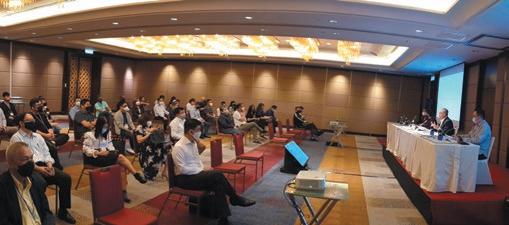
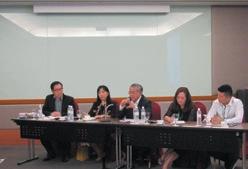
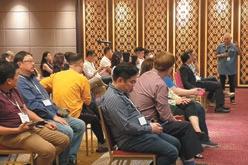
The area of managing shopping malls is a vital factor in bridging the gap between the physical development of a building and building operations. The levels of expectations by the owners, tenants, shoppers and public are high. The members of this industry segment have a vital responsibility in maintaining this role with utmost integrity.
PPK Malaysia serves to be generous with its networking among the members of the industry, It is through the conscious efforts to be constantly in contact with growing number of entries into this profession as well as affiliated industries that will maintain the vital link to enhance the influence of the Association. Cross border alliances and the growing international links will be able to create better opportunities as well as obtaining the competitive edge.
Efficient exchange of trade data, ideas, information and experience among the members enhances management skills. Trends are spotted and could be translated into beneficial propositions.
The bridging role very often requires a centralized and representative entity for the profession to be able to function effectively and efficiently. Presence must be kept visible at various levels of Government agencies, professional bodies, and affiliated industries. Amongst others, PPK Malaysia is affiliated to the several government agencies, professional bodies and networking associations in related industries, both within the country and internationally.
National, regional and international study trips are the staple activities as well as discussions, forums, seminars. Any new development in terms of management techniques or technological breakthroughs is immediately re-channeled by way of specialist workshops. These activities are held with Government agencies, statutory bodies, professional bodies, or similar international industry groupings. Beyond these activities, PPK Malaysia has offered Certification Courses in Shopping Mall Management since 2002 to provide formal academic courses in the area of shopping mall management covering all the function components and collaborates with institutions of learning. This is to ensure that the flow of expert human resource into the industry will continue. PPK Malaysia’s membership structure is well represented by the cross section of professionals in the building management industry. With a growing list of members in both individual as well as corporate membership, PPK Malaysia has become the premier association for the profession. Membership comprises of Ordinary (Individuals / Corporations), Associate and Affiliate (Individuals / Corporations).
To continue representing and developing the interests of the shopping mall management community. This will create boundless opportunities and benefits not just for members, but also the retailers and the public in general.
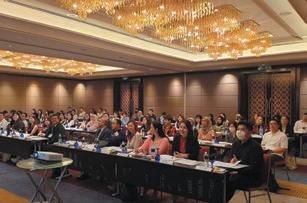
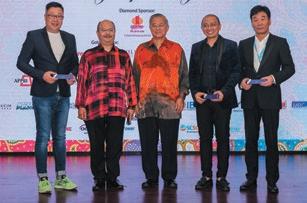
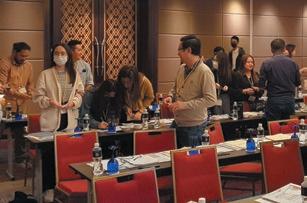
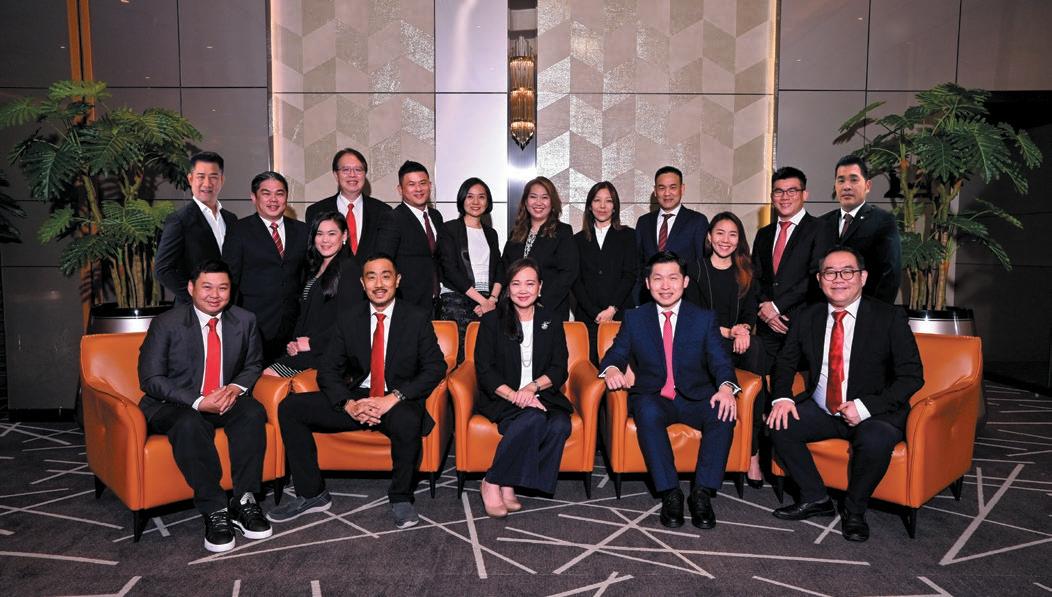
PRESIDENT
Phang Sau Lian
Sunway Malls
VICE PRESIDENTS
William Tang
Mall Of Malaysia
Ir YL Lum
PropLead
S ECRETa Ry
Tan Joon Kai
Damansara REIT Managers
aSSISTa NT S ECRETa Ry
Alicia Yuen
Capitaland Retail Malaysia
T RE a S u RER
Joseph Yeoh
YTL Land and Development
aSSISTa NT T RE a S u RER
Michael Poh
Sunway Malls
Comm ITTEE mE mb ERS
Vincent Chong
KK Lim Mesamall
Chai Ai Ping
1 Utama Shopping Centre
Andrew Teoh
Pavilion Bukit Jalil
Lee Beng Beng
AEON Co.(M)
Darren Hee
Capitaland Retail Malaysia
Nikki Lee
AEON Malls
Aw Ik Qian
Ikano Centres
Chris Chong
IOI Malls
Peter Chan
Capitaland Investment (Malaysia) Sou
Farrer Tan
Paradigm Mall Johor Bahru S a R a W a K
Datin Christine Ling
The Spring Shopping Mall S abah
David Lau
City Mall
From the first shopping mall 50 years ago to navigating multiple economic crises, Phang Sau Lian, the newly elected president of Persatuan Pengurusan Kompleks Malaysia (PPK), shares insights on how the sector continues to thrive and embrace new trends and technological advancements.
Taking over the presidency office from the iconic industry leader Tan Sri Teo Chiang Kok, who left a strong foundation and a remarkable legacy, the newly elected president Phang Sau Lian has significant shoes to fill but a clear path to follow.
“He stands out for his exceptional leadership during the Covid-19 pandemic, guiding the shopping mall industry through economic challenges, regulatory hurdles, and uniting practitioners against formidable adversity,” says a grateful Phang.
“We promise to try our utmost to follow in his footsteps.”
Phang, who has served as Vice President 1 since 2018, also notes that the PPKM has had notable industry leaders since its establishment in 1984.
“They offered their invaluable and priceless experience to help shape the association and the country’s shopping mall
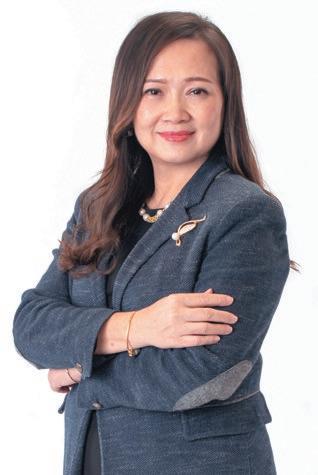
landscape to what it is today,” she says.
Six years after joining the association from 2010 onwards, she was entrusted with various committee positions with her capability and leadership.
Looking ahead, Phang is well aware that the path of recovery for malls since emerging from the pandemic is not a walk in the park.
“It is a path full of bumps and diversions, but we must continue to grow and stay agile,” says Phang, who is currently the Sr General Manager of Sunway Malls.
“Despite a significant recovery in footfall, with some malls even surpassing prepandemic records, others are still on their journey to full recovery.
While still grappling with the pandemic’s after-effects, Phang says, the industry must also keep up with the ever-changing market trends and rapidly advancing technological changes.
“The current direction for PPKM places renewed emphasis on shopping tourism, digital transformation, enhanced industry networking, and continuous learning, and we must keep pace with it,” Phang adds.
Acknowledging that shopping tourism is a significant component of tourists’ expenditure and limited domestic market size, Phang says it is vital for shopping malls to leverage on
shopping tourism to complement domestic spending in their malls.
“Our malls are renowned for their festive ambience, cultural activities, unique food and entertainment, and these elements are essential to enhance the overall shopping experience,” she adds.
In an effort to position the country’s shopping malls at the forefront of global tourism attractions, Phang pledges to lead PPKM in collaborating with Tourism Malaysia to promote experiential shopping and festive tourism.
“Embracing digital technologies is crucial for our malls industry too,” she notes.
To this end, she says, PPKM will continue to invite more digital specialists to introduce innovative technologies and digital solutions that enhance customer experiences and streamline operations.
“We will work closely to shape the future of Malaysia’s shopping malls industry, to contribute even more to the nation’s economic growth,” she adds.
PPKM’s journey began 40 years ago with humble lunch meetings among pioneering shopping mall managers who saw the need to compare notes, share problems, and learn from each other’s experiences.
“At that time, there were no formal educational courses specifically focused on shopping mall management—a gap that, unfortunately, still exists today,” Phang says.
However, over the years, the association has taken its own initiatives to address this void by initiating in-house mall management training courses.
“Hence, education and training together with professionalism, networking, industry infosharing, and representation, remain at the core of our mission,” she says.
This, she says, will see the association expand its inhouse training programmes and collaborate with educational institutions to develop specialised courses in mall management.
“Our goal is to cultivate a new generation of skilled professionals who can lead the industry forward,” she says.
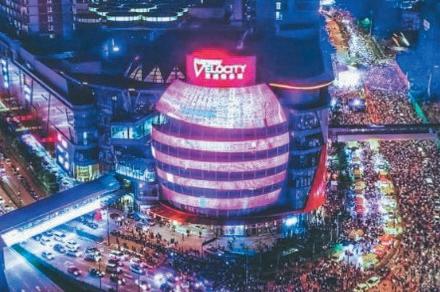
Reflecting on the early years, Phang notes that the first-generation mall managers learned on the job, often through trial and error, gaining their experience the hard way.
“Their hard-earned experience has paved the way for the industry’s growth,” she adds.
Since 2002, the forefathers of mall management have willingly shared their knowledge with newer cohorts of mall practitioners through the association’s Mall Management seminars and courses.
“PPKM has been closely engaged with government authorities all through the years and have organised numerous learning programmes for members to broaden their perspectives and learn the world’s best practices,” Phang says.
Under her leadership, the association will continue to organise events, seminars, conferences, study trips, training programmes and other activities.
“To achieve all these, we will need members’ full support and collaboration,” Phang says.
The history of Malaysia’s shopping mall industry is indeed fascinating.
PKKM and the mall industry have navigated through three major economic crises since the opening of Malaysia’s first mall, Ampang Park in Kuala Lumpur, in 1973.
This was soon followed by the emergence of numerous other malls, some of which continue to thrive today.
Despite the 1985 recession and the severe Asian financial crisis of 1997/1998, which delayed the opening of several malls, the industry has shown remarkable resilience.
In 2004, PKKM joined other shopping mall associations from Indonesia, Hong Kong, China, Taiwan and Japan to form the Council of
Asian Shopping Centers (CASC).
The council was established with the principal objectives of improving multilateral relations and networking among shopping malls in the Asian region and hosting regular annual regional conferences.
The global economic crisis of 2008-2009 impacted Malaysia’s trade-dependent economy, leading to another recession. However, the economy and malls rebounded once again.
The Severe Acute Respiratory Syndrome crisis of 2002-2004 and the more recent Covid-19 pandemic from 2020-2022 posed significant challenges.
Yet, the country’s shopping malls adapted to changing shopping patterns and worked diligently to regain normalcy.
While some malls are still navigating recovery, Phang says, the industry has largely remained resilient.
“Successful malls have adapted to economic shifts and many have garnered international acclaim, consistently winning awards,” she shares.
She concludes, “It is indeed my privilege to witness PPKM’s growth and its role as the voice of our malls. As the current President for the next two years, I look forward to working closely with our members to enhance professionalism, achieve optimal performance for our malls, and contribute significantly to our nation’s economy.”
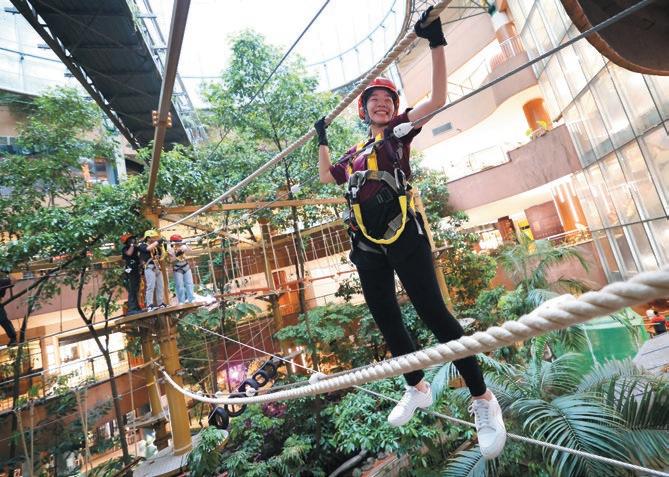
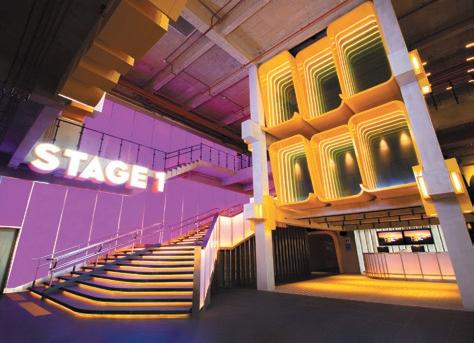
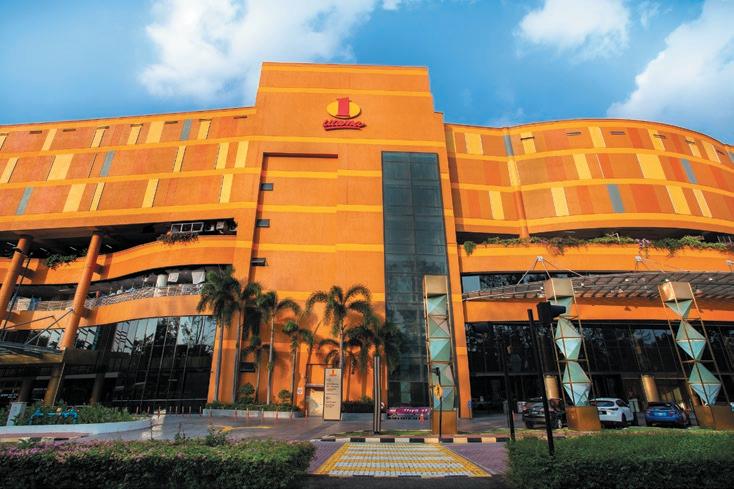

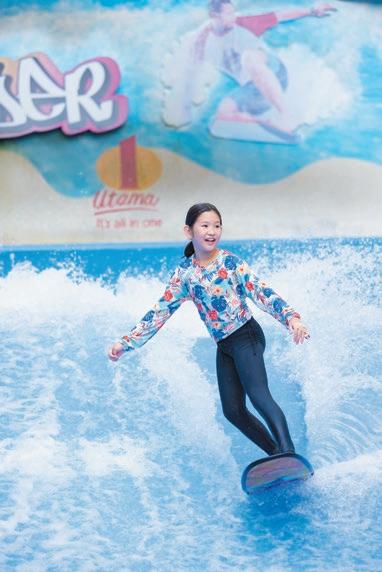

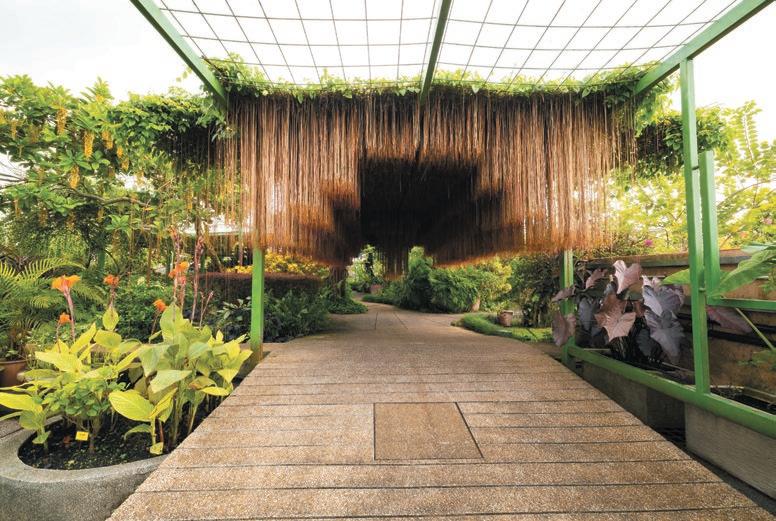


A Tribute to Dato’ Ngeow Voon Yean and Persatuan Pengurusan Kompleks Malaysia (PPK) - Malaysia Shopping Malls Association.
When he founded the shopping malls association in 1984, Dato’ Ngeow Voon Yean had just surpassed the mid-level of his career in the shopping industry, with six years of experience.
The freshly graduated young Dato’ Ngeow joined Sungei Wang Plaza as a management trainee in 1978, after completing his Bachelor of Commerce with a major in Business Studies and Economics at the University of Auckland, New Zealand.
This was just a year after the city’s second shopping centre opened its doors, following Ampang Park.
Dato’ Ngeow quickly proved his capabilities, moving up the ranks from Operations Manager to General Manager, demonstrating his dedication and skill in the retail industry.
However, in actual fact, his passion and experience in retail started well before he was even a young adult.
Growing up in what is probably the epicentre of the city’s shopping scene, the bustling
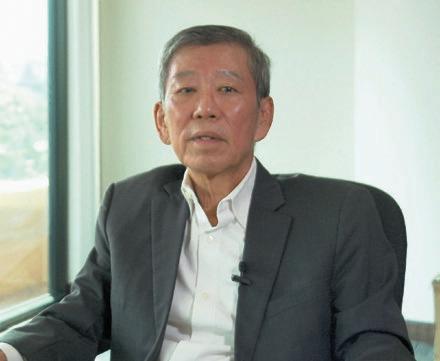
Petaling Street, Dato’ Ngeow was immersed in retail from a young age.
His interest and passion in retail started with his father, who owned a retail and wholesale store at the shopping street located in the heritage zone of Chinatown, that was set to look quite like the setting of a typical American strip mall, flanked by
rows of low-rise shop lots.
“I wa S on E of th E f E w lucky on ES who r E c EI v E d th E much n EE d E d E xpo S ur E to go ov E r SE a S to l E arn about S hopp I ng compl E x manag E m E nt.
The family business, reminiscent of a modern department store, offered a wide array of products, from fabrics and clothing to cosmetics, exposing him to the intricacies of the trade.
“The more I think about it, the more I realise my exposure to retail started quite
early — though it was not in a conscious way at the time,” Dato’ Ngeow said during an interview for PPKM’s publication 10 years ago in conjunction with the association’s 30th anniversary.
Historically known as “Market Square,” Petaling Street, established around the same time as the city, has been active since the mid19th century and has gone through various stages in its cultural evolution.
Dato’ Ngeow remembered witnessing Lion Dance performances that took place along the street during Chinese New Year.
“It was much like the promotions and activities present-day malls have at the concourse areas during the festivities,” he said. “And, there were also cheap sales.”
However, his parents had never wished that Dato’ Ngeow would one day inherit the business or even go into retail himself.
“Back then, the only days off my father had were for Chinese New Year, and he knew retail was a tough life as one had to work seven days a week,” he said, likening it to the 10am to 10pm mall business hours that exist today.
Despite his father’s hope that Dato’ Ngeow would pursue a different path, retail was his calling.
Built on the site of the Shaw Brothers’ BB Plaza—a well-loved amusement centre— and integrated with a five-star hotel, Sungei Wang Plaza was on a fast track to becoming a focal point in Kuala Lumpur’s booming retail scene.
Just a few years into the scene, the shopping centre rose to fame as the place to be for fashion, food, beauty products, and entertainment, offering an Olympic-sized ice
skating rink, bumper cars, a game arcade, a discotheque hall, and Malaysia’s first indoor cinema.
“That was the beginning of integrated shopping areas where hotels, offices and other attractions were built close together, with the mall as the anchor,” recalled Dato’ Ngeow, adding that his tasks included managing a hotel and the ice-skating rink.
However, the journey was fraught with challenges. In what seemed like Kuala Lumpur’s first attempt at industrial modern shopping, the early phases were plagued with issues.
Dato’ Ngeow said the early shopping centres were often under-designed, leading to issues like inadequate ventilation in car parks and subpar customer facilities.
“There was no proper ventilation at the car park causing our shoppers to feel faint while queuing to get out into Jalan Sultan Ismail, and there were also ineffective fire escapes,” he said.
“The press gave us bad reports, labelling our mall as a deathtrap to shoppers.”
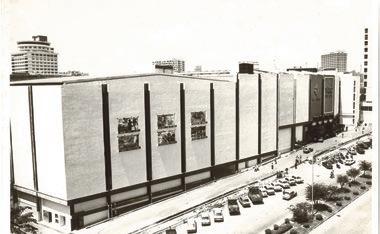
a colourful challenge for the management.
“Back then, the shop lot owners just wanted to collect their rent, which turned out that the mall had too many salons and shoe shops,” he said.
The hotch-potch collection of everything gave the mall’s management a realisation that a market force was creating itself which gave birth to Sungei Wang’s legendary tagline “All Kinds of Everything!”.
“The mall was shaping into a ‘cluster concept’ shopping mall, offering more depth of goods for customers to have more choices,” he added.
This period of trial and error led Dato’ Ngeow to envision a more professional approach to mall management.
“Back then, mall management staff had no formal training, unlike those in hotel or property management who had opportunities to have an estate management programme or obtain a hospitality diploma or degree at a university,” he explained.
“It was time to stop the public’s perception of mall management as a jaga-kereta type of service, and to raise the self-esteem of the industry with an association,” said a determined Dato’ Ngeow.
The shopping malls association was officially formed in 1984, with a committee made up of members from various backgrounds.
“With more affluence, the credibility of the industry can be raised and we can attract more qualified people to join us,” he said.
The association received full national status three years later, and by 1990, it had recorded 200 malls across the country.
The visionary l eader As shopping now ranks as Malaysia’s favourite pastime, the founding father of PPKM must be proud of the strides the retail industry has made.
Mall management faced hurdles with crime, vandalism and an unbalanced tenant mix but ironically, Dato’ Ngeow said these challenges became the catalyst for innovation.
With no proper governance over the shop lots, the mall’s tenant mix provided
Dato’ Ngeow was one of the few lucky ones who received the much-needed exposure to go overseas to learn about shopping complex management and sit for the International Council of Shopping Centers (ICSC) examinations in the United States of America.
Even though he did not pass all the papers due to a lack of knowledge of American standards and practices, Dato’ Ngeow came back with renewed visions.
“I realised it’s not just about supervising tenants and owners; mall management is a combination of skills in entrepreneurship, marketing and communications, and technical and financial abilities.”
“A well-planned and managed mall is what shoppers of today look forward to. It has been truly satisfying to witness the building of communities and to find ways to satisfy their ever-changing needs and wants,” Dato’ Ngeow concluded.
His dedication and vision have left an indelible mark on the Malaysian shopping mall industry, ensuring its growth and success for years to come.
Recognising these contributions, the association awarded Dato’ Ngeow with the Distinguished Lifetime Contribution to Management of Shopping Malls Award in 2005.
Dato’ Ngeow served as president for three years until 1987, but he continues to serve as Advisor to PPKM to this day.
From humble beginnings to shaping Malaysia’s mall management landscape, PPKM’s past-President Richard Chan’s pioneering efforts in mall management continues to be a driving force in the industry.
Aveteran in the shopping mall management industry, Richard Chan has seen all there is to see about mall management over the last four decades. Armed with his experience, foresight and determination, Richard laid the first stone in the establishment of Persatuan Pengurusan Kompleks Malaysia (or PPKM) in 1980. He talks about early lunch meetings leading to its establishment. As the manager of Ampang Park, the first mall in Malaysia, and with only a few malls in Kuala Lumpur, Richard gathered all the mall managers to discuss the various problems faced. From just 10 people attending the meeting, the group expanded to more than 20 members. As time passed and 1982 rolled in, the group began realising the idea of formalising their representation. With the determination and perseverance of PPKM’s founder President, Dato’ Ngeow Voon Yean, the group managed to form the association with its core members in 1984, and Persatuan Pengurusan Pusat Beli-Belah Kuala Lumpur dan Selangor was officially registered.
Despite the synergy and cooperation of all members, it was not an easy journey. Richard explains, “We had to change the name three
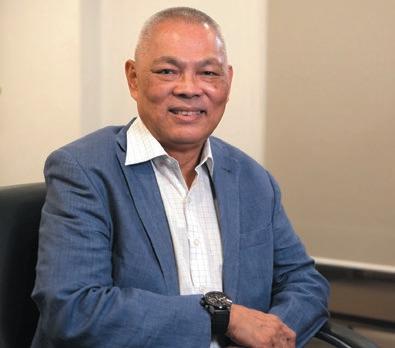
times.” He elaborated that the group wanted to register the association as a national entity. However, the Registrar of Societies advised that since the members were only from Kuala Lumpur and Selangor, they had to register the association as Persatuan Pengurusan Pusat Beli-Belah Kuala Lumpur dan Selangor which was not the ideal name. The proponents went
“t h E r E ’ S no proud E r mom E nt than b EI ng th E found I ng m E mb E r of ppkm and b EI ng abl E to SE rv E a S p r ESI d E nt for 19 y E ar S . It’ S truly a S tar I n my l I f E .”
in search of members from seven other states, which was a minimum requirement to have a national name. They finally achieved this in 1987 and the association officially changed name to that of a national body as Persatuan Pengurusan Kompleks Malaysia (PPK).
Forming a united front and establishing a national presence He reminisces, “We established the first secretariat office which only comprised typewriters, tables, chairs and a metal cabinet.” With only 9 to 12 members in the association, resources were tight and members felt the pressure in having to shoulder various roles. “We were travelling salesmen, and our own committee members sometimes avoided meetings for fear of being expected to make cash contributions on the spot (!)” he shared.
In 1987, Richard became President of PPKM and set out to find a more permanent office space for the association. Imbi Plaza offered the young association a space which was just a previous storeroom on the second floor of the car park, measuring around 100 square feet. The only things that could fit into the office was a conference table and a desk for our only staff member and considering the economic downturn, it was an ideal space.
Nevertheless, the association commenced to work with the Tourism Ministry to organise many large-scale events such as Malaysia Fest, which was later known as Pesta Malaysia, as well as other events. In 1998, PPKM went on to establish “Malaysia Truly Asia” in collaboration with Tourism Malaysia, bringing in new market players from the Middle East, India, China, Japan, Europe and Australia, among others.
A permanent footprint and educational initiatives
PPKM spent 14 years in the tiny office space and finally found the financial resources to upgrade to a bigger space in Damansara Intan in Petaling Jaya, where it has remained to date. Aside from setting up PPKM’s permanent office during his tenure, Richard’s other moment of pride was the introduction of educational courses in shopping mall management. As the longest serving president of the association for 19 years, Richard had invested time, effort and resources into its smooth running with the help of his committee and other members.
“We introduced the Certification Courses for Shopping Mall Management with modules in Marketing & Leasing, Operations & Management, and Administration,” he beams.
Richard explained that during this time, nobody wanted to take on the responsibility of managing the educational
courses, so he took it upon himself and even made personal investments to make the educational drive a success.
With outstanding outcomes at the fiveyear mark, he shares that the success of the courses was in the content itself where
mall management module, and continues to be a key feature for the association.
“We even initiated study tours to many countries such as Australia and other Asian countries, to enhance our knowledge and experience,” he points out.
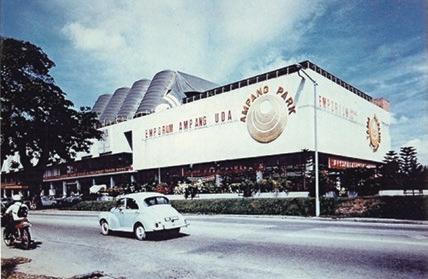
experienced practitioners shared their invaluable knowledge. During those times, there were no part-time or night classes offering mall management courses so the educational modules by PPKM were a godsend for junior mall managers to help them improve their capabilities and credibility.
Today, Richard’s hard work has been handed down to PPKM’s management as a formal
To-date, PPKM has continued to work closely with Tourism Malaysia, other industry players and government agencies.
“We also helped address the reduced tax items for tourists for high-end goods such as luxury watches and other items,” Richard pointed out.
Richard looks back on the journey and says, “We were the first in Asia to establish an association and we even helped Singapore form their association.”
In 2018, through PPKM’s decades of effort and hard work, the Board of Valuers, Appraisers, Estate Agents and Property Managers (BOVAEP) finally recognised experienced PPKM members who had achieved the required standards and they were given the certification as Registered Property Managers.
Besides the many contributions made over the years towards PPKM, Richard also served 17 years as a volunteer reserve under Polis DiRaja Malaysia (PDRM). He worked his way from being a Constable to Chief Inspector and encourages youngsters today to volunteer to serve their country.
He says, “There’s no prouder moment than being the founding member of PPKM and being able to serve as President for 19 years. It’s truly a star in my life.” For his dedication, PPKM presented him the Distinguished Lifetime Contribution to Management of Shopping Malls Award in 2005.
At present, Richard runs his own consultancy, RCMC Sdn Bhd, and enjoys his time with his wife, children and dogs.
Richard is also a founder member of the Council of Asian Shopping Centers (CASC) and serves as a committee member for the Building Management Association Malaysia (BMAM) as well as being on the PPKM’s Board of Advisors to date.
Dato’ Joyce Yap, Chief Executive Officer (Retail) of Pavilion Kuala Lumpur shares her journey and insights into transforming Malaysia’s shopping malls into global retail powerhouses.
Shopping mall management in Malaysia is a dynamic and multifaceted industry that plays a crucial role in the country’s retail and economic landscape. Dato’ Joyce Yap is no stranger to the business but a much experienced industry stalwart with a strong focus in creating value for customers and tenants while driving a robust shopping mall management business. She explains that today, shopping malls offer tremendous value within the economic landscape, and is a powerhouse of the retail industry.
40 years of industry experience
Dato’ Joyce is one of the pioneers of PPK Malaysia (PPKM), the first female member as well as the first female President in the association, serving from 2006 to 2010.
In speaking about her journey, Dato’ Joyce shares, “I was instrumental in elevating Malaysia’s retail industry to a global level. Notably, I played a part in introducing many international brands and unique concepts to Malaysia through creative leasing, marketing, and strategic plans to elevate mall management standards in line with
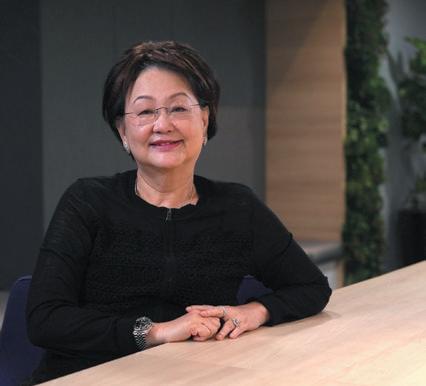
the international practices that were not yet applicable locally then.”
She recalls that during her presidency in PPKM, Malaysia was not yet among the top destinations for shopping tourism. The
“b ack th E n, mall S w E r E not manag E d to m EE t global S tandard S , wh I l E t E nant off E r I ng S w E r E a I m E d at th E ma SS mark E t I n S t E ad of E xpat r I at E S or tour IS t S .”
country had yet to deliver the infrastructure and quality to attract international retailers and tourists, accompanied by less than satisfactory service levels. “We had limited international connectivity and infrastructure, which affected tourist volume. The local population’s disposable income was also lower, which reduced the demand for international stores,” reminisced Dato’ Joyce.
“Back then, malls were not managed to meet global standards, while tenant offerings were aimed at the mass market instead of expatriates or tourists,” she continued.
As a leading lady in the shopping mall industry, Dato’ Joyce envisioned to ramp up the dynamics of shopping malls in Malaysia, bringing them up to par with international standards. Her vision was realised as with time, Malaysian malls successfully brought major international brands to Malaysia, such as Hermes, Bulgari, Chanel, Christian Dior, and Cartier to name a few.
“During my career in the mall and retail industry, I have witnessed drastic changes in retail trends. These shifts are influenced not only by the passage of time but also by generational behaviours shaping shopping patterns,” Dato’ Joyce points out.
Considering the unique needs and wants of each demographic group, shopping has evolved into a bolster for self-esteem, a reflection of status, a means of social bonding, and even a form of therapy. “It is no longer viewed as a chore but as a social experience. As retailers, it is fascinating to explore how we can connect with these audiences and leverage social media trends to draw people into our stores,” explains Dato’ Joyce.
Since she stepped into the business 40 years ago, Dato’ Joyce says that the shopping mall landscape has experienced radical transformation. “The industry has evolved from a traditional to a more modernized and digitised sector. Humans are constantly changing, and to fulfil their demands and win their hearts, retailers need to prioritise understanding shoppers’ behaviour and trends,” she says.
As malls evolved, so did shopping mall management dynamics. From basic problems such as faulty lighting and non-functional toilets, more complex issues now arise. However, on the bright side, she quips that shopping malls have created employment at an unbelievable rate. Additionally, while malls 30 years ago used to be owned by contractors or developers who did not manage the property, now the ownership has become REITs (Real Estate Investment Trusts) which encompass various factors such as public funds, accountability and supervision by the government.
In her leadership of PPKM, Dato’ Joyce has been instrumental in transforming the
landscape of shopping mall management in Malaysia. Guided by PPKM’s vision of superior efficiency in mall management, Dato’ Joyce and her team at PPKM were able to achieve the association’s goals in driving a robust shopping mall industry in the country.
Talking about her greatest achievement, Dato’ Joyce beams, “Under the leadership of Tan Sri Desmond Lim and Puan Sri Cindy Lim, the Pavilion brand as a whole, across all our malls is my greatest achievement to date. Over the years, we have successfully persuaded several global brands to consider Malaysia as a top destination for showcasing their products, marking a significant milestone.”
“I am proud to say that Pavilion KL has set a benchmark for retail excellence in Malaysia, and we are proud to have introduced several firstin-Malaysia brands while housing numerous flagship stores in our mall,” she adds.
However, as COVID-19 hit the world, Dato’ Joyce says that it was undoubtedly the most difficult for the retail industry and the most testing period of her career.
“Having experienced three other major crises over my 40-year career in retail — the 1987 stock market crash, the 1997 Asian financial crisis, and the 2007 global financial crisis — I can confidently say this — historically, we tend to experience a recession every 10 years or so, affecting specific regions, but the COVID-19 pandemic caused the
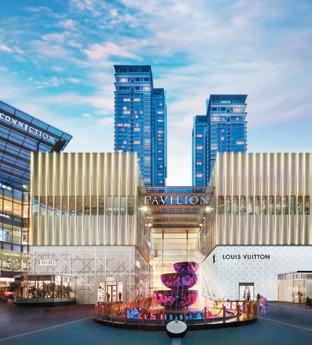
worst global economic crisis since the Great Depression in the 1930s,” she shares.
“Despite this, we managed to overcome the challenges by pivoting our business model, creating new business opportunities, and evolving our approach. As a mall operator we implemented new leasing tactics and collaborated closely with tenants as partners to navigate through the turbulent period together,” says Dato’ Joyce proudly.
She advises that the key lessons she has learned over the years and as president of PPKM is the importance of daring to be different,
staying open-minded, learning from the best, and recognising that teamwork makes the dream work. These principles are essential for driving innovation and success in the retail industry.
She advises, “No one is perfect. Different situations call for different strategies, and each problem needs a unique approach. The key is staying adaptable, learning from our experiences, and always striving to improve.”
She points out as shopping malls become an important part of modern lifestyles, there is a growing demand for premium, high-quality, limited-edition merchandise. Dato’ Joyce explains that the luxury retail market is expected to grow in Malaysia.
“At Pavilion Malls, we have seen positive growth and demand post-pandemic, and hope to continue growing this sector,” she adds.
As Malaysia continues to see the growth of international tourists, the shopping mall industry has excellent potential, however, Dato’ Joyce’s advice to local entrepreneurs is to thoroughly evaluate various factors and go back to the SWOT analysis for a better grasp of the business.
Dato’ Joyce has been on the Board of Advisors of PPKM since 2010 to date and for her dedication to shopping malls, received PPKM’s Distinguished Lifetime Contribution to Management of Shopping Malls Award in 2008.
Sunway Malls is not only one of the largest mall operators in the country, it also has the distinction of being a leader in the industry, constantly innovating, redefining experiences and setting new standards for excellence.
HC Chan was President of PPKM from 2010 to 2014 and within the shopping industry, he needs no introduction, being the Chief Executive Officer of Sunway Malls and an industry veteran of 40 years.
At Sunway Malls, HC Chan oversees the portfolio of the group’s seven malls. Chan’s shopping mall career began in Sungei Wang Plaza in 1983. After more than a decade, he moved to the then Berjaya Starcity, now Berjaya Times Square, as its General Manager. In 1999 he moved to Sunway Malls.
While his first two assignments solidified his love for shopping malls and taught him the intricacies of this ever-challenging mall landscape, his third assignment saw him expanding his wings as a leader and innovator of the industry.
Chan was instrumental in updating and introducing new elements to mall retail formats such as al-fresco dining and themed precincts. He quickly recognised the growing trends in the F&B and leisure components in the mall industry as demand for lifestyle destinations grew. From this insight, he rebranded Sunway Malls from Sunway Shopping Malls to reflect the changing landscape.
What inspires him? “Consumers”, Chan was quick to reply. “Today’s consumer expectations are marked by three significant demand traits – higher standards, choice of variety and robustness of delivery. They are spoilt for choice and gravitate towards brands that can engage with them in a creative and meaningful manner”.
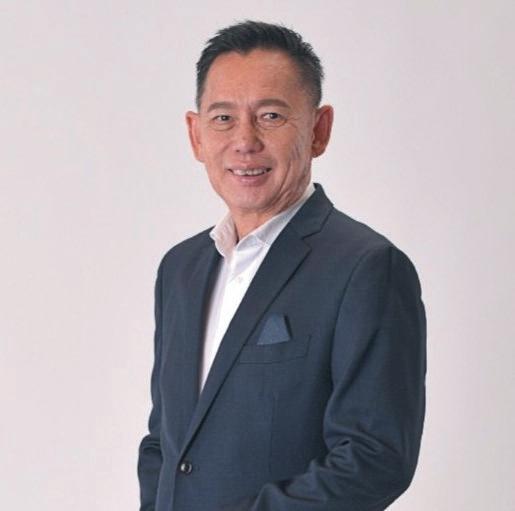
For instance, he said that because Sunway Pyramid is a themed mall, it faces the challenge of remaining constantly relevant for consumers. To achieve this, the mall must look beyond just traditional tactical marketing campaigns and focus on delivering creative and experiential asset enhancement projects. These projects are periodically conducted to extend the mall’s relevancy through tenant mix diversification, enhanced quality retail space and space optimization.
Su S ta I nab I l I ty IS not th E r ES pon SI b I l I ty of on E but all. b y mak I ng th E r I ght cho I c ES I n our da I ly l I v ES , w E ar E mak I ng th E r I ght d E c ISI on for a S u S ta I nabl E futur E , wE E nv ISI on a futur E for Sunway m all S that IS not only gr EE n but al S o a mod E l of S mart
S u S ta I nabl E d E v E lopm E nt S o that th E world IS a b E tt E r plac E for futur E g E n E rat I on S .”
Chan said shoppers today visit malls to re-energise themselves through leisure and entertainment. His observations on the nonshopping trend at malls have helped Sunway Malls develop the non-shopping offerings, which have expanded greatly compared to the shopping offerings
In the past two decades, leisure, entertainment and F&B may have constituted 10-20% of nett lettable area (NLA) in a mall.
Today, that figure can go between 40%- 50% range,” he said.
For Sunway, this has translated to the opening of more F&B outlets as demand from out-of-home dining rises. Today, F&B outlets alone make up more than 30% of its malls’ NLA compared to the early days.
Chan was also quick to put the Sunway malls on the digital track. The mall has leveraged on advanced technologies to deliver a seamless mall experience to its customers and this is done by ensuring that its malls are big data focused, analytics- and sustainability driven as well as mobile-first.
The buzzword today is sustainability. Shopping malls are major carbon consumers and generally score poorly on sustainability metrics. However, Sunway Malls are advancing in this area with its mission to protect the earth and build a sustainable future.
Under the leadership of Chan, the malls have embarked on six sustainability initiatives, namely green leasing, sustainable operations, green procurements, waste management, community building and urban farming. Chan said Sunway makes it a point to communicate its commitment to sustainability to all stakeholders and involve them in its journey towards building a greener future for all.
Through a five-way partnership, Sunway Malls is also the first in the industry to establish an alliance network that solely focuses on sustainability in the retail industry. This collective measure is to collectively on-board retailers too in the sustainability journey.
“Sustainability is not the responsibility of one but all,” he said, stressing that sustainability
is practiced across all its retailers, stakeholders and among its shoppers as well.
“By making the right choices in our daily lives, we are making the right decision for a sustainable future,” he said.
“We envision a future for Sunway Malls that is not only green but also a model of smart sustainable development so that the world is a better place for future generations.”
Looking back, Chan said the industry is in a good place today thanks to the dedication and effort of the members of PPKM who have worked tirelessly the last 40 years.
“PPK Malaysia’s 40-year journey is nothing short of amazing progress, selfless dedication and steadfast desire to advance the Malaysia’s mall industry. Certainly the journey itself has been both arduous and rewarding as the industry underwent significant transformation,’’ he said.
Chan served a two-term presidency in
advocating the industry’s interest at both international and national levels and he is currently an Advisor to the association to date. Chan also serves as the Advisor of the Council of Asian Shopping Centres and sits on the Industry Advisory Board of Sunway University Business School.
The association, being the sole advocacy voice for the industry, holds a great responsibility, in advancing the interests, standards and professionalism of the Malaysia’s mall industry; and ultimately the reputation and standing of the industry at the world stage. At every challenge the industry faced, for every major issue confronting it over these 40 years, PPKM was at the forefront – leading and supporting the industry’s interests.
“The industry made great strides on many fronts. In terms of numbers, there are more than 700 malls and retail centres today since the first mall, Ampang Park Shopping Centre, was built in 1973. Malls have clearly emerged as one of the heroes of the Malaysian economy in recent
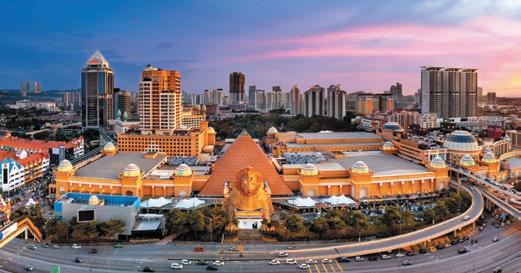
times due to its sizeable numbers and economic contributions.”
Other advancement points included retail development concepts which saw numerous retail landmarks with iconic architecture emerging over the course of the last 40 years. Today, malls in Malaysia are recognised both globally and locally, having clinched awards and recognition from amongst others, FIABCI International and International Council of Shopping Centers (ICSC) both for retail development concepts and innovative marketplace programmes.
Chan is all praise for the efforts of PPK Malaysia in fostering close networking and collaboration among its members as well as with retailer associations. This has resulted in better sharing, understanding and coordinating efforts.
Through dialogues with other national mall associations in China, Hong Kong, Taiwan, Indonesia and Japan via the Council of Asian Shopping Centres (CASC), networking has expanded manifold across the region.
“The work of the association is ongoing and dynamic. These efforts will be undertaken by the next generation of industry professionals who will be confronted by a world that is ever changing. Hence, networking and sharing across regions will be pivotal in manoeuvring and future proof these landscape.”
But what is certain is that malls will continue to play a pivotal role in the lives of the community as both a market place as well as a social place.
“I believe PPK Malaysia will continue to lead with confidence and steadfastness. To many more 40 years and beyond!”
Tan Sri Datuk Eddy Chen served as the fifth president from 2014 to 2018 and this period saw the industry experiencing a significant trend, with industry players shifting towards providing an experiential value in shopping malls.
“We found malls trending towards defining its growth via added experiential values,” he says, acknowledging the need for malls to create memorable experiences for their patrons.
“The years to come promise challenging but exciting times for the industry but we are confident that Malaysian malls will continue to grow,” he adds.
Reflecting on his presidency, Tan Sri Eddy expresses: “I am certainly very honoured and proud to be elected as the president and served for a tenure of four years.”
Even though he had no prior experience in holding positions within the association, Tan Sri Eddy was quick to acclimatise to the challenges and responsibilities of running and owning malls.
“We had to swiftly grasp and address the issues,” he says, “Malls, big or small, have very similar features and challenges to deal with.”
Tan Sri Eddy’s contributions to the association were multifaceted. He continued his predecessors’ directions in the areas of training and education.
“We were able to engage with our counterparts in other parts of the region,
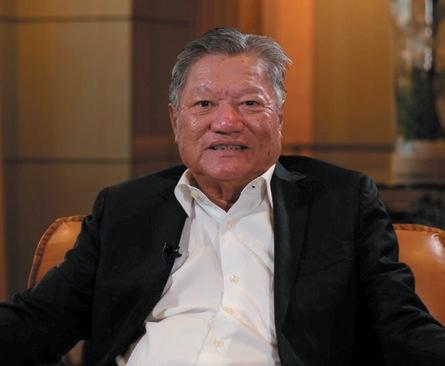
especially Asia Pacific, to share related experiences and best practices,” Tan Sri Eddy says.
This regional collaboration was instrumental in elevating the standards of Malaysia’s shopping malls, he adds.
On the local front, PPKM worked closely with fraternal organisations, amongst others,
“t h E y E ar S to com E prom ISE chall E ng I ng but E xc I t I ng t I m ES for th E I ndu S try but w E ar E conf I d E nt that m alay SI an mall S w I ll cont I nu E to grow. wE w E r E abl E to E ngag E w I th our count E rpart S I n oth E r part S of th E r E g I on, ES p E c I ally aSI a p ac I f I c, to S har E r E lat E d E xp E r IE nc ES and b ES t pract I c ES .”
like Real Estate and Housing Developers’ Association (REHDA), Malaysia Retailers Association (MRA), Malaysia Retail Chain Association (MRCA), Building Management Association of Malaysia (BMAM), Pertubuhan Akitek Malaysia (PAM), Institution of Engineers Malaysia (IEM), Malaysian Association of Hotels (MAH), Malaysian Association of Hotel Owners (MAHO) and Malaysia Budget and Business Hotel Association (MyBHA).
“These collaborations were essential in tackling common issues related to local government regulations, licensing, and even matters such as music royalties,” he explains.
During his leadership, the association lobbied against local councils that sought to impose permit fees on billboards.
“We found this totally unreasonable and were able to make representations to have this fee removed and/or suspended,” Tan Sri Eddy recalls.
Looking back, he fondly remembers working with a passionate team of young “mallers” who have continued the legacy of excellence.
“It has been a very pleasant experience working with an enthusiastic team who have since continued the legacy of both me and my predecessors,” he says.
His optimism for the future of Malaysia’s shopping malls is plain and clear, believing that the sector will continue to innovate, be creative, and eventually emerge as regional leaders.
Tan Sri Eddy’s leadership at PPKM was deeply rooted in his extensive experience and successful track record in the property development and construction industries.
He serves as the Group Managing Director of MKH Berhad (MKH), where he oversees the strategic direction and daily operations of the group.
Under his stewardship, he transformed MKH from a modest property developer in Kajang, Selangor, into one of Malaysia’s top 12 property players, supported by successful diversification.
Throughout his 42-year career, he has held significant roles in the property development and construction sectors.
Tan Sri Eddy continues to serve the industry in various influential roles including as Patron of REHDA Malaysia, a Trustee of the REHDA Institute, and a member of the Board of Advisors for PPKM from 2018 to date.
Other roles include being Chairman of Perbadanan PR1MA Malaysia, President of the Building Management Association of Malaysia (BMAM), Chairman of the Construction, Property & Infrastructure Committee in the Association Chinese Chambers of Commerce and Industry of Malaysia (ACCCIM), and Honorary Treasurer of the Malaysia Crime Prevention Foundation (MCPF).
Tan Sri Eddy’s leadership and contributions have not gone unnoticed. His accolades include The Edge Malaysia Outstanding Property CEO Award 2018, the REHDA Personality Award 2013, the CIDB’s Malaysian Construction Industry Excellence Awards (MCIEA) CEO of the Year Award 2015, and being named one of Malaysia’s Top 30 Green Catalysts by GreenTech Malaysia at the Green Tech Awards 2014. These awards reflect his commitment to excellence, sustainability and innovation in the property development and construction industries.
Throughout his career, he has been a staunch advocate for education and
professional development. He contributed his expertise and skill as an industry advisor for the Master of Business Administration (Building Management) Programme at Universiti Tunku Abdul Rahman (UTAR), a role he held for seven years until 2022.
He has also been a committee member of the Construction Industry Development Board’s (CIDB) Pemandu Pembangunan Pelan Induk Industri Pembinaan II and displayed his dedication in improving the regulatory environment through his work with PEMUDAH Special Task Force on Kuala Lumpur City Hall and the National Economic Consultative Council.
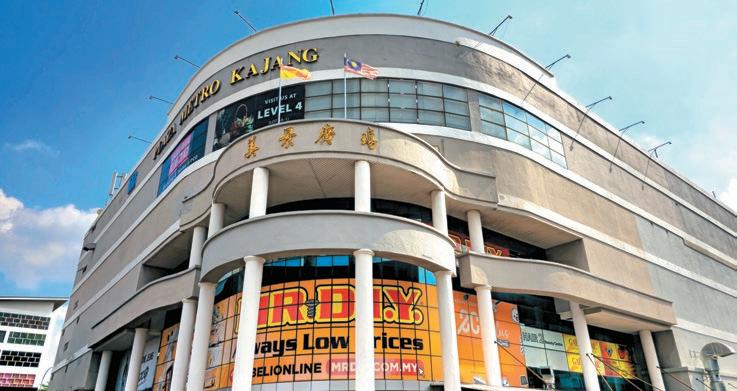
Tan Sri Teo Chiang Kok’s eminent presidency at PPK Malaysia was defined by unprecedented challenges and left a lasting impression on Malaysia’s shopping mall landscape while setting a high standard for future leaders.
Of all the leaders PPKM has had, Tan Sri Teo Chiang Kok, its Immediate Past President, probably had the most tumultuous tenure.
Holding office as the association’s sixth president from 2018 to 2024, his term coincided with the global Covid-19 pandemic, which brought almost everything, including the shopping mall and retail industry, to a standstill.
Despite the challenges, Tan Sri Teo pulled through and emerged as a pivotal figure in the shopping mall industry, guiding it through one of the most challenging periods in recent history.
Now, as the association’s Advisor, the Executive Chairman of the 1 Utama City Group reflects on his six-year experience helming the organisation.
“A good portion of my term was during the Covid-19 pandemic,” recalls Tan Sri Teo, who received PPKM’s Distinguished Lifetime Contribution to Management of Shopping Malls Award in 2008.
“We had to tackle many unprecedented challenges from finding common grounds for practical and effective disease control while minimising financial pain on the entire value and supply chain.”
The pandemic brought with it a host of restrictions and operational challenges that no one had imagined and prepared for.
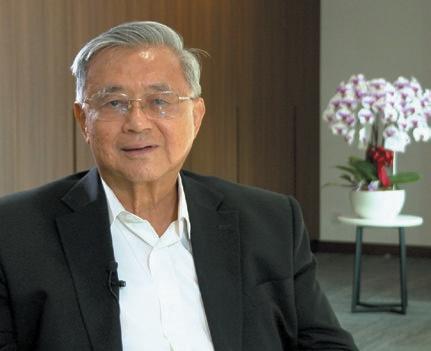
The Movement Control Order (MCO) imposed by the government, as a way to curb the pandemic from spreading, forced shopping malls to close, leading to significant financial strain on mall operators, retailers, and the entire supply chain.
“The subsequent re-starting, recovery and revival, and survival of the retailers, tenants and shopping mall businesses required tremendous effort and sacrifice, financially and physically,” Tan Sri Teo adds.
“
b oth th E author I t IES and I ndu S try play E r S w E r E confront E d w I th S o many d E b I l I tat I ng r ES tr I ct I on S that th E y had to go through many S t EE p l E arn I ng curv ES to adopt and adapt pract I cal comprom ISES toward S damag E control.”
Both the authorities and industry players, Tan Sri Teo says, were confronted with so many debilitating restrictions that they had to go through many steep learning curves to adopt and adapt practical compromises towards damage control.
“It was a very harrowing but good lesson learned,” he says, “We had to quickly learn and adapt along the way amidst the virtual-meeting environment.”
The association quickly adapted to virtual environments,
pulling together committee members to brainstorm and find solutions to the everchanging landscape on a daily basis.
One of the challenges was the misinterpretation of the forecasting modelling of Covid risk which forced the malls to wrongly and prematurely close their operations.
“We were fortunate that we were able to debunk the misinterpretation and were supported by the malls’ wonderful efforts to make the shopping environment safe,” Tan Sri Teo adds.
This included a rigorous health monitoring system, effective infection control, and implementation of hospitalgrade air filtration systems.
These measures, Tan Sri Teo says, were critical in lobbying the authorities to reconsider and withdraw the directive to close malls.
His relentless passion and hard work shone through the pandemic. Under his leadership, the association united the mall and retail sectors into a cohesive front to effectively contest several Standard Operating Procedures (SOPs) that were detrimental to the industry’s survival.
Not only did his effort keep the industry afloat, but it also solidified his reputation as an industry hero leading Malaysia Retailers Association (MRA) to present Tan Sri Teo with a personal award for his Outstanding Leadership during the Pandemic.
The Covid-19 pandemic changed a lot of things, including the landscape of shopping malls, not only in the country but all over the world.
While shopping had slowly become more about experiential leisure than merchandise shopping per se before Covid-19, the pandemic accelerated the adoption of online shopping almost to full swing.
“Shoppers now return to physical malls more for outings with family and friends, for relaxation and rejuvenation, rather than purely for shopping,” Tan Sri Teo says.
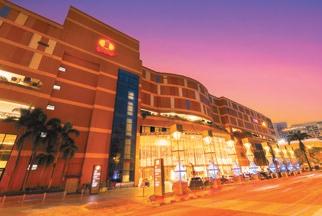
He adds that the global trend towards experiential leisure and participative events has seen malls incorporating more Food and Beverage (F&B) offerings, as well as entertainment, recreation, and leisure facilities.
“We had to respond quickly to this changing patronage,” he notes. Fortunately, this augured well with the malls.
He continues: “Our members responded marvellously to these changing trends with the introduction of many new gastronomic offerings and entertainment for all members of the family and friends.”
The introduction of digitalisation and artificial intelligence (AI) has also played a crucial role in the evolution of malls.
“Digitalisation and AI have enabled malls to mine all the electronic information captured from shoppers to further refine and target the needs and expectations of shoppers,” Tan Sri Teo explains.
This technological advancement, he says, allows malls to better match tenant offerings with shopper preferences, thereby enhancing the overall shopping experience.
Another key area of focus during his presidency was sustainability.
“The green movement era took off significantly when many younger shoppers became more conscious and expected merchants to subscribe to green initiatives,” Tan Sri Teo says.
The mall industry, he adds, responded positively to this shift by embracing sustainable practices and integrating them into their operations.
“It is indeed gratifying to see that our industry has risen to the rapidly changing environment and the antecedent challenges,” he notes.
A staunch advocate for sustainability, Tan Sri Teo successfully spearheaded numerous green initiatives at 1Utama Shopping Centre, one of Malaysia’s largest shopping malls. These initiatives include the Secret Garden at the rooftop, rainwater harvesting, ice and chilled water storage, an indoor rainforest, waste food composting, the
largest rooftop solar panel system and a recycling centre.
Not only do these efforts reduce the mall’s environmental footprint, they also resonate with eco-conscious shoppers, enhancing the mall’s appeal and reputation.
Tan Sri Teo’s experience, navigating the shopping industry through the pandemic and digitalisation, underscored the importance of having dedicated committee members who can serve and sacrifice their time for the betterment of the industry.
“The association was blessed with a team that came through thick and thin during the entire Covid pandemic,” he remarks, highlighting the importance of teamwork and commitment.
However, Tan Sri Teo admits that his tenure was not without regrets.
“The pain and sacrifices endured during the pandemic were inevitable,” he says. His navigation of relationships between the various industry associations including retailers and government bodies was exemplary.
“All the related trade associations worked as a united team in our dialogues with the government to reach practical compromises,” he says.
Looking back, Tan Sri Teo considers his proudest moment as the collective effort and teamwork that helped the industry survive the pandemic.
“It is truly teamwork that got us through the most challenging of times,” he says, expressing gratitude for the support of committee members and the secretariat.
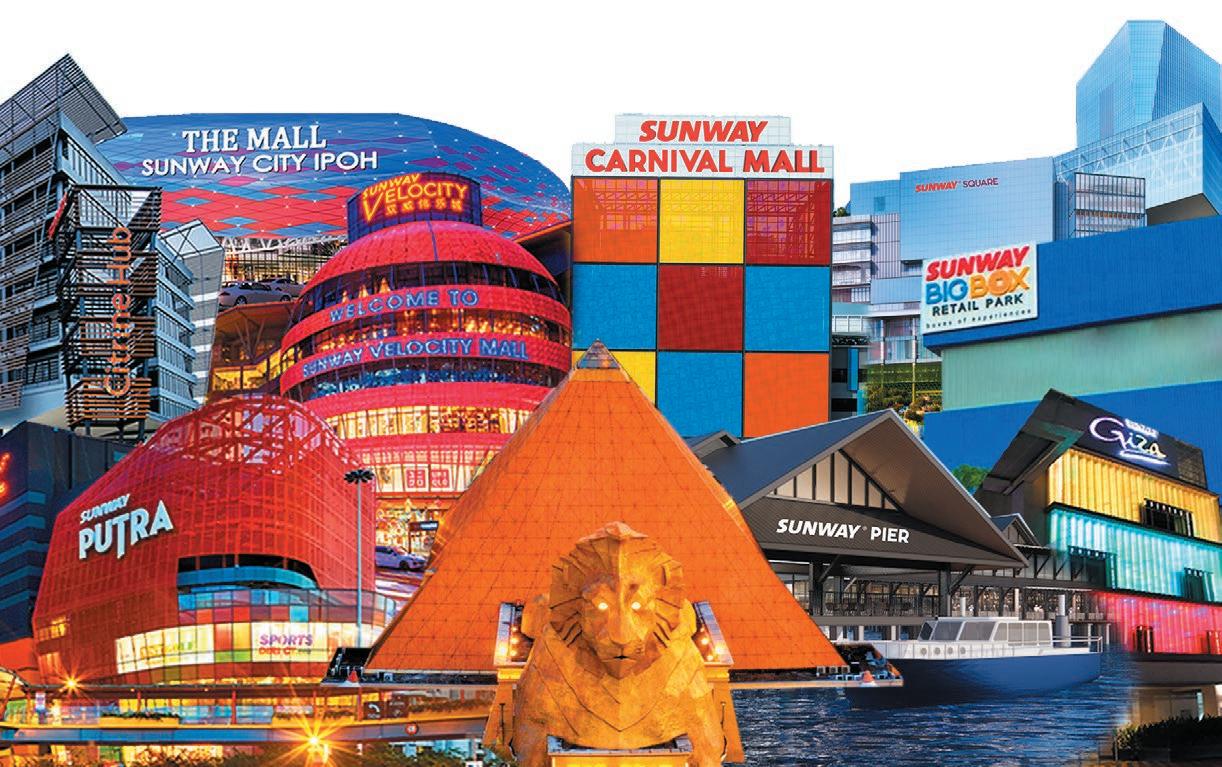

The COUNCIL OF ASIAN SHOPPING CENTERS (CASC) was established in 2004 with the principal objectives of improving multilateral relations and networking of shopping malls in the Asian region.
PPK Malaysia is a founder member of CASC and since its inception, has grown to now include counterpart shopping associations in eight countries to date – Malaysia, Indonesia, Hong Kong, China, Taiwan, Japan, India and Russia with affiliates from Thailand, Philippines and Singapore.
From 2004, member associations have organised conferences annually in their own countries for information sharing and education across the region. These conferences provide a regional platform to discuss matters of common interest as well as for indispensable networking purposes and to foster closer regional ties. Speakers at CASC Conferences include fellow industry experts from the region and the industry information sharing is contributory to future directions for shopping mall management in the region. These annual conferences have also become significant platforms for the development of home-grown ideas and businesses into international brands and for overseas start-ups to venture into our country and vice-versa.
We are pleased to share their Congratulatory Messages on the occasion of our 40th Anniversary.
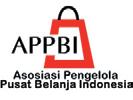
Best wishes to Persatuan Pengurusan Kompleks ( PPK ) Malaysia on the 40th anniversary. Congratulations to all Malaysia Shopping Malls for having such a big association over the years.
PPK Malaysia has always been consistent with high efforts for the success of the Malaysia Shopping Center business industry. PPK Malaysia has an important role in advancing and growing not only the Shopping Center business industry but the retail business industry in Malaysia as well.
PPK Malaysia shows the commitment in developing and advancing the Shopping Center business in the region by playing an active role in the Council of Asian Shopping Centers ( CASC ).
Appreciation to the founders, former committees and committees who have developed PPK Malaysia to become one of the important associations in the trade and economic stakeholders of Malaysia.
Greetings of friendship from Indonesia Shopping Malls to our best friend, Malaysia Shopping Malls.
Kejayaan untuk PPK Malaysia. Kejayaan untuk Malaysia Shopping Malls. Thank you. Terima kasih.
AlPhONZuS wIDJAJA Chairman
Indonesia Shopping Malls Association / Asosiasi Pengelola Pusat Belanja Indonesia ( APPBI )

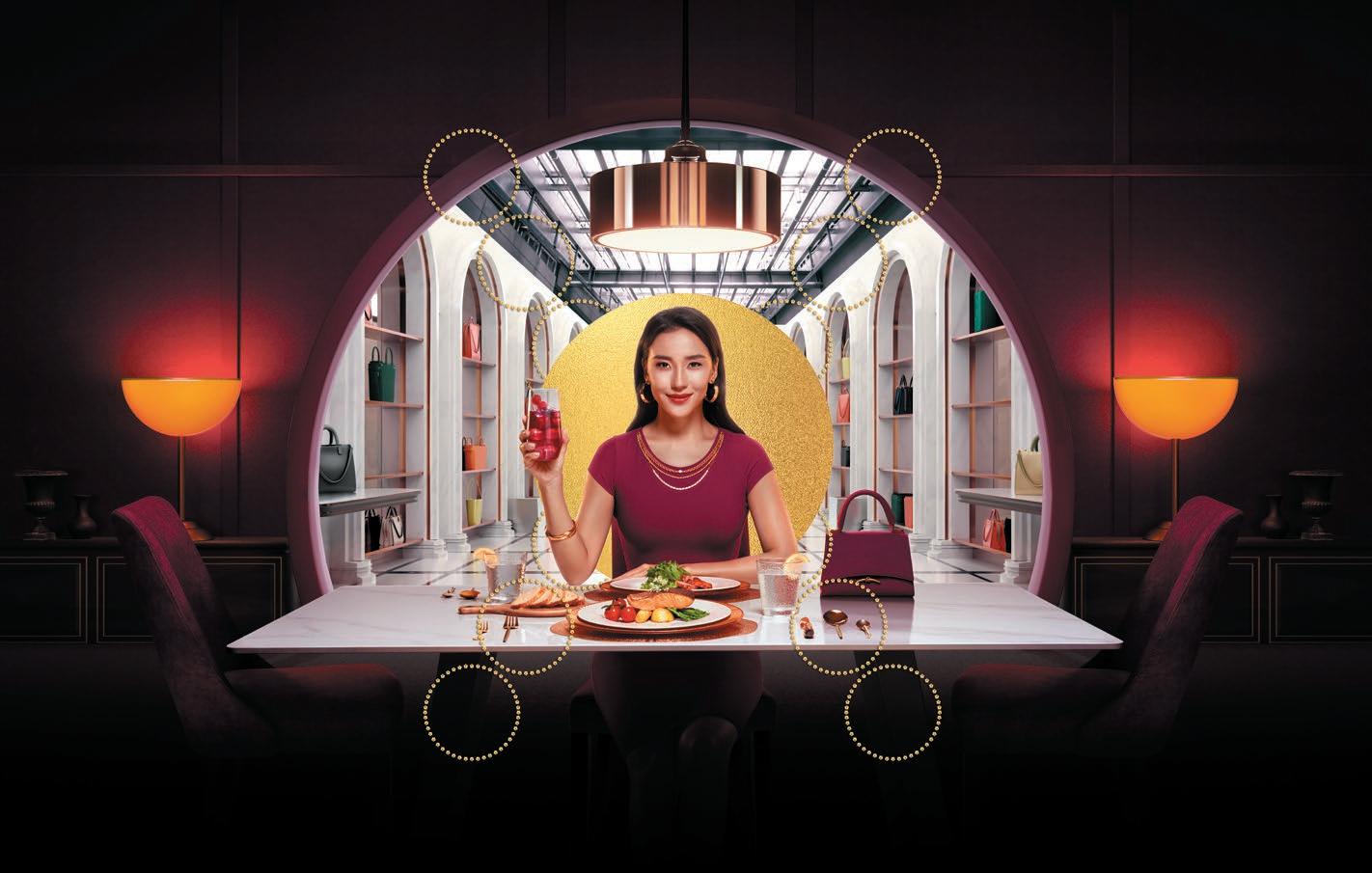




On behalf of the Institute of Shopping Centre Management, I extend warm congratulations to PPK Malaysia for the 40th Anniversary this year. This milestone truly reflects four decades of steadfast commitment, innovation, and excellence in the realm of shopping centre management.
PPK Malaysia’s journey epitomizes a blend of growth, community engagement, and a pioneering ethos that has significantly influenced our industry’s landscape in the region.
As Chairlady of ISCM, it is with great pride that I share in celebrating this momentous occasion with our esteemed regional partners in CASC. The collaborative efforts between Hong Kong and Malaysia, as well as ISCM and PPK, have been pivotal in driving industry advancements across the APAC region, fostering mutual growth and innovation.
Let us unite in honoring PPK Malaysia’s 40-year legacy of success and anticipate with excitement the continued expansion and collaboration that lies ahead. Together, we look forward to shaping a future filled with innovation, progress, and shared success.
MAuREEN FuNG Chairlady
Institute of Shopping Centre Management, Hong Kong
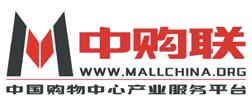
The shopping centre industry includes rich and various social values and has always been the windows of urban development, the display of local cultural development, the living space of residents and the stage for brand growing. This industry has the value of global interconnection, professional knowledge, joint industry ideals, shared resources and innovative thinking. Thus, shopping centres would become very close business partners within this background.
On the occasion of the 40th anniversary of PPK Malaysia, Mall China Development Association in Beijing would like to extend our best wishes and wish PPK Malaysia even greater success in the future development.
vICTOR GuO President
Mall China Development Association
China Commercial Real Estate Decoration Design Committee
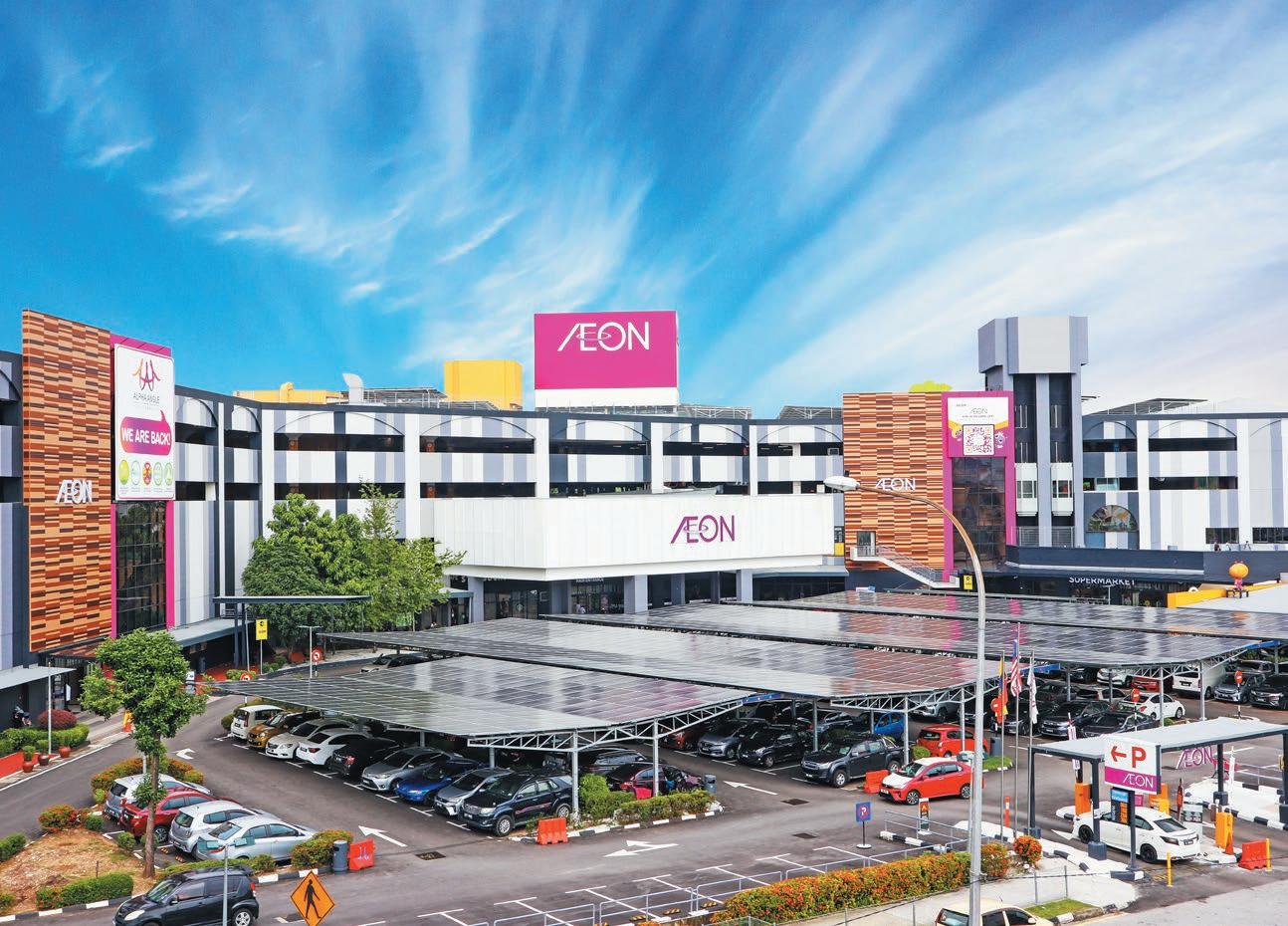



















What began as a single store has grown into Malaysia's largest mall operator, with 28 malls and 35 stores nationwide. Guided by our 'Customer First' philosophy, we consistently exceed expectations by o ering an optimal product mix, leading green initiatives and providing venues for healthy social activities. Our malls are strategically located to stay close to you, allowing us to serve you better. As we celebrate our 40th anniversary this year, we remain committed to being by your side. Visit us today, and together, let’s continue creating smiles and connecting hearts.


Congratulations on reaching the remarkable milestone of your 40th Anniversary! This achievement is a testament to your dedication, innovation and unwavering commitment to excellence in the retail industry. Over the past four decades, PPK Malaysia Shopping Mall has transformed from a pioneering vision into a beloved destination, providing an exceptional shopping experience to millions of visitors. Your ability to adapt to changing trends while maintaining a steadfast focus on customer satisfaction has set a benchmark for malls nationwide.
As a founding member of CASC, you have played a pivotal role in shaping the principal objectives of enhancing multilateral relations and networking among shopping malls in the Asian region, hosting regular annual conferences for member malls. Your involvement in education, through programs like the Certification Programme, has significantly elevated the professionalism in mall management.
This celebration is not just about commemorating the past but also about looking forward to a future filled with exciting opportunities. Your continuous efforts to enhance the retail landscape, provide top-notch services, and foster a vibrant community are truly commendable. The Shopping Centre Association of India is proud to be associated with an organization that exemplifies such high standards of professionalism and customer care. As you celebrate this momentous occasion, we extend our heartfelt wishes for continued success, growth, and prosperity in the years to come.
Warm regards,
PuShPA BECTOR Chairperson
Shopping Centre Association of India
Congratulations on Four Decades of Excellence!
As PPK Malaysia celebrates its 40th Anniversary, we extend our heartfelt congratulations to the entire team for reaching this remarkable milestone. Over the past four decades, PPK Malaysia has exemplified unwavering commitment, innovation, and excellence in shopping centre industry. Your dedication and visionary leadership have not only set industry standards but also inspired countless individuals and organizations.
This anniversary marks a significant chapter in a storied history of success and achievements. It reflects the hard work, resilience, and passion that have driven PPK Malaysia to continually exceed expectations and make a lasting impact.
As we look back on the past and celebrate the present, we also eagerly anticipate the future. May the next decades bring even more growth, success, and opportunities. Here’s to PPK Malaysia’s continued journey of excellence and to many more years of groundbreaking accomplishments!
Congratulations once again on this extraordinary achievement!
Warmest regards,
JEFF TSAI Chairman Taiwan Council of Shopping Centers and Commercial Real Estate

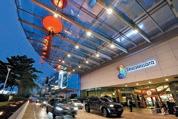
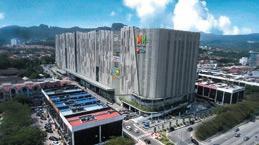
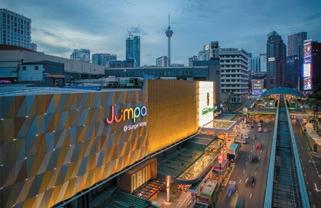
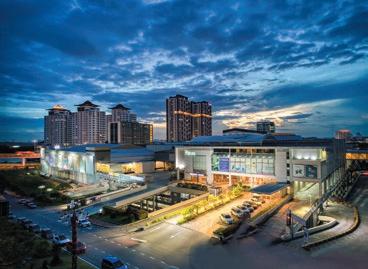
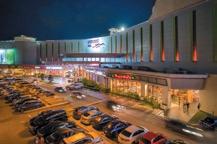
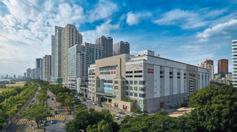
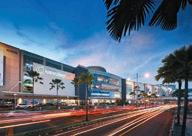
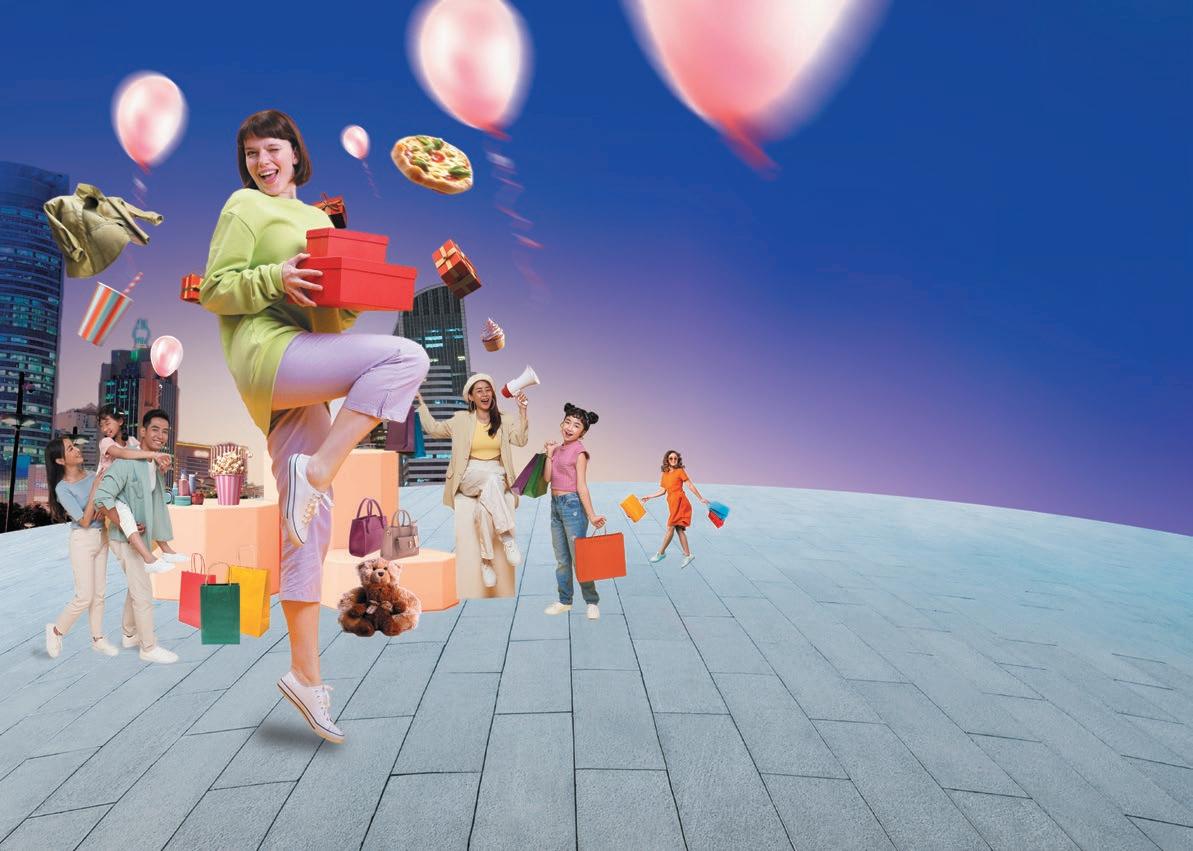

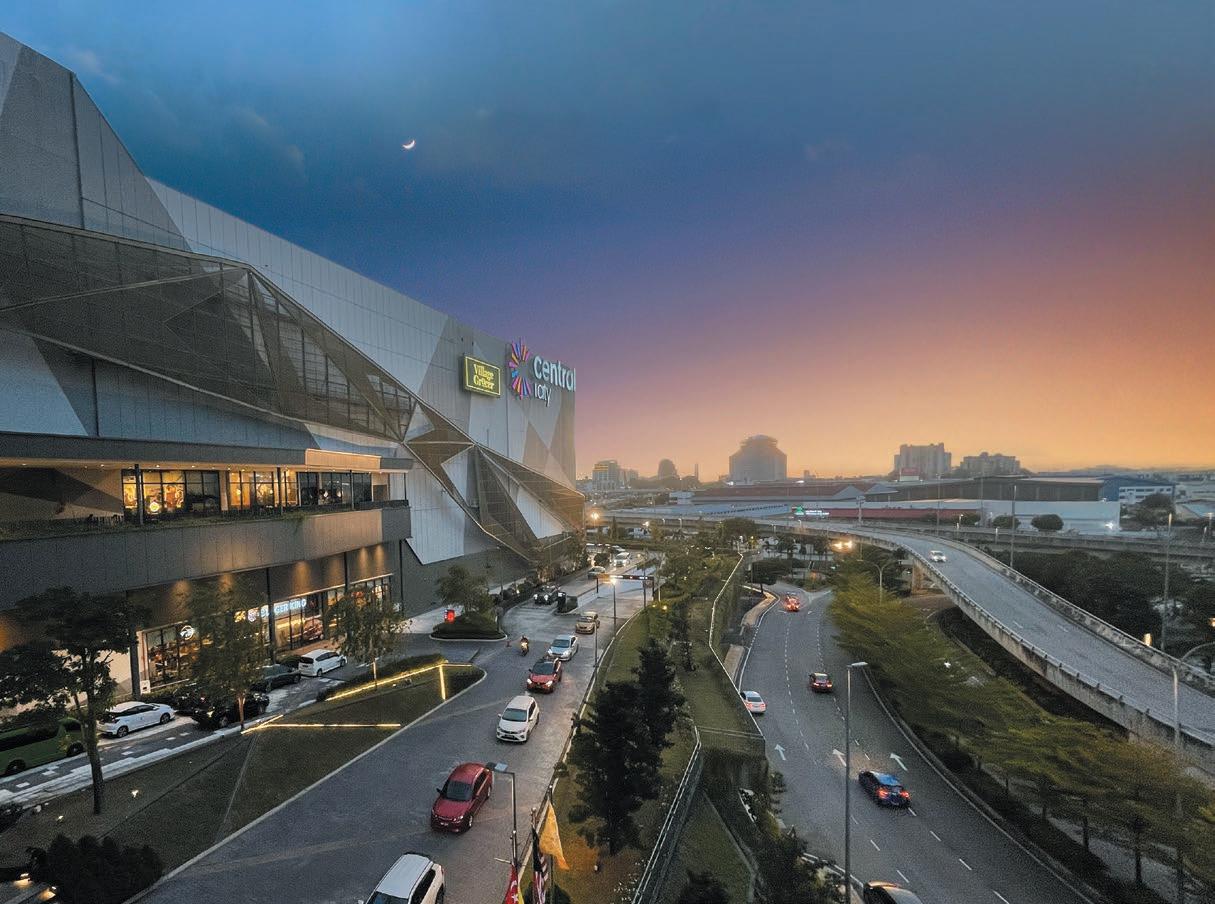

In Malaysia, shopping malls have transformed from basic retail outlets into key drivers of national development, significantly boosting economic growth, urbanisation and social unity. Over recent decades, these retail giants have become integral to Malaysia’s urban environment, contributing substantially to the Gross Domestic Product (GDP) and contributing significantly to the nation’s growth and development.
With over 17 million square meters of shopping mall space within hundreds of upscale malls, Malaysia is a shopper’s paradise for both locals and tourists.1 These malls are economic powerhouses. In 2023, Malaysia’s retail trade sector was estimated to account for approximately 8.6 percent of the nation’s gross domestic product (GDP), reflecting a one percent increase over the past two years, according to the Department of Statistics Malaysia.2
In January 2024, Malaysia’s wholesale and retail trade achieved a sales value of RM142.4 billion, marking a 5.4% year-on-year (y-o-y) increase.3 Datuk Seri Dr. Mohd Uzir Mahidin, the chief statistician at DOSM, attributed this growth to the wholesale trade sub-sector, which increased by 5.5% or RM3.3 billion, reaching RM63.7 billion.3 The retail trade also
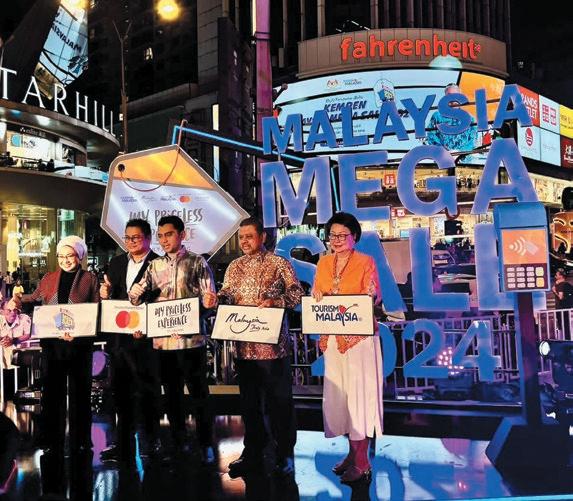
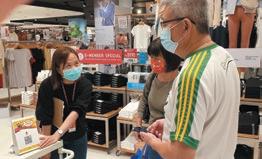
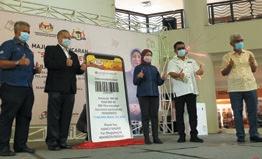
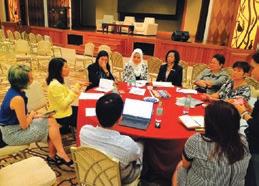




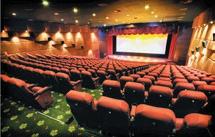




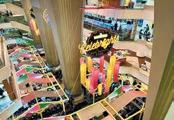

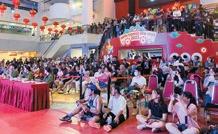




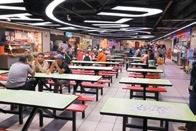
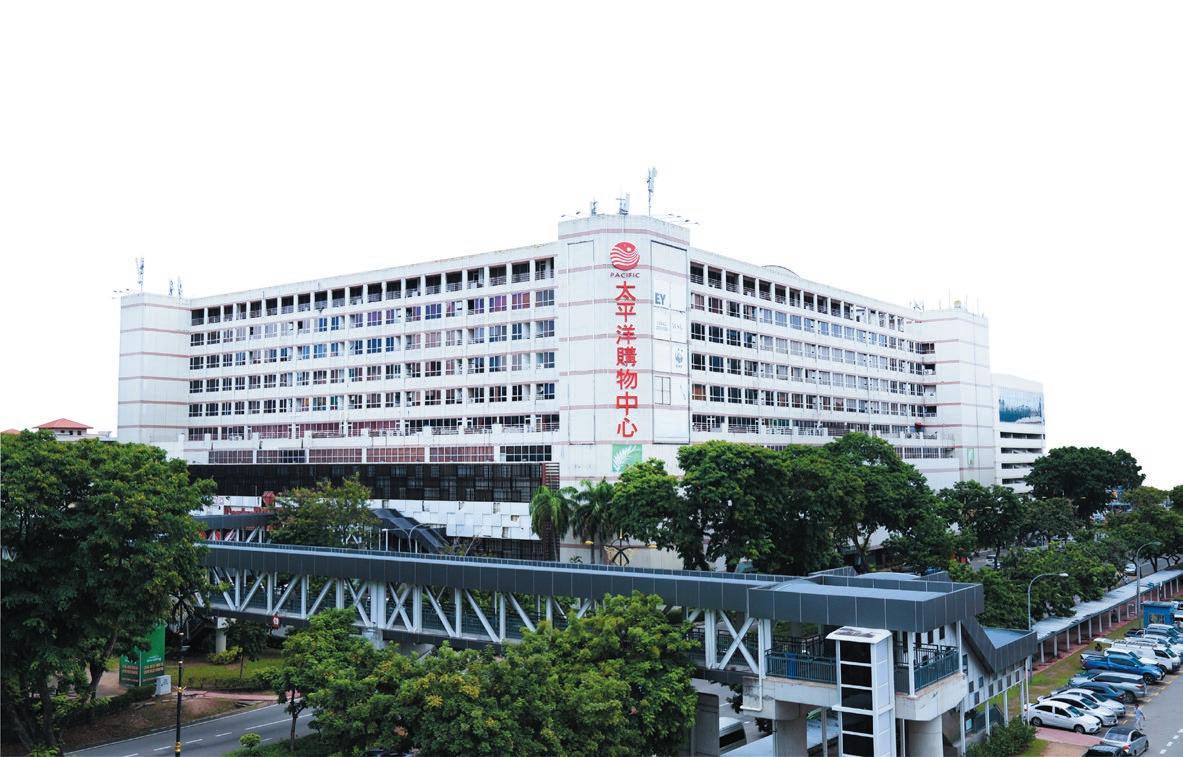
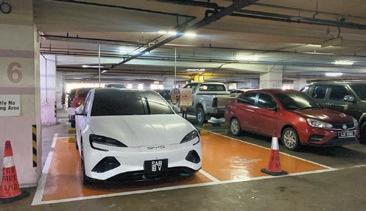







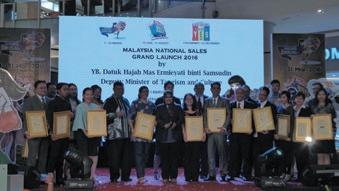
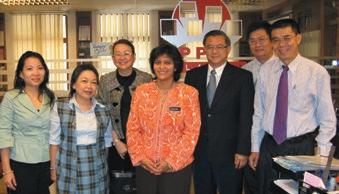
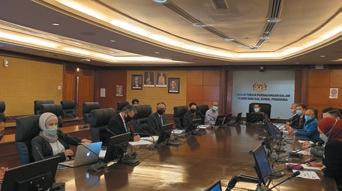
saw a rise of 2.6% or RM1.5 billion, totaling RM61.1 billion.3
The construction and operation of malls generate thousands of jobs in retail, hospitality, maintenance, and security. In 2023, over 2.8 million people were employed in Malaysia’s wholesale and retail trade industry, up from 2.75 million the previous year.4 Employment in this sector has been steadily rising annually.
Although online retail surged during the COVID-19 pandemic, a 2023 survey revealed that most Malaysian consumers still prefer physical stores, especially for groceries and furniture.2 One major reason for this preference is that shopping malls are deeply ingrained in Malaysian consumer culture and the retail industry. In major cities, shopping malls popular leisure destinations.
According to the Department of Statistics Malaysia (DOSM), shopping tourism is increasingly significant in the tourism value chain. Shopping heavily influences domestic tourists’ expenditure, as evidenced by the DOSM’s Domestic Tourism Survey of 2021.5 The global travel retail market was valued at US$51 billion (RM227.43 billion) in 2021
and is expected to grow to over US$96.11 billion (RM428.6 billion) by 2029.5 This trend presents vast opportunities for the retail and tourism sectors to create authentic shopping experiences that enhance a destination’s appeal.
In July 2024, Phang Sau Lian, president of Malaysia Shopping Mall Association (PPK Malaysia), stated that Malaysia’s shopping malls are adopting a new strategic direction to rejuvenate the mall industry ahead of Visit Malaysia Year 2026 (VMY2026), in coordination with the Ministry of Tourism, Arts and Culture.6 The focus will be on the two main areas of Festive Tourism and Tourist Precincts, and will include using festive decorations in malls as a major draw, along with cultural activities, food, and entertainment to enrich the shopping experience.6
As Malaysia’s economy evolves, so do its shopping malls. Technological advancements and shifting consumer preferences drive malls to innovate, incorporating digital directories, mobile apps, and online shopping platforms to enhance the customer experience. Sustainability is also a growing focus, with
malls adopting green building practices and promoting eco-friendly initiatives to minimise their environmental impact.
In conclusion, shopping malls in Malaysia transcend their retail functions to become essential pillars of national progress. They drive economic growth, foster urban development, act as cultural and social hubs, contribute to tourism expenditure, thus shaping the nation’s future. As Malaysia advances, shopping malls will remain central to its development, reflecting the dynamic and diverse nature of Malaysian society.
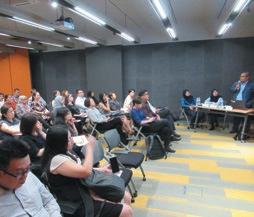
References
1 https://www.statista.com/topics/12230/retail-trade-in-malaysia/#topicOverview
2 https://www.statista.com/statistics/1459755/malaysia-share-of-retail-trade-to-the-gdp/
3 https://www.nst.com.my/business/economy/2024/03/1025163/wholesale-retail-trade-sales-54-pctrm1424-bln-january-2024-dosm
4 https://www.statista.com/statistics/809713/annual-employment-in-the-retail-trade-industry-malaysia/
5 https://www.thestar.com.my/lifestyle/travel/2022/08/20/malaysia-is-a-shopping-paradise-for-many-tourists
6 https://www.nst.com.my/news/nation/2024/07/1072590/shopping-malls-enhance-visitorexperience-vmy2026


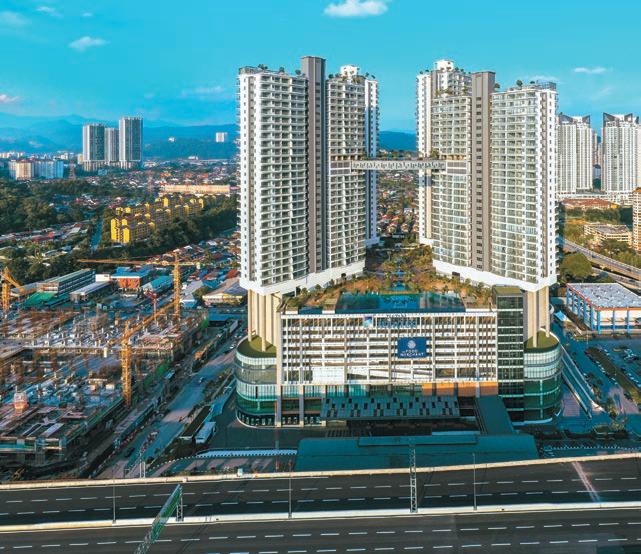



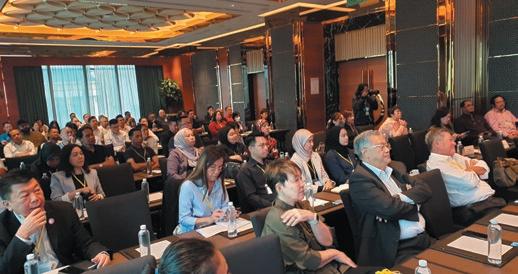
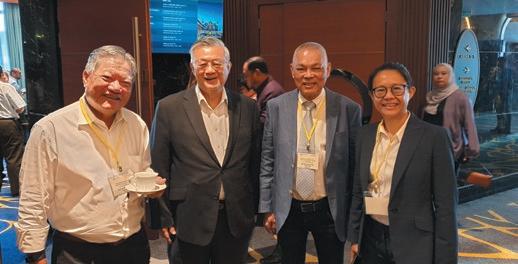
PPK Malaysia has played a pivotal role in shaping the mall and retail landscape of the country. Established with the vision to promote, represent, and support the shopping mall industry, PPKM has consistently sought to enhance the sector’s growth and sustainability through strategic collaborations with both local and international organisations. These partnerships have not only bolstered the standards of Malaysian malls but have also fostered innovation, economic growth, and cultural exchange.
PPKM’s collaboration with local organisations is instrumental in driving the development and modernisation of shopping malls across the country. One key collaboration is with FIABCI Malaysia where annual seminars have been organized since 2006 on strata property management, including pertinent aspects on shopping malls, and these have attracted much interest from practitioners over the years.
Another significant local partnership is with the Institution of Engineers Malaysia (IEM) and Engineering Shopping Malls has been the theme of seminars co-organized with them since 2012 where professional engineers share technical information applicable in the shopping mall management context. This partnership has proved to be invaluable for the adoption of technological advances to
operational procedures and for the engineering experts to be updated on expectations by mall practitioners.
PPKM and retailers continue to collaborate in addressing the common challenges faced by the mall and retail sector, such as regulatory changes and generic impacts on the industry. This collaboration has led to the creation of comprehensive training programmes for personnel from mall management and retailers in the malls on safety and operational efficiency in the work place which will inevitably generate improvements to the overall shopping experience. Of late, several workshops on Occupational Safety & Health and Scam awareness have also been jointly held with Malaysia Retailers Association (MRA). Over the years, PPKM has also organized webinars to showcase more retailers to mall personnel and to foster closer relationships as business partners.
Other like-minded industry players in business like Malaysia Retail Chain Association (MRCA), Bumiputra Retailers Organisation (BRO), BB-KLCC Tourism Association, and representatives from the hotel industry like Malaysian Association of Hotels (MAH), Malaysian Association of Hotel Owners (MAHO) and Malaysia Budget & Business Hotel Association (MyBHA) have also come together with PPKM on common ground to lobby the authorities on music copyright fee issues.























































































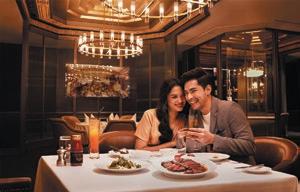








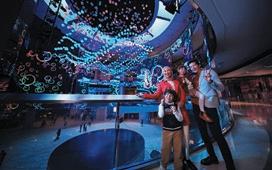

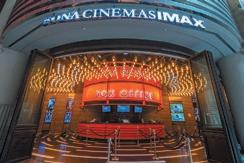
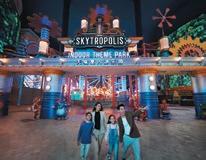

PPKM also has close ties with Building Management Association of Malaysia (BMAM), having co-organised numerous seminars since 2012. These seminars have ensured updated information sharing in building and facilities management particularly pertaining to strata management laws and regulations.
With the current buzz word on sustainability and recognising its growing importance, PPKM has promoted this direction with webinars and seminars. Key speakers from GreenRE and other organisations which promote green building practices within the shopping mall industry were invited for eye-opening webinars on topics like green malls, urban farms, solar panels, electric vehicle bays (EVBs) and green loans. This has resulted in creating greater awareness and implementation of various initiatives aimed at reducing the environmental impact to preserve it for the future.
Through the years, PPKM has also fostered strong relationships with government bodies, such as Tourism Malaysia, the Ministry of Tourism, Arts, and Culture (MOTAC) and the Ministry of Domestic Trade and Costs of Living. Through these collaborations, PPK Malaysia has been able to appeal and advocate for favourable regulations, and secure support for industryspecific initiatives. These include the popular Malaysia Mega Sale Carnival programmes initially incepted in 1999 and which ran until 2020. Post pandemic, PPKM worked closely with Tourism Malaysia to organize the Shop and Be Rewarded campaigns in 2021-2022 with our member malls and this helped to kick-start the economy after the pandemic restrictions were lifted. Our malls have also participated in
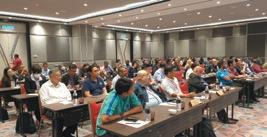
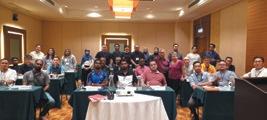
the Malaysia National Sales programmes which re-commenced from 2024 to attract more shopping tourism.
We will continue our close working relationship with the authorities to enhance Malaysia’s attractiveness as a shopping destination for tourists as tourism remains a vital sector and shopping tourism is important to our malls.
During the COVID-19 pandemic, PPKM worked closely with relevant government agencies to develop and implement safety protocols that ensured the safe reopening of malls, thereby protecting both employees and customers while supporting economic recovery. Similarly, we included our industry partners like MRA, MRCA, BRO, BB-KLCC, MAH, MAHO and MyBHA as a joint conglomeration to appeal for relief from the business crisis that ensued.
PPKM has continuously engaged with local
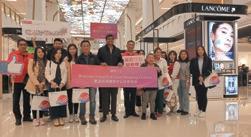
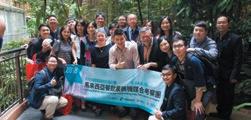
affiliates to regularly organize our Teh Tarik Talks and webinars to showcase new suppliers or businesses as potential partners in our malls as well as to introduce fresh service providers with new technology for mall operations.
On the international front, PPKM has established strategic alliances with several global organisations to keep abreast of industry trends and innovations. One notable partnership is with the International Council of Shopping Centers (ICSC). Through this previous collaboration, PPK Malaysia has gained knowledge and resources, including research reports, best practices, and networking opportunities with industry leaders in the worldwide. This enables Malaysian malls to stay competitive and adopt cutting-edge technologies and strategies that enhance their appeal and functionality. PPK Malaysia and ICSC also collaborated to offer the Shopping Center Management Learning Series, and participated in several international events
like RECon Asia-Pacific 2018, amongst others. Our member malls have also closely participated in the ICSC Awards for international malls in various categories, and we are pleased that several of our Malaysia malls have garnered these prestigious awards in recent years.
PPKM is a founder member of the Council of Asian Shopping Centers (CASC) in 2004 and this further underscores its commitment to regional collaboration. CASC member associations regularly organize annual conferences in their own countries and PPKM has already organized 3 conferences in 2004, 2008 and 2019. By participating in and organizing these CASC conferences, PPK Malaysia is able to share insights and learn from the experiences of other countries in the region. This exchange of ideas fosters innovation and helps Malaysian malls to implement new concepts and practices that cater to evolving consumer preferences and market dynamics.
PPK Malaysia’s strategic collaborations with local and international organisations have been crucial in driving the growth and development of the shopping mall industry in Malaysia. These partnerships have facilitated the exchange of knowledge, the adoption of best practices, and the implementation of innovative solutions that enhance the customer experience and operational efficiency of malls.
As PPK Malaysia continues to strengthen these alliances, it will undoubtedly play a central role in shaping the future of retail in Malaysia, ensuring that the country’s shopping malls remain vibrant, competitive, and sustainable in the global marketplace.

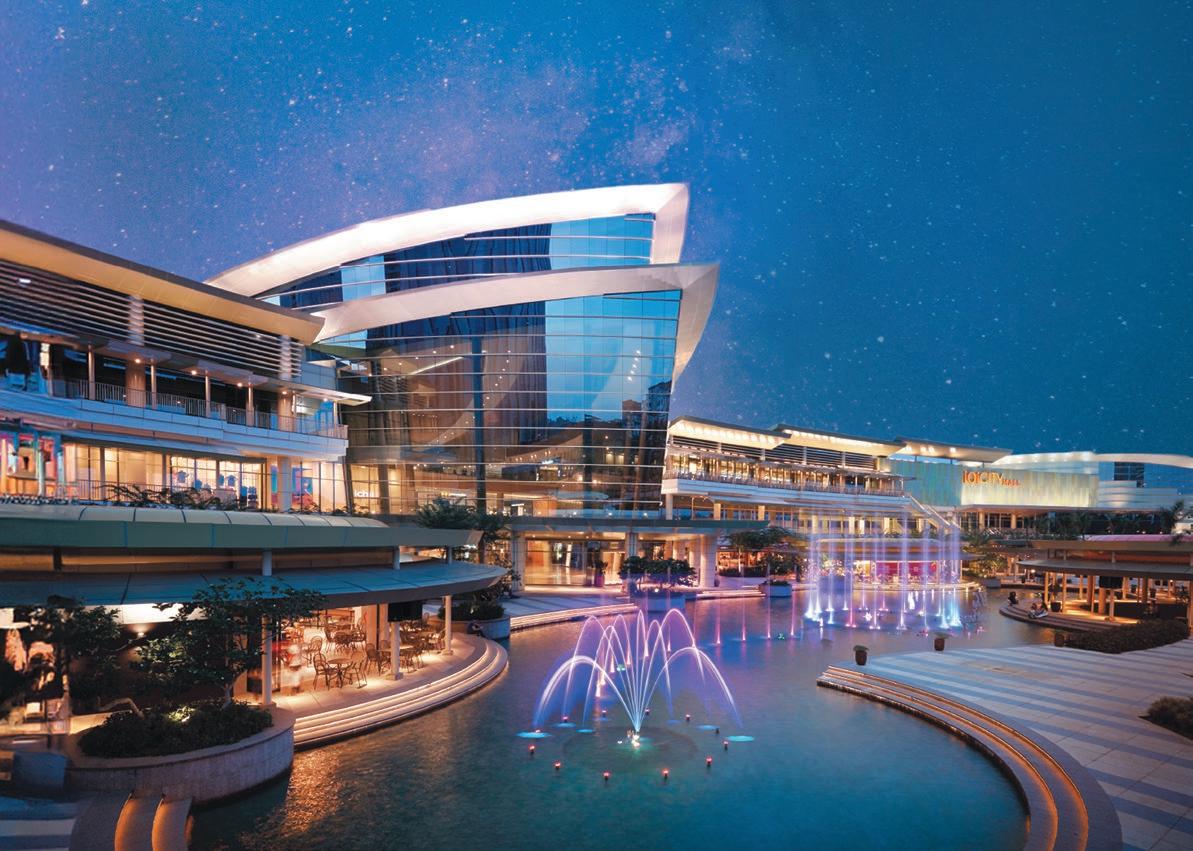

The COVID-19 pandemic brought unprecedented challenges to industries worldwide, with the retail sector being among the hardest hit. Shopping malls, typically bustling with activity, found themselves facing a stark reality of lockdowns, empty corridors, and shuttered stores. Amidst this uncertainty, PPK Malaysia and its members emerged as a steadfast ally to their business partners, navigating the crisis with resilience and innovation.
When news of the pandemic broke out with its origin in China, PPKM’s immediate response was engagement with our mall counterparts from China and a webinar was organized with them in an attempt to understand and address the unprecedented scenario.
As the pandemic unfolded, PPKM swiftly mobilised resources to address the immediate needs of its members. The association reached out and facilitated communication channels between landlords and tenants, ensuring transparent and timely information flow. This was crucial in managing expectations
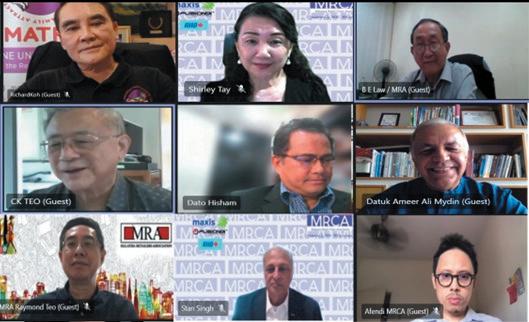
and fostering a collaborative approach to the challenges at hand.
Understanding that both landlords and retailers were grappling with plummeting revenues, the association worked tirelessly with the government agencies to appeal for subsidies on utilities, tax reliefs, temporary suspension of statutory contributions and others.
In the early stages, the nation was
grappling with logistics to organize mass vaccinations urgently and realising that the vaccination exercise had to be implemented expeditiously, particularly for employees of shopping malls and their business outlets as they were all front-liners, PPKM mooted the idea to the relevant authorities to bring the vaccination centres to the shopping malls to efficiently inoculate and protect all mall and business outlet employees. This eliminated
the sheer logistics of travelling to vaccination centres and the antecedent disruption of business operations. This proposal was well received and the authorities granted us priority to fast track vaccination for employees in retail.
Numerous malls recognised the need to undertake this corporate social responsibility and rapidly rallied to this cause. The Retail Industry Vaccination (RiVAC) Programme was carried out at The Spring and Vivacity Megamall at Kuching, Mid Valley Megamall, IOI City Mall, 1 Utama Shopping Centre, Centro Mall Klang, Dataran Pahlawan Melaka, and Gurney Paragon Mall and Design Village Outlet Mall in Penang. In total, the RiVAC programme vaccinated an estimated total of 56,000 shopping malls’ frontliners. With the close cooperation from our members malls, PPK Malaysia is indeed proud to have contributed significantly towards helping our country achieve herd immunity.
PPKM also joined hands with Industries Unite to engage with government agencies to open up more business sectors soonest possible to mitigate the “white flag” situation from certain communities and from businesses badly impacted by cash flow issues during the Covid-19 pandemic.
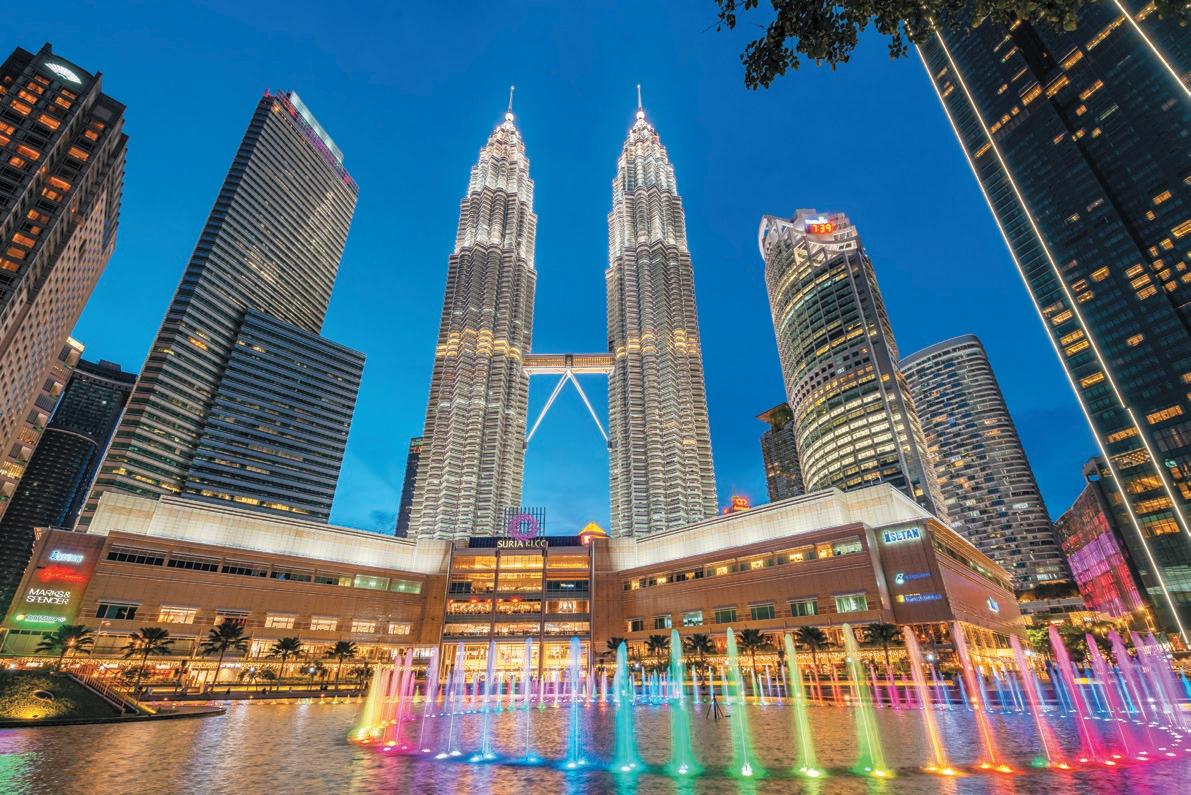
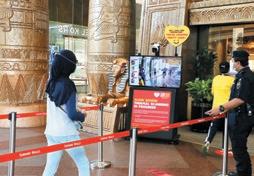
Recognising the importance of maintaining customer engagement during lockdowns, PPKM member malls spearheaded digital transformation initiatives. Shopping malls, traditionally reliant on foot traffic, had to pivot to online platforms to stay connected with their customers. Malls moved to contactless transactions, leveraging social media for virtual events, implementing click-andcollect services and some malls even set up e-commerce websites.
The association organised webinars for members, introducing knowledge and skills needed to navigate the digital landscape. These sessions covered topics like digital marketing strategies, ensuring that malls and retailers could effectively transition to the new normal.
As lockdown restrictions eased, the focus shifted to reopening safely. The association collaborated with health authorities and industry experts to develop comprehensive protocols for a phased reopening of shopping
malls. These protocols encompassed stringent hygiene measures, social distancing guidelines, and capacity limits to ensure the safety of both shoppers and staff.
Shopping malls were transformed to accommodate the new norms. Enhanced cleaning regimes, installation of hand sanitising stations, and regular health checks for employees became standard practices. The association also advocated for the adoption of contactless payment systems and QR codebased menus in food courts, minimising physical contact points.
To instill confidence in shoppers, the association launched awareness campaigns highlighting the safety measures in place. These campaigns were crucial in reassuring customers that shopping centres were committed to their well-being, encouraging them to return to physical stores in the malls.
Even as restrictions lifted, the association provided more support for the mall community through webinars and events on shared market trends and consumer behaviour, providing valuable insights to help malls adapt their strategies.
Innovation remained at the forefront of these efforts. Recognising the shift in consumer preferences, the association promoted the concept of ‘omnichannel retailing’. This approach integrated physical stores with online platforms, allowing customers to enjoy a seamless shopping experience. Shopping malls became hubs for experiential retail, offering
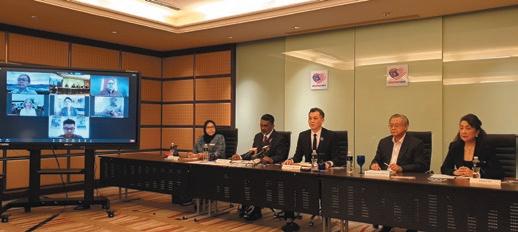

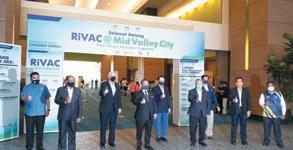
events, pop-up stores, and entertainment options that could not be replicated online.
The pandemic underscored the importance of resilience and adaptability in the mall and retail sector. PPKM played a pivotal role in fostering these qualities among its members.
Promoting digital transformation, ensuring safe reopening, and encouraging innovation all helped malls to weather the storm.
Looking ahead, the association remains committed to supporting its members through ongoing challenges and opportunities.
The lessons learned during the pandemic have reinforced the need for collaboration, flexibility, and a customer-centric approach. As the retail landscape continues to evolve, the association stands ready to support its members, ensuring that they not only survive but thrive in the new normal.
Through the pandemic, PPKM’s leadership strove to be a big brother to the mall and retail community, navigating the pandemic with unwavering support and forward-thinking strategies to help businesses to survive and pave the way for a resilient and dynamic future.
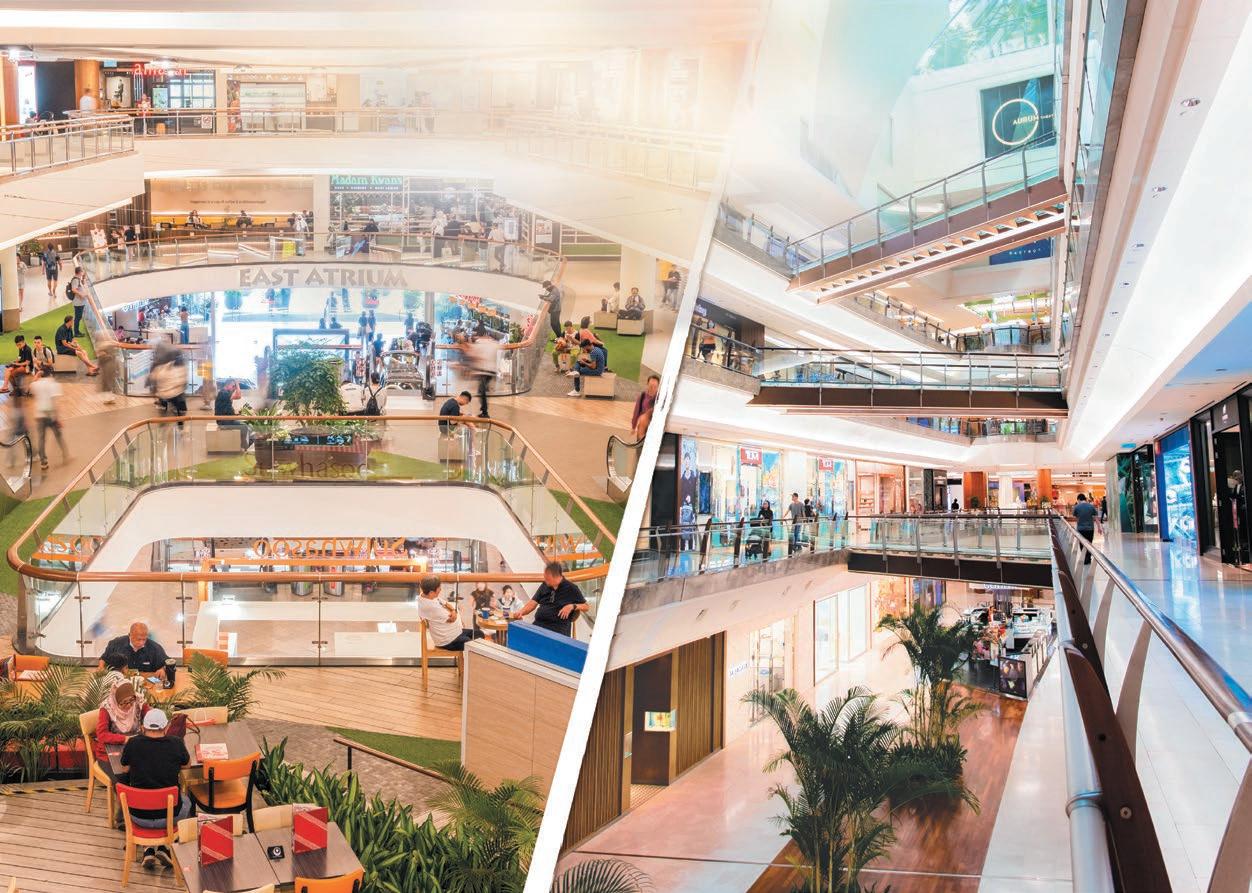


Shopping malls in Malaysia are more than just retail spaces — they are cultural landmarks, social hubs, and microcosms of the country’s diverse and dynamic society. Over the past few decades, Malaysia has seen an explosion in the development of shopping malls, transforming the retail landscape and becoming an integral part of urban life. These malls are not only places to shop but also centres for dining, entertainment and community activities, reflecting Malaysia’s multiculturalism and rapid modernisation.
The evolution of shopping malls in Malaysia began in the 1970s, with pioneering establishments like Ampang Park and Sungei Wang Plaza in Kuala Lumpur setting the stage for future developments. Initially, these malls were modest in scale, catering primarily to the local population’s basic shopping needs. However, as Malaysia’s economy grew and urbanisation accelerated, the concept of shopping malls evolved dramatically.
By the 1990s, several iconic malls emerged including award-winning malls, signaling a new era of retail sophistication and architectural grandeur.
Since its opening in 1995 located at the heart of their own township of Bandar Utama, 1 Utama is one of the largest malls in the country and remains very popular. It has
undergone several extensions and upgrades and with more than 700 stores offering both mid-range and high-end merchandise, it has maintained its popularity - attracting patrons with more than just retail therapy with its iconic indoor rainforest, surfing pool, skydiving wind tunnel, centre for performing arts and a rooftop Secret Garden. The mall is Malaysia’s first eco-mall and boasts several green features like a thermo storage system, rainwater harvesting, expansive rooftop solar panels, an in-house food waste recycling system and a recycle centre.
Yet another popular mall located within an integrated township is Sunway Pyramid in Bandar Sunway, Selangor which opened in 1997. The mall is themed with Egyptian elements and has several individual shopping precincts comprising more than 900 stores including an ice skating rink and a theme park in the vicinity. The mall is central to the mixed development comprising several office towers, hotels, colleges, medical institutions and a theme park. The Sunway Group has several malls within their portfolio, including locations in Kuala Lumpur, Johor and Penang and continues to expand.
Suria KLCC, located at the base of the Petronas Twin Towers, is a prime example of Malaysia’s ambitious approach to mall development. Opened in 1998, this mall quickly became a symbol of Kuala Lumpur’s modernisation and economic progress. With
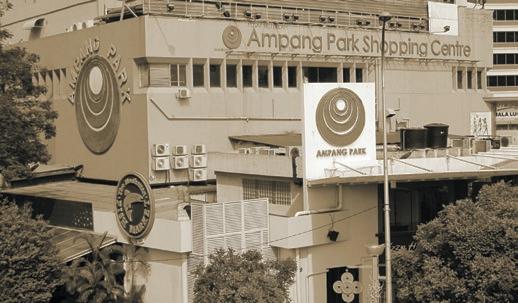
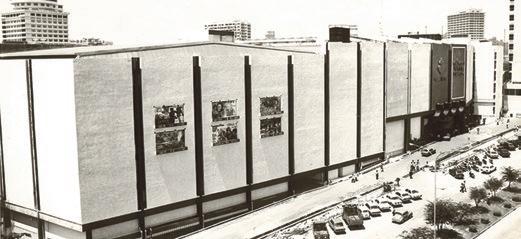
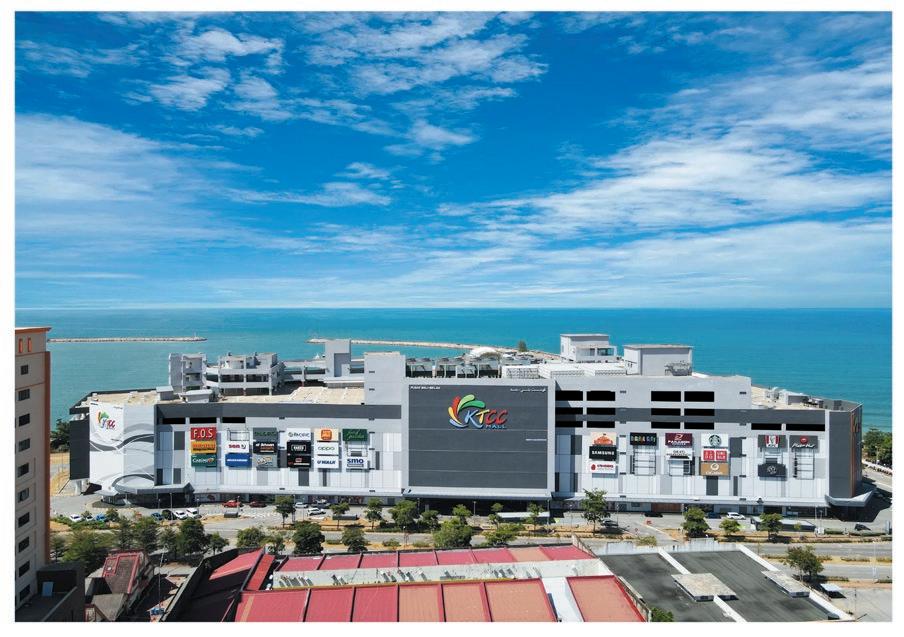
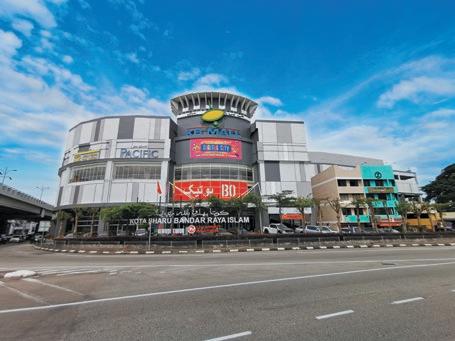


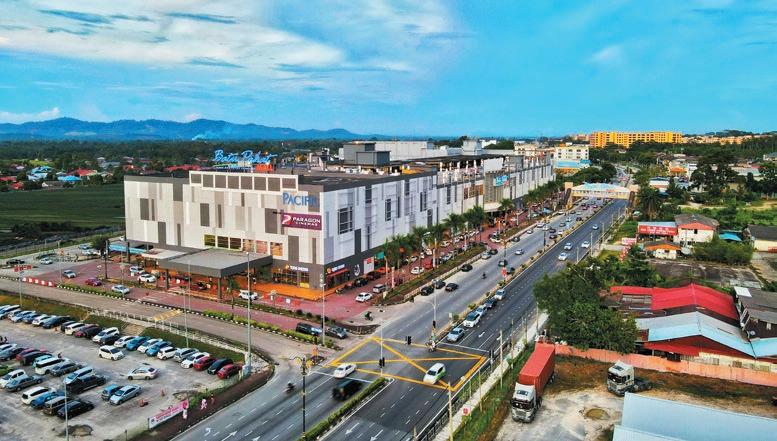



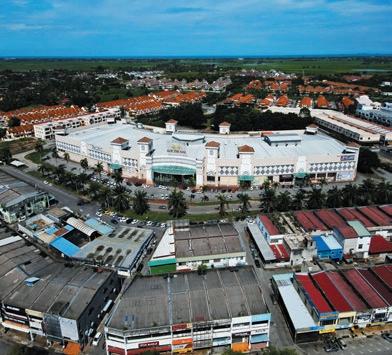
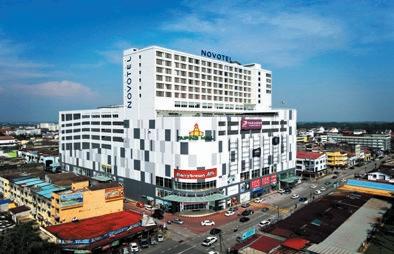
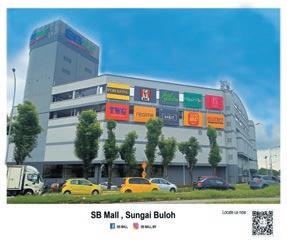

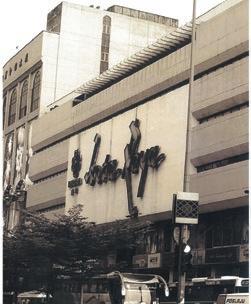
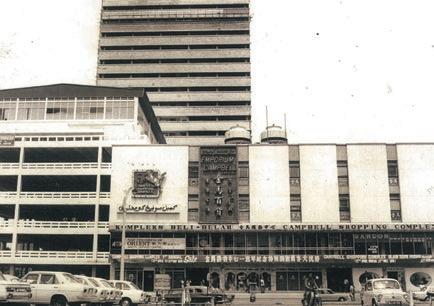
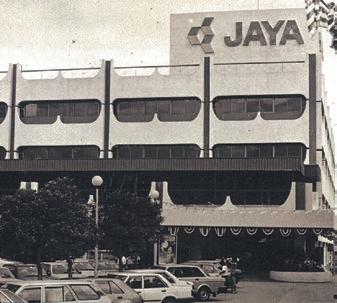
its blend of luxury brands, diverse dining options, and cultural attractions like the Petronas Art Gallery and the Aquaria KLCC, Suria KLCC offers a comprehensive shopping experience that attracts both locals and tourists. Its strategic location in the heart of the city, coupled with the iconic backdrop of the twin towers, has cemented its status as a key landmark and must-visit destination.
Another landmark is Mid Valley Megamall which opened in 1999 which is part of a larger mixed-use development that includes office buildings, residences and hotels. Mid Valley Megamall exemplifies the integrated approach to retail and lifestyle, featuring an extensive array of shops, restaurants, entertainment venues, and even an exhibition centre. This mall’s vast size and variety make it a one-stop destination for shoppers and
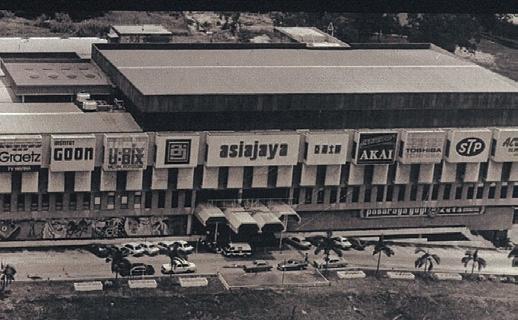
visitors seeking diverse experiences under one roof. In the second phase, The Gardens Mall opened later in 2007 in the Mid Valley City precinct.
From 2000 onwards, a mix of more neighbourhood and mega malls emerged with the advent of power centres and hypermarket malls.
Malaysia has continued to push the boundaries of what shopping malls can offer. The Pavilion Kuala Lumpur, opened in 2007, represents the epitome of luxury and style. Situated in the Bukit Bintang district, Pavilion KL is renowned for its high-end retail outlets, from international designer boutiques to local fashion labels. The mall’s opulent design, highlighted by its grand entrance and elegant interiors, attracts a discerning clientele. Pavilion KL also emphasizes experiential
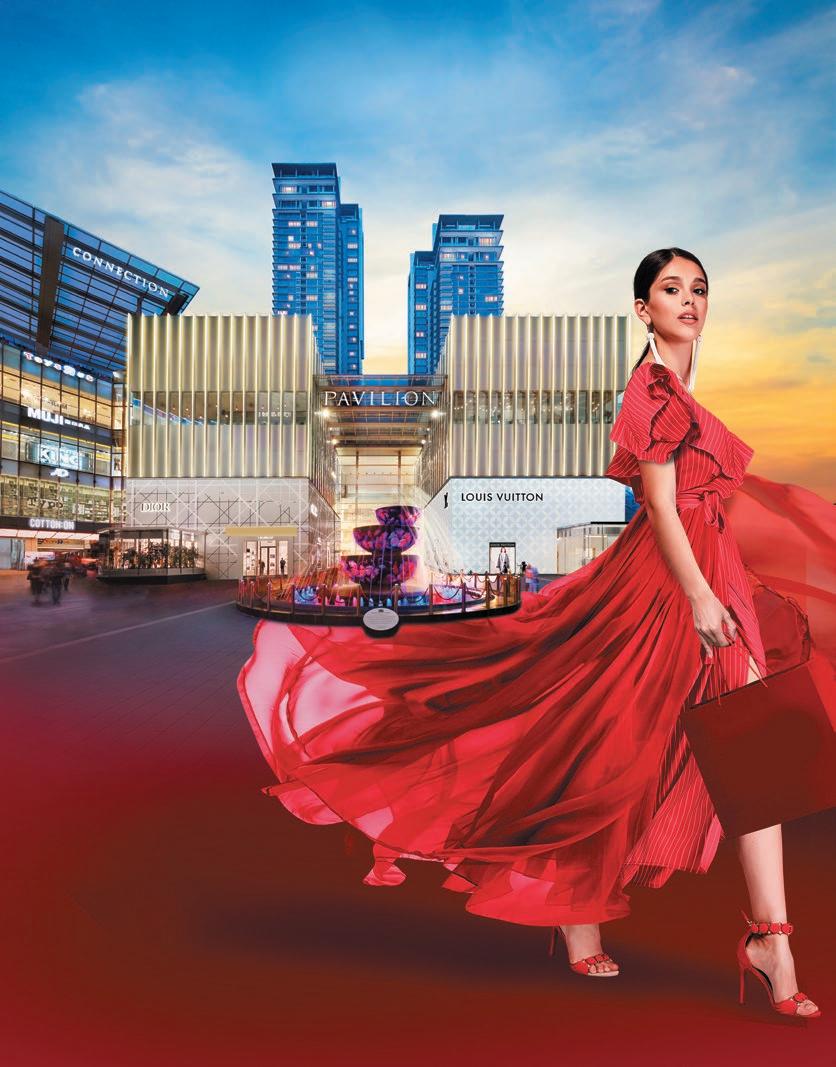

shopping, with numerous events, exhibitions, and activities that engage visitors beyond mere retail transactions.
IOI City Mall in Putrajaya opened in 2017 and became the largest mall in Malaysia after its extension in 2022 totaling more than 600 stores. It offers, amongst others, a themed recreational park, an Olympic-sized ice skating rink, an edutainment exhibition space, an indoor farm and sports centre in the vicinity of office towers and a hotel. The mall is popular with shoppers within the southern corridor of Klang Valley.
More recently towards the end of 2023, The Exchange TRX welcomed shoppers with over 400 of the world’s leading retailers, including designer flagship stores and several first-to-Malaysia brands including the first iconic Apple store in Malaysia. The rooftop park attracts families with their interactive play zones and several gardens and the mall is easily accessible as a hyperconnected precinct which includes a transportation hub and tunnel system running beneath the mall. The Tun Razak Exchange key financial precinct comprises of several office towers, residences and a hotel.
Looking ahead, is the upcoming 118 Mall located in the Merdeka 118 precinct which includes office towers, residences, a hotel and 2 heritage stadiums. The mall is planned to be surrounded by greenery and a linear park and will feature a distinctive glass dome and water features with approximately 1 million sq ft of retail opportunities.
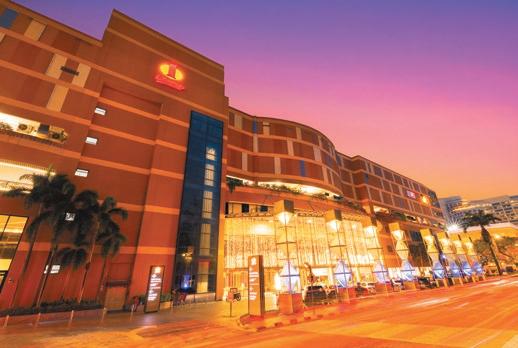
Malaysia’s shopping malls are not only confined to the central region of Klang Valley. Across the country, from Penang to Johor Bahru, modern shopping centres have become central to urban development. Gurney Plaza in Penang, for instance, combines seaside charm with retail convenience, while Johor Bahru’s Paradigm Mall and The Mall, Mid Valley Southkey serves as major retail destinations for both locals and Singaporean visitors. These regional malls are crucial in decentralising retail opportunities and fostering economic growth beyond the capital.
Malls are also popular in East Malaysia, like The Spring. Plaza Merdeka and Vivacity Mall in Kuching, and Sabah Suria and Imago Mall in Kota Kinabalu which attracts not only domestic shoppers but from neighbouring Bruneians.
The diverse offerings in Malaysian malls reflect the country’s multicultural heritage. Food courts and restaurants in these malls often serve a melting pot of cuisines, from Malay, Chinese, and Indian to international fare. This culinary diversity enhances the shopping experience, making malls a popular spot for socialising and dining. Additionally,
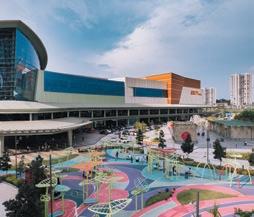
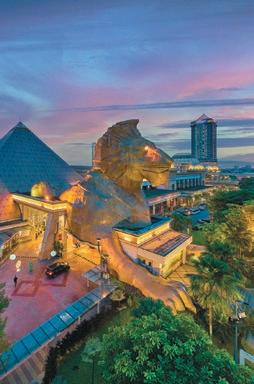
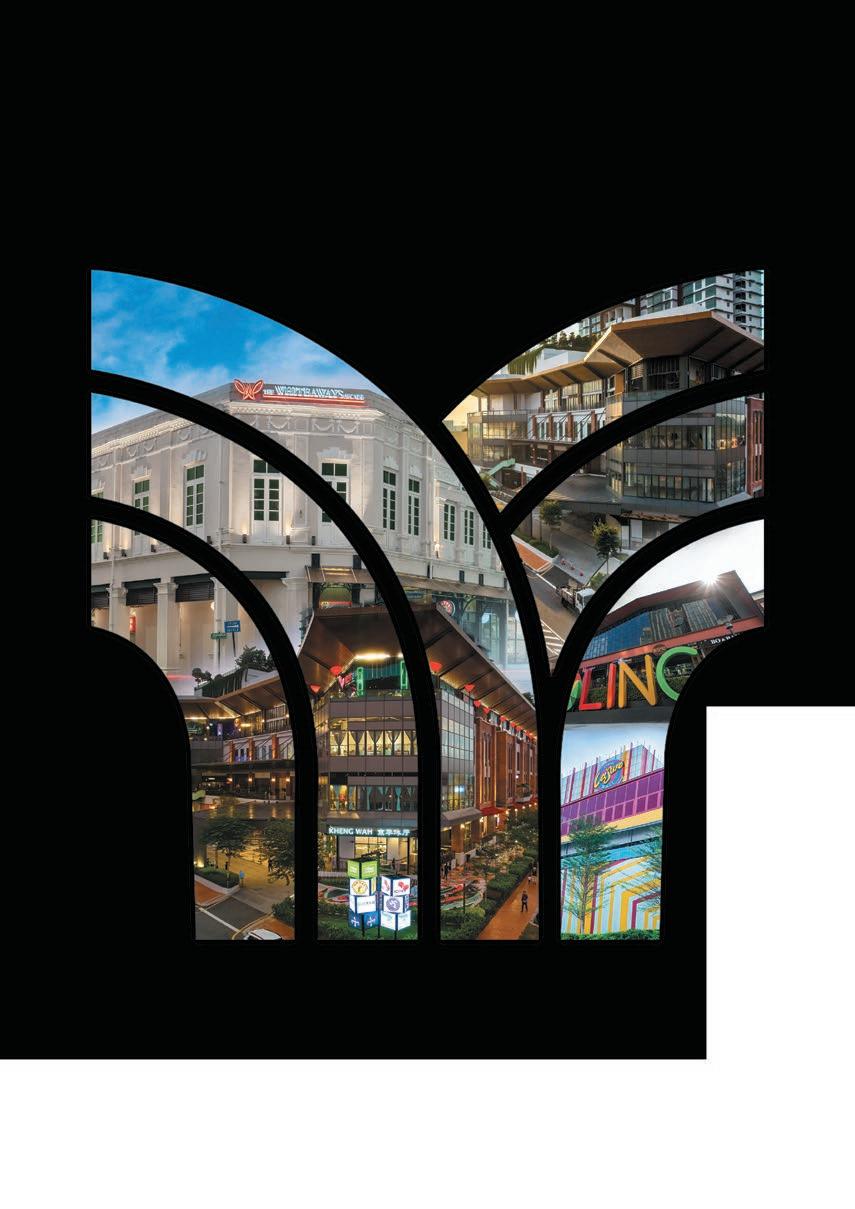
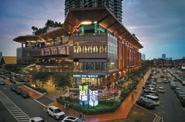
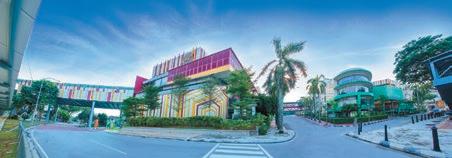


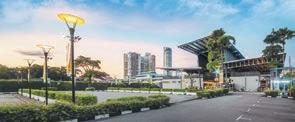

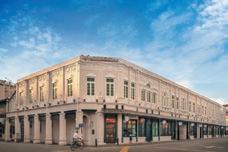


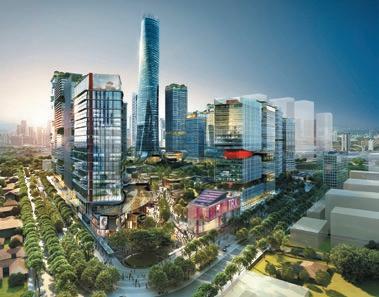
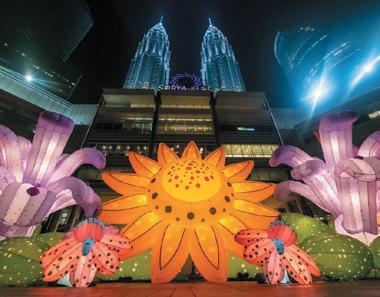
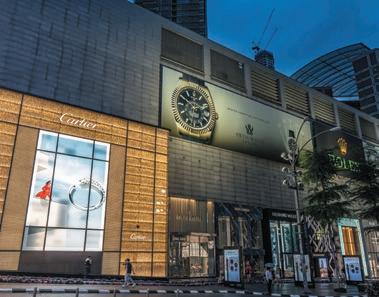
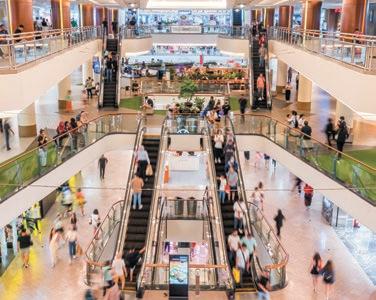
many malls host cultural festivals and events, celebrating the rich tapestry of Malaysian society and providing visitors with a glimpse into local traditions and customs.
Entertainment is another significant aspect of Malaysian malls. Cinemas, arcades, indoor theme parks, and ice skating rinks can be found within these complexes, ensuring that visitors of all ages have something to enjoy. For instance, the Sunway Pyramid Ice skating rink offers an exhilarating escape for skating enthusiasts and visitors seeking a unique recreational experience amidst a bustling shopping environment, having hosted Skate Malaysia and Skate Asia International Tournament.
Besides that, Berjaya Times Square in Kuala Lumpur boasts an indoor amusement park with a roller coaster, offering thrilling experiences in an urban setting. This integration of entertainment and retail underscores the multifunctional role of malls in Malaysia.
Shopping malls in Malaysia are certainly more than just commercial spaces — they are vibrant centres of social and cultural activity. From luxury retail to diverse dining and entertainment options, these malls cater to the varied interests and needs of their visitors. As Malaysia continues to develop, its shopping malls will undoubtedly evolve further, continuing to reflect and shape the lifestyle and culture of the nation.
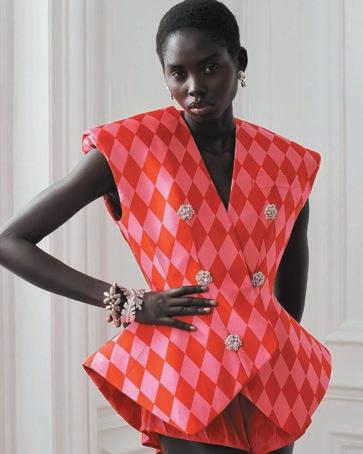

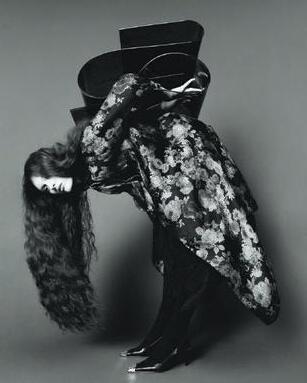

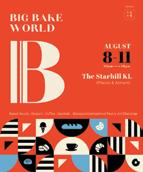
Welcome to the heart of the city where your visit will be redefined with highly curated experiences designed for your indulgence. We are pleased to extend to you exclusive discounts for your shopping and dining pleasure at the boutiques of Balmain, Tom Ford, Philipp Plein, Paul&Shark, Okaju, Luk Yu Tea House and more in The Starhill.
Please present your hotel key card at the point of purchase.
Terms & conditions apply. Valid till 31 December 2024. The Starhill, 181 Jalan Bukit Bintang, 55100 Kuala Lumpur
For shopping malls, winning awards represents a prestigious recognition of excellence, underscoring the high standards achieved in enhancing your mall’s image, branding, and visibility. These accolades not only elevate your mall’s reputation but also boost staff morale, all while adding esteemed feathers to your cap. Indeed, numerous member malls among us have earned awards both locally and internationally, showcasing their dedication to maintaining superior standards. However, it is essential to remember that winning awards is not the ultimate goal. The true value lies in the journey of participation, as the process itself fosters learning, improvement, and the continual enhancement of your mall’s programmes and projects.
At PPK Malaysia, we view awards as a powerful motivator, encouraging all malls to elevate the standards within the shopping industry. Our member malls have gained significant recognition for their exceptional decorations and innovative marketing campaigns, designed to captivate and attract shoppers. To honour these commendable efforts, PPKM has initiated our own awards to celebrate, appreciate, and acknowledge the outstanding marketing campaigns of our member malls, ultimately enhancing the overall shopping experience.PPKM started the inaugural Awards for Best Experiential Marketing in 2016 and this was organized annually until 2019 when there was a hiatus due to the pandemic. The 2019 awards were special as they were organized in conjunction with our international CASC Conference 2019 and we upped the ante by opening it to the global arena and called for participation from regional
members from the CASC community. That year, we received numerous entries from Indonesia, China and Hong Kong for the CASC-PPKM Awards 2019 for Best Experiential Marketing.
Following that, the global pandemic impacted our shopping malls and we only recommenced again in 2022 to give encouragement to our malls who were all striving to recover post-pandemic.
The awards are categorized according to the malls’ size as follows :
• Category A: Malls with nett lettable area (NLA) of 500,000 sq ft and below
• Category B: Malls with nett lettable area (NLA) of 500,001 sq ft to 999,999 sq ft
• Category C: Malls with nett lettable area (NLA) of 1,000,000 sq ft and above
The annual PPKM Awards for Best Experiential Marketing continued from then until 2024, when we introduced new Awards for Top Sustainability Practices in line with increasing emphasis towards Environment, Sustainability and Governance (ESG).
We are indeed very encouraged because as well as receiving increasing entries through the years, the annual awards have steadily attracted more malls to participate. We are proud to acknowledge and recognize the malls’ tremendous marketing efforts for shoppers to enjoy a great experiential time throughout the year and to encourage all malls to adopt sustainability programmes to safeguard our environment.
We are definitely delighted to showcase the best of Malaysian malls!






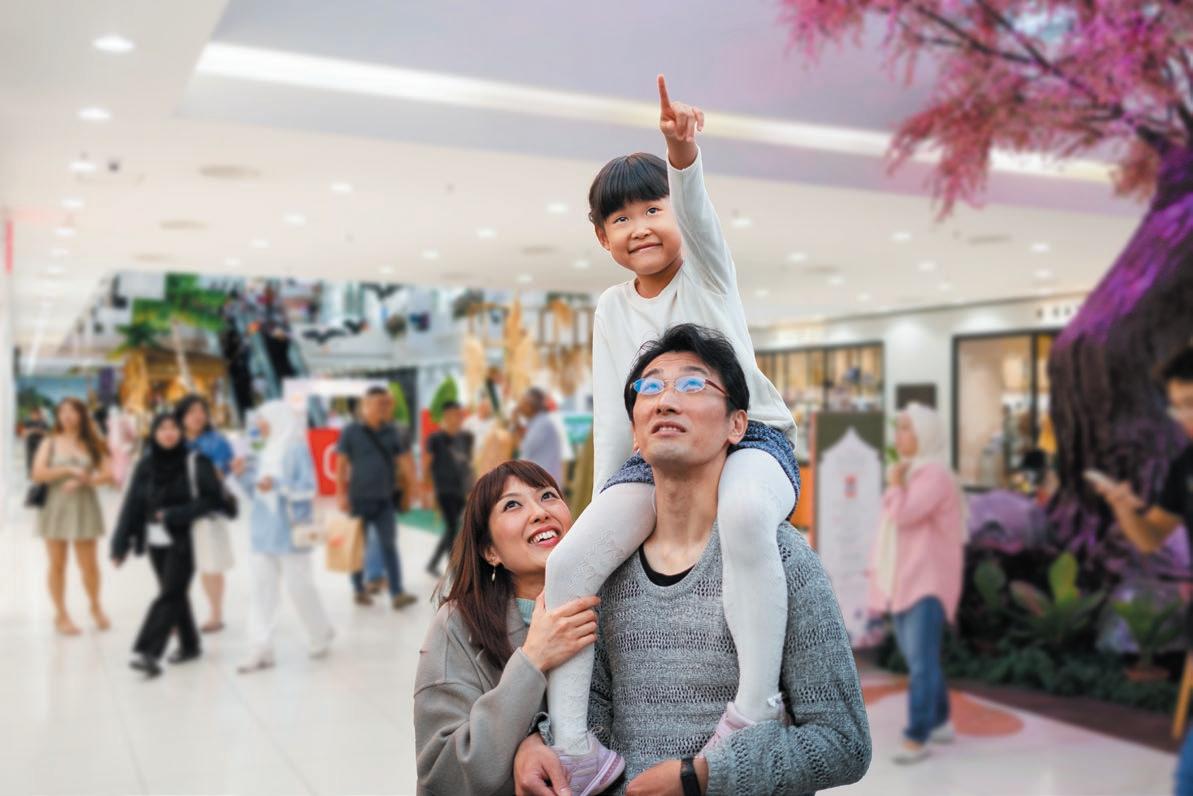
Picnic in the Park
Kuala Lumpur
MICHELLE YEOH ‘The Pride of Malaysia’
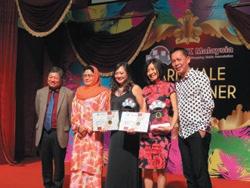
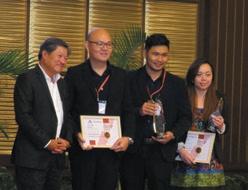
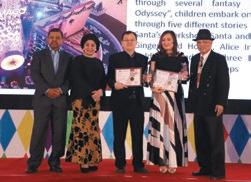
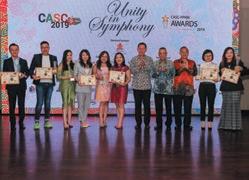
Senandung Aidilfitri
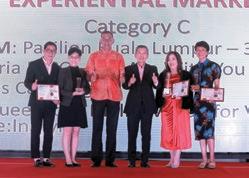
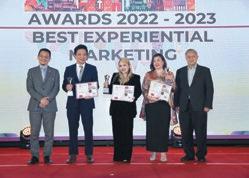
Their services are a welcome complement that create no additional costs and require very little time and effort.
LARS DIETHELM - CHIEF INFORMATION OFFICER, IKEA
ERA helped us in our common purpose of making the pleasure and benefits of sport accessible to all, while minimizing and effectively managing costs.
ERIC MAZILLIER - CEO & OLIVIA MARIESCU - CFO, DECATHLON
Post implementation, they produced regular Management Information that evidenced the project results. Not only have they delivered value for money, they have saved me a lot of time.
JOHN CHAPMAN - PURCHASING DIRECTOR, UNIVERSITY OF HULL



ccheng@eragroup.com

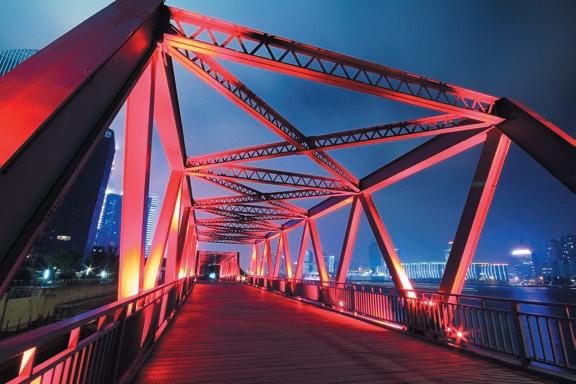
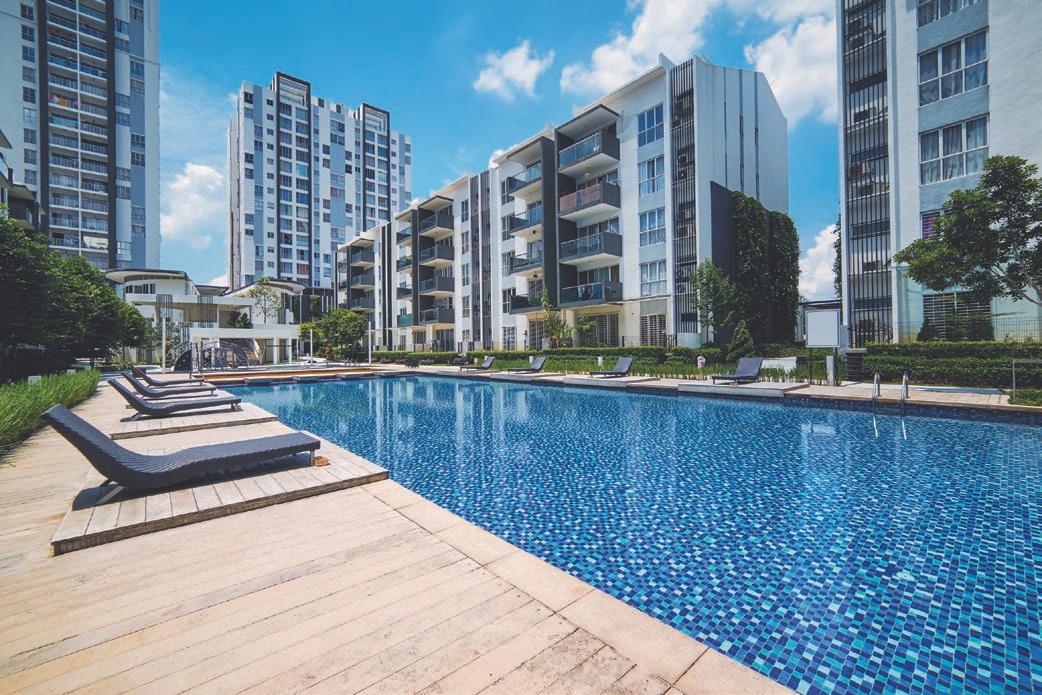
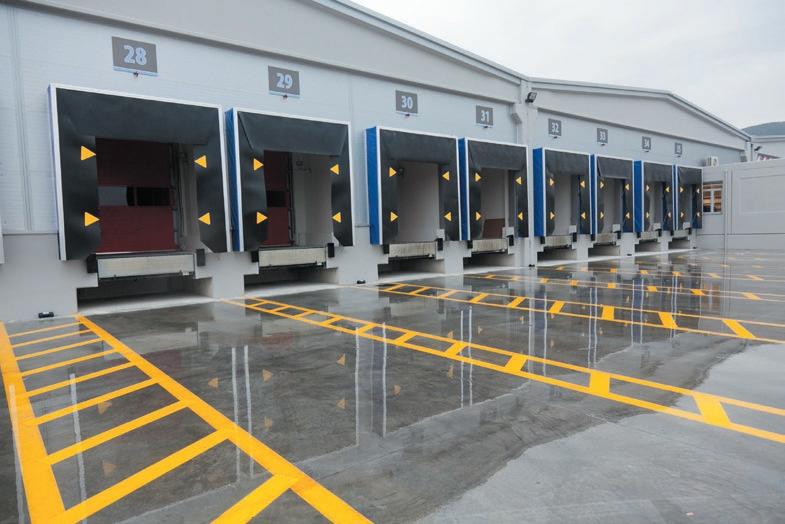
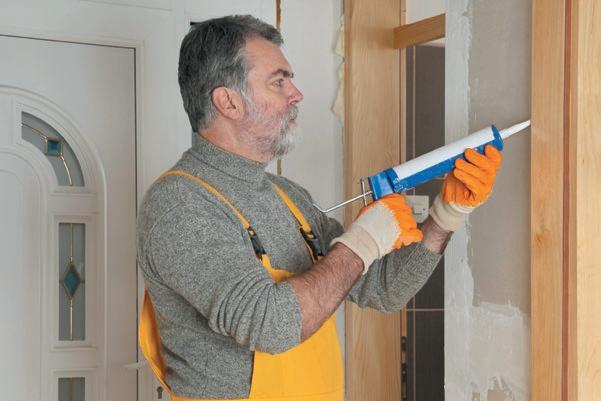
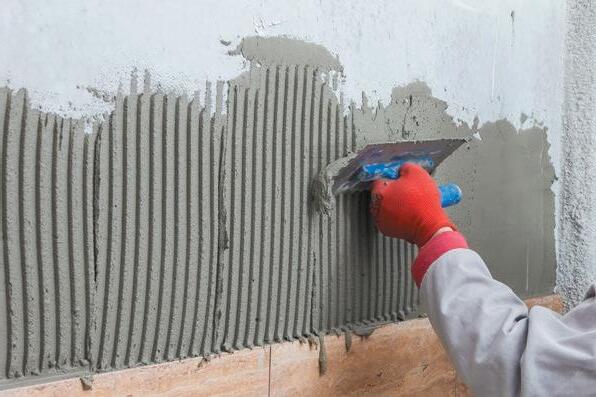
1Utama, the award-winning mall in Bandar Utama, redefines shopping, entertainment, and dining with over 800 shops, unique attractions, and ecofriendly initiatives, making it the premier lifestyle hub for everyone.
With the tagline “It’s all in one,” 1 Utama subscribes to a highly successful formula that elevates shopping, entertainment, and dining to new heights, establishing itself as the premier lifestyle hub for everyone.
Located in the MSC Malaysia Cybercentre township of Bandar Utama, this multiple award-winning mall boasts over 800 shops spread across 519,300 square metres over seven retail floors.
For easier navigation, the extensive mall is divided into various themed zones: Highstreet, LUXE, Oval, Promenade, Centre Court, Rainforest, and attractions like The Secret Garden, Sports n’ Play, The Ledge Art Gallery, and Central Park.
In addition to two departmental storesAeon and Parkson, and two cinemas - TGV and GSC Cinemas, the mall is also home to two world-class sports tourism centresFlowRider and Windlab.
FlowRider is Malaysia’s first flowriding venue in a shopping mall, while Windlab is Asia Pacific’s first indoor skydiving facility in a mall.
1 Utama also houses the 700-seater
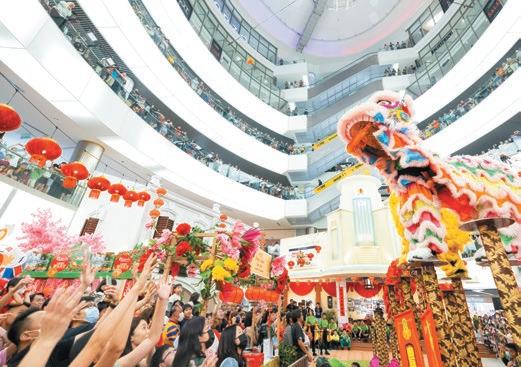
Petaling Jaya Performing Arts Centre, Asia’s largest indoor rock climbing gym, Camp5 and PADI 5-star diving centre, Sealantis.
Skating community also has their place at 1 Utama. The 1 Utama Skatepark, designed by legendary American pro skater Tim Altic, is a free outdoor facility featuring six zones of street and park skate styles, with bowls of various sizes, fun ledges, and a flat area with
obstacles like grind rails and kickers.
For a complete lifestyle experience, its other unique sports and entertainment facilities are rooftop futsal Padang, Celebrity Fitness lifestyle gym and 36 bowling lanes for Wangsa Bowl, Malaysia’s 1st integrated indoor Edutainment Themepark Next Gen, Korean Indoor skating rink Rollerwa, Morac go-karting, padel court and social club.
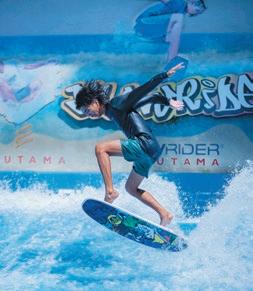
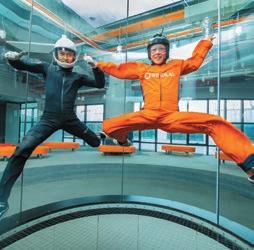
As the first green mall in the country, 1 Utama goes beyond energy-saving initiatives, rainwater harvesting, and features South East Asia’s largest on-site waste management system and the country’s largest mall solar energy installation. 1 Utama has been awarded the prestigious GreenRE Platinum certification, the highest rating under GreenRE, making it the first platinum rated mall in Malaysia.
The mall’s green and sustainable consciousness is embodied in its larger-thanlife outlets: Rainforest, Secret Garden, and 1RECYCLING CENTRE catering to ecoconscious shoppers.
The award-winning Rainforest is a lush tropical paradise with koi fish ponds, a giant fish aquarium, and a Rainbow suspension bridge.
The four-storey enclave, featuring more than 100 forest trees, including rare species from Sabah and Sarawak, took years of indepth research to build.
At the heart of the Rainforest is Treetop Adventure, a thrilling rope course that combines adrenaline-pumping challenges with breathtaking scenery, allowing adventure-seekers to traverse high above the forest floor through suspended bridges, ziplines, and more.
Another popular tourist attraction, Secret Garden is Southeast Asia’s largest rooftop garden, showcasing 500 species of exotic flora.
Each plant is specially cultivated on a bed of bio-carbon soil and meticulously nurtured by a team of renowned botanists.
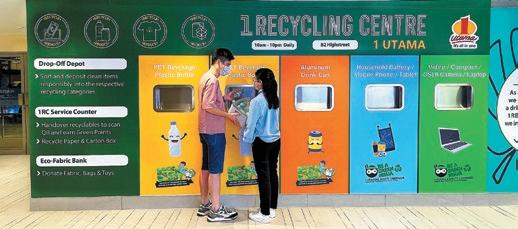
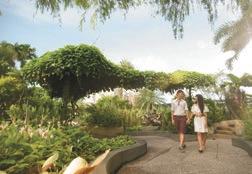
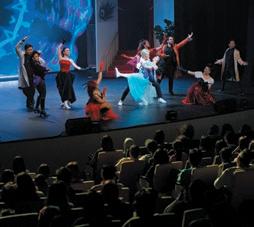
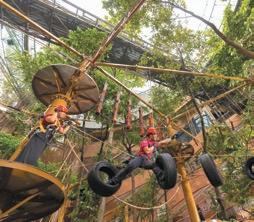
Championing a zero waste lifestyle,
1 Utama’s a one-stop recycling hub
1RECYCLING CENTRE rewards shoppers with digital Green Points through its mobile SuperApp that simultaneously tracks carbon footprint savings. The mall has also digitalised its reforestation efforts via ForestONE by planting an endangered tree for every virtual tree grown in its groundbreaking tree planting game.
1 Utama is the first mall in the world that offers a mall-wide multi-merchant loyalty programme — the ONECARD Privileges+, supporting both shopping and parking facilities. Holders of the ONECARD can earn UPoints and enjoy personalised promotions on its website (onecard.com.my).
Members also benefit from cheaper parking rates and exclusive entry to ONECARD Preferred Parking and Preferred Parking + zones.
Additionally, the mall is also the first in Malaysia to develop its own e-wallet (1PAY) and e-Commerce platform (oneshop.com. my) to drive the nation’s digital economy forward with electronic cashless payments.
Strategically located in the business hub of Bandar Utama, 1 Utama is seamlessly interconnected via comfortable covered neighbours — hotels and high-rise office towers.
As a major transportation hub, 1 Utama offers tourists and the surrounding community convenient travel options.
The mall is just a short walk away via the MRT Direct Access Link and Skywalk to the Bandar Utama MRT station with Park & Ride access, and bus and coach terminals for Rapid KL, Aeroline, Billion Star.
For those who prefer to drive, the mall provides over 10,000 car park bays spread across its multi-storey car park, the openair Dataran car park and the adjoining office towers and hotels.
Formerly known as JUSCO (Japan United Stores Company), the company rebranded as AEON, meaning 'eternity' in Latin. AEON aims to collaborate endlessly with customers, suppliers, business partners, shareholders, and the community to create a future of limitless possibilities.
Formerly known as JUSCO (Japan United Stores Company), the company rebranded as AEON, meaning 'eternity' in Latin. AEON aims to collaborate endlessly with customers, suppliers, business partners, shareholders, and the community to create a future of limitless possibilities.
28
28 35
28
Formerly known as JUSCO (Japan United Stores Company), the company rebranded as AEON, meaning 'eternity' in Latin. AEON aims to collaborate endlessly with customers, suppliers, business partners, shareholders, and the community to create a future of limitless possibilities. As of March 2024, AEON Mall had attracted 403 new tenants, including 85 rst-time tenants.
35
28 35
35
Formerly known as JUSCO (Japan United Stores Company), the company rebranded as AEON, meaning 'eternity' in Latin. AEON aims to collaborate endlessly with customers, suppliers, business partners, shareholders, and the community to create a future of limitless possibilities. As of March 2024, AEON Mall had attracted 403 new tenants, including 85 rst-time tenants.
Incorporated in Malaysia on 15 September 1984 in response to the Malaysian Government’s invitation to modernise the country’s retail industry.
Incorporated in Malaysia on 15 September 1984 in response to the Malaysian Government’s invitation to modernise the country’s retail industry.
Incorporated in Malaysia on 15 September 1984 in response to the Malaysian Government’s invitation to modernise the country’s retail industry.
Incorporated in Malaysia on 15 September 1984 in response to the Malaysian Government’s invitation to modernise the country’s retail industry.
Largest mall operator in Malaysia with 28 AEON Malls nationwide. Total Net Lettable Area of 13.4m sq ft (as at March 2024).
Largest mall operator in Malaysia with 28 AEON Malls nationwide. Total Net Lettable Area of 13.4m sq ft (as at March 2024).
Largest mall operator in Malaysia with 28 AEON Malls nationwide. Total Net Lettable Area of 13.4m sq ft (as at March 2024).
Largest mall operator in Malaysia with 28 AEON Malls nationwide. Total Net Lettable Area of 13.4m sq ft (as at March 2024).
As of March 2024, AEON Mall had attracted 403 new tenants, including 85 rst-time tenants.
As of March 2024, AEON Mall had attracted 403 new tenants, including 85 rst-time tenants.
Leading supermarket chain with 35 AEON Stores, 6 MaxValu, 62 AEON Wellness and 44 DAISO outlets across the country. AEON accelerates the country’s economic engine as the backbone of modern Malaysian retail.
Leading supermarket chain with 35 AEON Stores, 6 MaxValu, 62 AEON Wellness and 44 DAISO outlets across the country. AEON accelerates the country’s economic engine as the backbone of modern Malaysian retail.
Leading supermarket chain with 35 AEON Stores, 6 MaxValu, 62 AEON Wellness and 44 DAISO outlets across the country. AEON accelerates the country’s economic engine as the backbone of modern Malaysian retail.
Leading supermarket chain with 35 AEON Stores, 6 MaxValu, 62 AEON Wellness and 44 DAISO outlets across the country. AEON accelerates the country’s economic engine as the backbone of modern Malaysian retail.
62 44
Guided by its “Customer First” philosophy, AEON believes that its enduring commitment to innovation, excellence, and customer-centricity are recipes for its four decades of success.
Guided by its “Customer First” philosophy, AEON believes that its enduring commitment to innovation, excellence, and customer-centricity are recipes for its four decades of success.

























All new malls will be designed and planned in accordance with the GreenRE checklist and guidelines. This is to establish environmentally friendly practices for the planning, design and construction of buildings, which would help to mitigate the environmental impact of built structures. 6 62 44
Continuously strengthening its environmental accountability by operating responsibly and contributing to a greener planet. Successfully planted more than 550,000 trees since 1984.
Continuously strengthening its environmental accountability by operating responsibly and contributing to a greener planet. Successfully planted more than 550,000 trees since 1984.
All new malls will be designed and planned in accordance with the GreenRE checklist and guidelines. This is to establish environmentally friendly practices for the planning, design and construction of buildings, which would help to mitigate the environmental impact of built structures.
All AEON malls will be installed with rooftop solar photovoltaic (PV) systems in stages. Target to be carbon neutral by 2040.
All AEON malls will be installed with rooftop solar photovoltaic (PV) systems in stages. Target to be carbon neutral by 2040.
Malaysia’s retail sector has seen a significant transformation in recent years, driven by technological progress, the emergence of new shopping malls, changing consumer preferences, and an increased focus on sustainability. CapitaLand Investment (CLI) has been instrumental in this shift, managing seven malls throughout Malaysia. By reimagining its malls as lively destinations for socialising, shopping, dining, and entertainment, CLI aims to provide more than just retail spaces, creating unique experiences that benefit both shoppers and tenants.
To stay competitive amidst rapidly changing shopping and lifestyle trends, CLI strategically selects its tenants to appeal to the wide range of demographics that visit its malls. The company continuously looks for new and creative ways to engage its audience, offering distinctive concepts and experiential lifestyle options that captivate visitors.
In the northern region, Gurney Plaza and Queensbay Mall are prominent examples
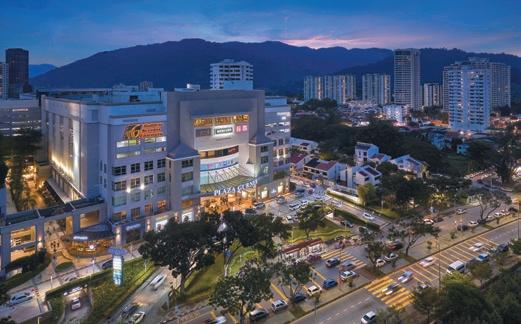
within CLI’s Malaysian portfolio. These malls successfully combine popular brands, exceptional services, digital innovations, and distinct placemaking events to deliver memorable experiences. The Gurney Food Hall at Gurney Plaza and Queens Street at Queensbay Mall are especially popular, featuring a variety of culinary choices that draw both local and international guests.
These malls regularly upgrade their amenities to provide a comfortable and high-quality experience for all patrons.
East Coast Mall is also proactive in refreshing its food and beverage, and retail offerings by introducing well-known regional and international brands such as Calvin Klein, Tommy Hilfiger, Uniqlo, and Victoria’s Secret. The mall is currently undergoing a
major refurbishment exercise, improving essential facilities like restrooms and prayer rooms, and redesigning its retail spaces to better serve customer needs.
In Malaysia’s competitive retail environment, CLI is committed to continuously updating and repositioning its malls to meet the changing demands of shoppers. In Klang Valley, 3 Damansara and The Mines have launched the initial phase of their asset enhancement projects, transforming into community centers with everyday-life features. At 3 Damansara, the addition of leading supermarket chain NSK Grocer, along with a recent asset enhancement on the lower ground floor, has expanded food and beverage options as well as service offerings for the surrounding community. Both malls are scheduled for further improvements and new offerings in the near future.
Redefining the shopping experience and pushing the limits are central to CLI’s asset management strategy. To foster deeper shopper engagement and loyalty, CLI forms partnerships to bring unique experiential events and “retail-tainment” to its malls,
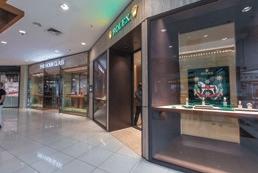
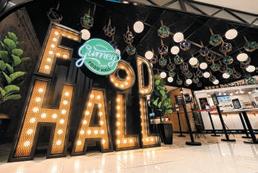
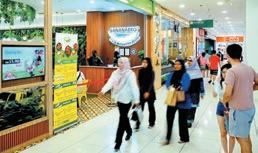
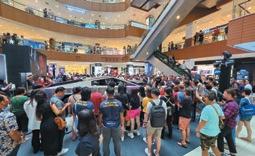
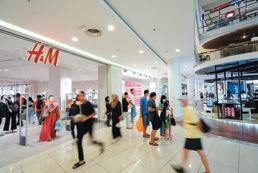
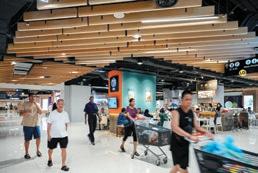
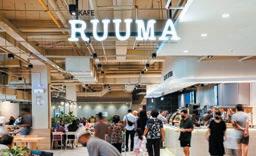
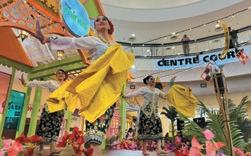
leaving a lasting impression on visitors. A notable recent initiative is the collaboration with Tesla Malaysia, which launched the first Tesla showcases featuring the Cybertruck in Penang at Gurney Plaza and Queensbay Mall in 2024.
Sustainability is a core focus of CLI’s operations. With consumers increasingly favouring brands committed to sustainable practices, most of the CLI-managed properties in Malaysia are green certified. The Mines has recently secured 7.2 megawatts of renewable energy through the Corporate Green Power Programme, aligning with CLI’s objective to source 45% of its electricity from renewable sources and achieve net-zero carbon emissions for Scope 1 and 2 by 2050, as outlined in CLI’s 2030 Sustainability Master Plan. Collective action is crucial to CLI’s decarbonisation efforts, and it has introduced a green lease program to encourage tenants to adopt sustainable practices.
CLI continues to make a positive impact on the communities it serves. Since 2011, with support from CapitaLand Group’s philanthropic arm, CapitaLand Hope Foundation, CLI has aided over 13,500 beneficiaries in Malaysia through donations exceeding RM2.4 million. The #GivingBersama initiative, launched in 2021, has united CLI employees, tenants, business partners, and the community to support underserved groups in Malaysia. In recognition of its efforts, CLI has been honored at the Sustainability and CSR Malaysia awards for three consecutive years for its support of orphanages.
As Persatuan Pengurusan Kompleks Malaysia (PPKM) commemorates its 40th anniversary, CapitaLand’s commitment to innovation, community, and sustainability continues to set the standard in the retail industry, paving the way for a brighter future in Malaysia’s shopping landscape.
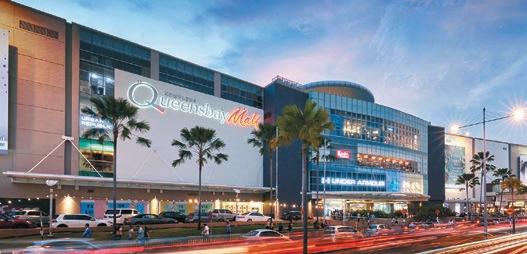
Central i-City, the crown jewel of i-City in Shah Alam, Selangor, stands as a transformative force in the retail and entertainment landscape, transcending the ordinary mall experience.
Spanning a massive 1.5 million square feet, this premier shopping destination has redefined what it means to shop, dine, and play since its grand opening in 2019. Positioned strategically within the Golden Triangle of Selangor—a region contributing 25% of Southeast Asia’s thirdlargest economy—Central i-City is more than just a mall; it’s a vital part of Central Pattana’s global strategy and a beacon of growth for the surrounding area.
As Central Pattana’s first overseas retail venture, Central i-City was meticulously planned to tap into the dynamic potential of the region. It has since become a hub of activity, not just for shopping but for community engagement. The mall’s commitment to the local community is evident in its partnerships with organisations like the Selangor Seed Community and cultural associations, and its hosting of over 20 community events in the past year alone, providing platforms for local talent to shine.
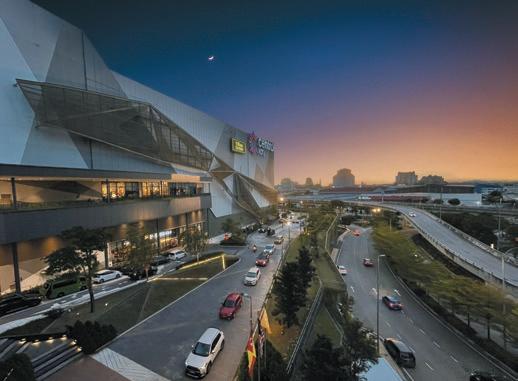
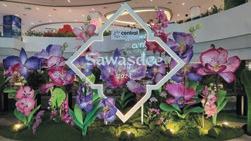
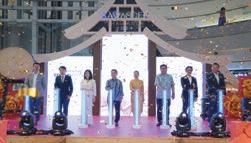
This community focus is complemented by its Thai-inspired design, which pays homage to its origins while offering a distinct identity under the ‘Thainess to The World’ concept. The mall features renowned Thai brands like Bar B Q Plaza and Cha Tra Mue, further setting it apart from competitors.
Central i-City is home to 365 premium retail stores, including anchor tenants like the fourlevel SOGO department store, Village Grocer, and TGV Cinemas, which boasts nine halls, including an IMAX hall with the largest Samsung Onyx LED screen in Southeast Asia. The mall’s extensive dining options, from Palace 8, BBQ Town, Sukiya, Chong Kok Kopitiam, NALE and Chagee Flagship store, offer something for every palate. The six-storey building, with a net lettable area of approximately 940,000 square feet, caters to all age groups, making it a comprehensive destination for families, tourists, and locals alike.
Central i-City’s location within the 72-acre i-City technology and lifestyle hub, just 22 km from Kuala Lumpur, positions it as a worldclass tourist destination. The mall is also poised for future growth with the upcoming LRT 3, which will enhance its already excellent
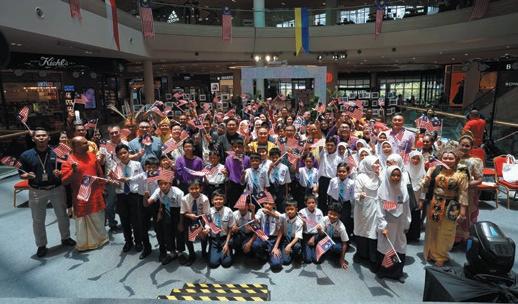
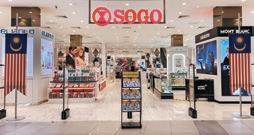
connectivity via the Padang Jawa KTM station and free Selangor buses. By 2025, Central i-City will be even more accessible, further solidifying its role as a cornerstone of Selangor’s retail and entertainment offerings.
Built with an estimated investment of RM850 million, Central i-City is equipped with top-notch facilities to ensure every visit is a memorable experience. From a three-level
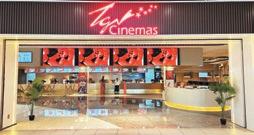
underground car park with a free buggy service to dedicated amenities for families, including baby strollers and wheelchair, power scooters facilities, the mall is designed with convenience and comfort in mind. The presence of a luxury hotel, Double Tree by Hilton, which enjoys an 80% occupancy rate, and the Maybank Tower with a 90% occupancy rate, further enhance the mall’s appeal as a destination for both business and leisure.
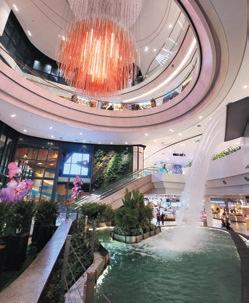
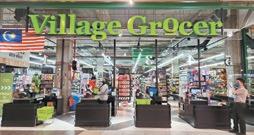
In summary, Central i-City is not just a shopping mall; it is a dynamic, ever-evolving destination that brings together the best of retail, dining, and entertainment under one roof. Its blend of Thai-inspired design, community focus, and strategic location makes it a unique and essential part of the region’s growth and development, poised to unlock Selangor’s full potential and beyond.
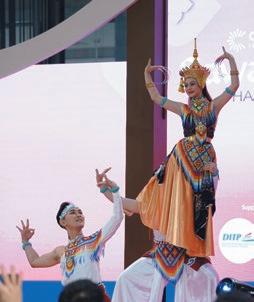
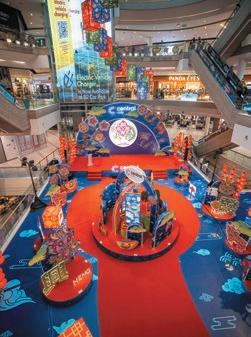
For almost 34 years, Centre Point Sabah Shopping Mall stands as a symbol of retail excellence and transformation in Sabah.
As the first major shopping mall in the region to be owned by a company with foreign investment — specifically Taiwanese ownership through Pan-Pacific Construction Holdings (PPCH) Sdn. Bhd.— it represents a significant milestone in Sabah’s retail history. The mall’s influence is further underscored by the naming of “Jalan Centre Point”, a street that bears its name, reflecting its deep-rooted impact on the community.
Originally designed as a 5-star hotel, Centre Point Sabah underwent a remarkable transformation when the PPCH Group took ownership. The vision was clear: to create a shopping mall that would become the heartbeat of Kota Kinabalu. Today, the mall has achieved this and more, evolving into a beloved destination for both locals and tourists alike.
With the most shops opening among other shopping malls in Sabah, Centre Point Sabah is unparalleled in its retail offerings. The mall features an eclectic mix of over 500 stores, catering to diverse tastes and preferences, ensuring that every visitor finds something special. Its strategic location in the heart
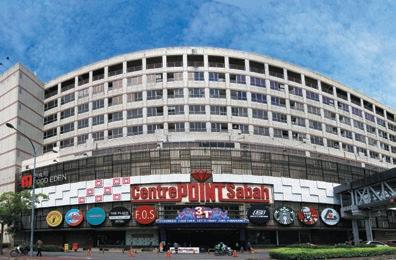
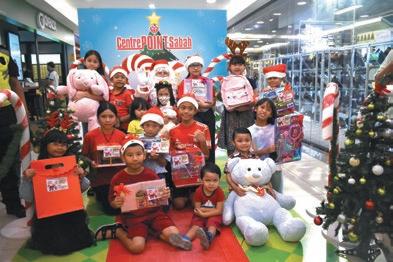
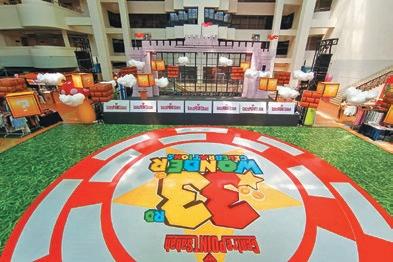
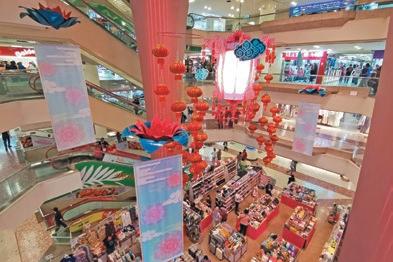
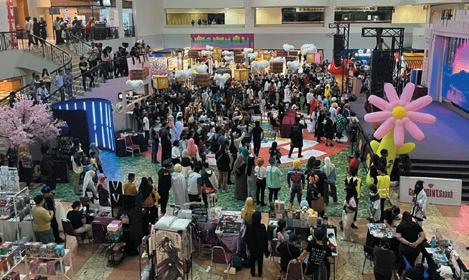
of Kota Kinabalu enhances its accessibility, making it a central hub for shopping, dining, and entertainment.
In addition to its extensive retail space, Centre Point Sabah houses office towers from the 5th to the 9th floors, hosting some of Malaysia’s top companies. Notable tenants include Ernst & Young, World Wide Fund (WWF) Malaysia, Orix Leasing, the Human Rights Commission of Malaysia (SUHAKAM), Saham Sabah, Tengis Corporate, and various law firms. The mall also accommodates some Kota Kinabalu City Hall (DBKK) offices on the 7th Floor of the Carpark Block, supplementing their main headquarters located on Gaya Street.
Centre Point Sabah is also home to the largest food court in Sabah, renowned for its variety and quality. Among its standout offerings is the Nasi Ayam CP (Chicken Rice), a local favorite beloved by patrons of
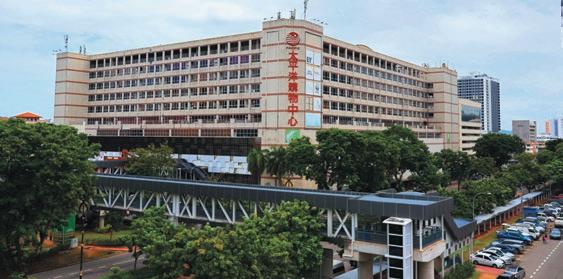
all ages. This signature dish, celebrated for its rich flavors and tender chicken, has become a culinary icon, drawing food enthusiasts from across the region. Whether seeking local delicacies or international cuisine, visitors are treated to a dining experience that is second to none.
Centre Point Sabah Shopping Mall is more than just a shopping destination; it is a vibrant hub for community engagement and entertainment.The mall regularly hosts a variety of large-scale events that draw significant crowds, such as the annual CPS Blood Donation, which has successfully gathered nearly 1,000 blood pints in a single day. Other popular events include the Eggsmania during Easter- attracting 1,700 participants; and the Kids Halloween event, which sees almost 2,000 participants. Additionally, the mall celebrates key cultural and festive occasions like Chinese
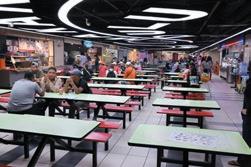
New Year, Harvest Festival Kaamatan, its mall’s anniversary, and Christmas, further solidifying its role as a central gathering place for the community.
Looking to the future, Centre Point Sabah is dedicated to advancing its sustainability efforts. As the first mall in Sabah to introduce an Electric Vehicle (EV) charging station, it caters to the needs of eco-conscious shoppers and sets a precedent for green practices. Future plans include launching a recycling station to enhance public recycling efforts, implementing a comprehensive food waste
management system, and installing solar panels to harness renewable energy and reduce the mall’s carbon footprint. These initiatives reflect the mall’s commitment to leading sustainable retail practices while continuing to deliver an exceptional shopping experience.
To remain competitive in the everevolving retail landscape, Centre Point Sabah focuses on continuous innovation and exceptional customer service. By investing in the latest retail technologies, curating a diverse and balanced tenant mix, and prioritizing customer feedback, the mall ensures it remains a preferred shopping destination. This proactive approach enables Centre Point Sabah to meet the needs of today’s shoppers while anticipating future trends, reinforcing its legacy of excellence and promoting its appeal beyond Sabah to other regions in Malaysia.
PPB Properties is redefining the shopping mall experience by focusing on community engagement, sustainability, and innovative digital solutions, transforming its flagship malls into vibrant hubs where people can connect and local businesses can thrive.
PPB Properties, the management of a renowned collection of five shopping malls, has set its sights on transforming these placemaking spaces into vibrant community hubs where the communities can congregate and bond.
To achieve this goal, the company plans to host more creative events and collaborations with unique partners and stakeholders, while prioritising green and sustainability initiatives in event planning across all its malls.
PPB Properties’ flagship retail locations are Cheras LeisureMall and The LINC KL in Kuala Lumpur, Megah Rise Mall in Selangor, as well as New World Park and The Whiteaways Arcade in Penang.
As a people and community-centric developer since its establishment in 1982, PPB Properties aims to engage closely with the local communities surrounding its neighbourhood malls.
With the rise of digitalisation, these malls now employ a fully cashless car park system

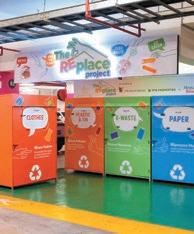
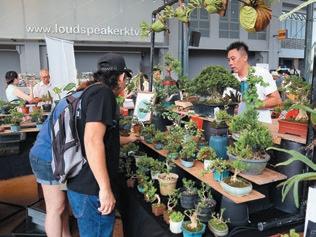
and a digital maintenance system for both shoppers and tenants to lodge complaints.
As a support to local business, PPB Properties’ malls provide platforms like seasonal bazaars and charitable events to
highlight unique local businesses.
Community events like health fairs, blood donation drives, traditional Chinese medicine (TCM) and many more are also held throughout the year.
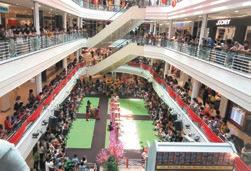
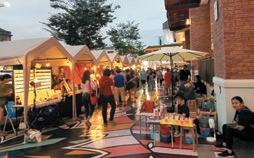
Going along with sustainable shopping trends, which have influenced consumer behaviour and spending patterns, PPB Properties has initiated several green projects.
All its Klang Valley malls host recycling bins for the Beautiful Gate for the Disabled Foundation, with proceeds channelled towards the home. These malls also have EV charging bays and car sharing.
Notably, The LINC KL was built around seven large pre-existing trees, using ecofriendly materials like clay bricks and recycled tiles. The mall also features large windows and open courtyards to promote indooroutdoor harmony and energy conservation.
At Megah Rise Mall, the company runs The REplace Project, which includes a recycling area, public book-sharing corner, a smart urban farm that donates organic fresh produce to needy homes, as well as EV charging bays all under a single initiative.
Following the success of this project, PPB Properties plans to introduce The REplace Project across all malls, with a urban farm at The LINC KL
For Cheras LeisureMall, the company plans to replace old solar panels and install additional ones as part of its energy-saving initiatives.
PPB Properties strives to improve its energy and water efficiency with energy audits, transitioning to fully LED lighting across its malls, and implementing more responsible waste management practices.
• Cheras LeisureMall
Established in 1994, Cheras LeisureMall has been a central hub for Cheras residents.
Four decades o F excellence • A
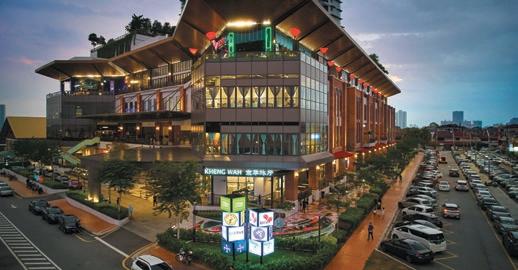
Celebrating its 30th anniversary this year, this neighbourhood-centric, family-friendly mall caters to the community with a range of exciting events. Addressing the community’s desire for diverse food options, the mall has expanded its F&B offerings with a new food court and eateries. The mall will be undergoing asset enhancement works which include creating more alfresco dining areas, upgrading several entrances, installation of new solar panels on the rooftop.
Featuring a unique architectural design with its distinctive red brick façade, the neighbourhood mall is a pet-friendly, placemaking space designed for the community of Taman Megah in Petaling Jaya, Selangor. Its tenancy mix is curated to fill gaps in the market and cater to the local community’s needs, including high-end restaurants and bars. Built on the site of a former badminton court, Megah Rise Mall
has reinstated the same operator to manage its six indoor badminton courts.
• The LINC KL
Winner of FIABCI Malaysia Property Award, this unique nature-inspired mall is decorated with vibrant art installations. Located in the heart of Kuala Lumpur, The LINC KL actively hosts artistic events supporting homegrown brands, local artists and students.
• New World Park
A foodie haven in the centre of George Town, New World Park offers a variety of F&B options under one roof, attracting both Penangites and out-of-towners.
• The Whiteaways Arcade
The Whiteaways Arcade, situated along the scenic Beach Street, is a UNESCO Heritage building that houses office spaces, F&B outlets and large event spaces.
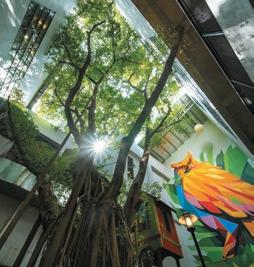
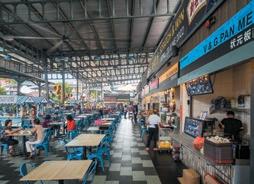
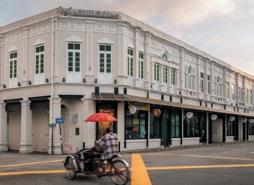
Set to transform the Ampang and Gombak communities, Datum Jelatek Shopping Centre and Residence combine luxury living with vibrant cultural experiences. With its strategic location, innovative design, and a host of unique attractions, this integrated development is fast becoming a focal point for both locals and tourists in the Klang Valley.
The 47,000-square-metre Datum Jelatek Shopping Centre at Jalan Jelatek in Kuala Lumpur is poised to become the premier urban lifestyle hub for the communities of Ampang and Gombak.
Opened in December 2022, this fivestorey mall is thoughtfully designed to serve as both a gourmet sanctuary and a familycentric centre, offering 115 shoplots and 55 kiosks filled with a wide range of familyfriendly F&B, entertainment and retail offerings.
It also houses an all-in-one child enrichment and edutainment centre, catering to the needs of families in the surrounding areas.
The shopping centre is anchored by several prominent tenants, including The Food Merchant, MR. DIY, Bouncing Kids World,
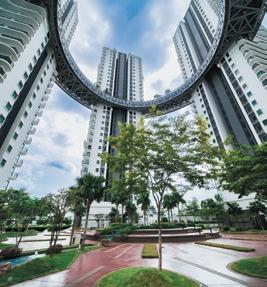
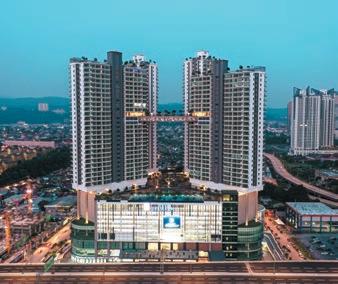

the family karaoke centre Loud Speaker, and the Thai massage centre Thai Odyssey.
Almost half of its tenant mix consists of restaurants and bistros, underscoring the mall’s ambition to become a culinary haven for the local communities.
Some of these dining options include Hadramawt Kitchen, Locca Cafe, Mee Hiris China Muslim, Richiamo Coffee, and Ayam Penyet Best, all of which promise to tantalise the taste buds of visitors.
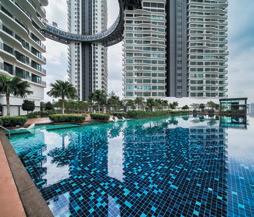
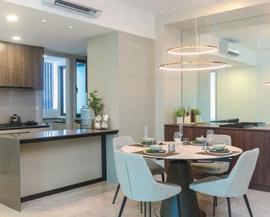
An integrated complex
Datum Jelatek Shopping Centre is part of the RM1.2 billion Datum Jelatek integrated development, developed by DatumCorp International Sdn Bhd, a wholly-owned subsidiary of the Perbadanan Kemajuan Negeri Selangor.
The development also features Datum Jelatek Residence, a complex of four interconnected blocks housing a total of 712 apartments.
These residential blocks are linked by Malaysia’s first sky-ring bridge, offering panoramic views of the Kuala Lumpur city skyline and further enhancing the appeal of this modern urban development.
“Datum Jelatek – both the shopping centre and the residence – is set to become a focal point for the community, reflecting the company’s motto, ‘Bridging the Community’.
She adds, “The covered 30-metre airconditioned bridge that connects the complex directly with the Jelatek LRT Station ensures the comfort and safety of our residents and visitors.”
Strategically located within walking distance of the city’s famous Embassy Row, where most foreign embassies and office towers are situated, as well as a medical centre and a mix of luxury, medium, and low-cost neighbourhoods, Datum Jelatek embodies the essence of urban living, where connectivity and lifestyle options are within easy reach.
The Datum Jelatek complex has received several accolades, including a Silver rating from the Green Building Index (GBI) – the nation’s first comprehensive rating system
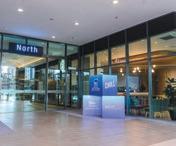
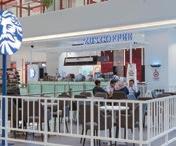
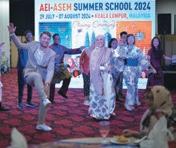
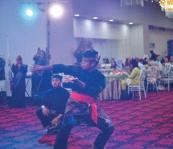
for evaluating the environmental design and performance of buildings.
The development maximises efficient ventilation, promotes natural lighting, and incorporates rainwater harvesting systems to sustain an eco-friendly living environment.
Datum Jelatek’s strategic location on the outskirts of the city centre makes it a prime candidate to become a new tourist attraction in the Klang Valley.
Its unique, award-winning architectural design and value-added amenities have positioned Datum Jelatek as a burgeoning tourism hub, offering an array of innovative tourism products.
Among these offerings are the KL City
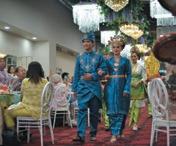
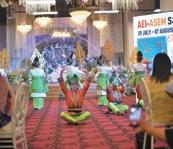
Tour Packages, the Visit and View Datum Jelatek Tour Programme (VVDJ), Malaysia Datum Cultural Centre, and event spaces by Temu Jelatek, as well as several other tourism initiatives currently under development.
As a Tourism Centre of Excellence, Datum Jelatek is expected to draw a diverse range of tourists, both local and international, over the next five years.
This influx of visitors is anticipated to enhance the quality of life for the communities in its vicinity and contribute to the area’s economic growth.
In its efforts to solidify its reputation as a Tourism Centre of Excellence, Datum Jelatek goes the extra mile by offering a unique
tourism product that complements the city’s existing cultural and heritage tourism attractions.
The Malaysia Datum Cultural Centre (MDCC) is a distinctive dining hall that serves authentic local cuisine and hosts cultural performances, including traditional Malaysian wedding ceremonies.
This initiative is the result of a collaborative effort between Datumcorp and the Ministry of Tourism, Arts & Culture, Tourism Malaysia, Tourism Selangor, and the Malaysia International Tourism Development Association (MITDA).
Upon its full completion, the MDCC will provide a range of services, including a tourist coach station for the KL City Tour Package, a cultural and handicraft venue featuring kiosks offering traditional Malaysian handicrafts, and guided tours to the city’s latest hot-spot locations – Datum Jelatek’s very own Infinity View and Sky Ring View.
The centre will also assist with serviced apartment lodging for tourists and support the Malaysia My 2nd Home (MM2H) programme.
Currently, the MDCC offers exclusive packages for lunch and dinner, providing tourists with a delicious taste of Malaysian cuisine while they enjoy vibrant cultural performances.
Patrons will also have the opportunity to take home gifts and souvenirs as mementos of their visit, ensuring that their experience at Datum Jelatek is both memorable and enriching.
In a world where change is the only constant, businesses require innovative, data-driven strategies that go beyond traditional methods. ERA Group, formerly known as Expense Reduction Analysts (ERA), is at the forefront of this transformation, offering cutting-edge solutions that empower businesses to thrive in today’s competitive landscape.
• No Savings, No Fee: At ERA Group, we stand by our results. Our fee is contingent upon the savings we achieve for you, ensuring that our interests are aligned with yours.
• Expertise in Action: We allocate seasoned experts, each with deep industry-specific knowledge, to work on every cost category at no additional cost. This means you receive top-tier expertise without stretching your resources.
• Focus on Your Priorities: Our team handles the heavy lifting of implementation, allowing your staff to concentrate on core business activities and other strategic priorities.
• Revolutionising Cost Optimisation: Our revolutionary cost optimisation model covers over 50 expense categories, ensuring comprehensive financial transformation. We leave no stone unturned in the pursuit of uncovering every potential area for savings and efficiency.
• Uncover Hidden Revenue Streams: Our expertise enables us to identify untapped revenue opportunities within your business, potentially adding millions to your bottom line. By leveraging our insights, you can unlock new avenues of growth and profitability.
Since our founding in 1992, ERA Group has evolved into a global consultancy powerhouse with operations in over 50 countries across 6 continents. Our network of more than 1,000 professionals brings deep industry expertise to over 50 cost categories and hundreds of subcategories, allowing us to deliver insights and solutions beyond the reach of most businesses.
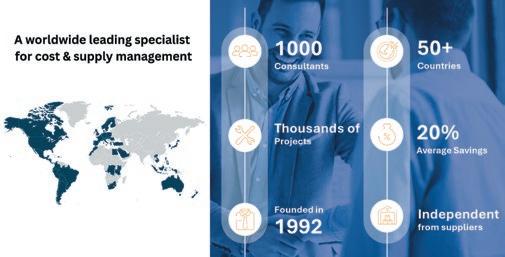
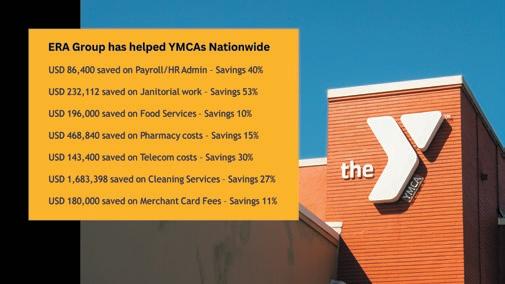


While our reputation is built on cost optimisation, our value proposition extends far beyond savings. ERA Group partners with business leaders to tackle pressing challenges and uncover opportunities for growth. Through data analytics and the insights of the world’s most knowledgeable specialists, we help clients improve processes, enhance efficiency and drive sustainable growth.
Our latest innovation, SpendVue, empowers business leaders to identify actionable areas for cash flow improvement. By leveraging proprietary data from tens of thousands of projects worldwide, SpendVue enables informed decision-making that directly impacts the bottom line.
ERA Group’s unwavering commitment to client satisfaction is evident in our track record across diverse industries, including retail, facilities management, financial services and more. Our clients benefit from our ongoing investments in new systems, tools and technology, as well as our best-inclass implementation practices.
ERA Group stands as a trusted partner for leaders who are navigating new horizons, facing unforeseen challenges and seeking new opportunities. With a global team of thinkers and doers, we bring diverse perspectives and deep vertical and functional expertise to spark change and drive success. ERA Group is committed to its core mission:
to help organisations grow, build competitive advantage, and drive bottom-line impact. We are well-equipped to guide today’s modern leaders towards a prosperous future.
For over 30 years, ERA Group has been a pioneer in business strategy and cost optimisation. We leverage data analytics and industry specialists to help clients turn insights into opportunities for growth. With over €12 billion spend under review globally, ERA Group is the resource today’s leaders need to navigate a rapidly changing landscape.
Please contact: ccheng@eragroup.com to arrange for a complimentary consultation.
For more: information, please visit www.eragroup.com
“When I first came across Expense Reduction Analysts (now ERA Group), I was captivated by its unique proposition which is a total revelation in this turbulent business landscape. Cost reduction and profit optimisation with the promise of “No Savings, No Fee” is really a dream come true!
There is a crucial link between personal and financial resilience and I saw an opportunity to empower organisations to thrive. Building resilience is not just for individuals but for businesses because financial strength opens the door to infinite possibilities, creating a ripple effect of positive change.
Every savings we make is a dream nurtured, opening doors to infinite possibilities… unlocking individual potential, fortifying the financial backbone for organisations, catalysing lasting social and environmental impact for our community.
It is not just about saving costs, it is about creating a ripple effect to positive change and impacting the future!”
— Candice Cheng, National Director
Nestled in the highlands of Malaysia, Resorts World Genting (RWG) stands as a beacon of luxury, entertainment, and natural beauty. Founded in 1965 by the visionary Tan Sri Dato’ Sri (Dr.) Lim Goh Tong, RWG has transformed from a modest venture into a premier integrated resort destination in Malaysia, attracting millions of visitors from around the world.
RWG’s allure is accentuated by a breathtaking, 130-million-year-old pristine rainforest. This lush and natural environment not only provides a picturesque landscape, but also contributes to the resort’s comfortable climate with temperatures ranging from 16 to 24 ˚ throughout the year. This refreshing coolness provides a welcomed escape from the tropical heat of Malaysia’s lowlands.
The resort is home to approximately 10,500 rooms spread across seven distinct hotels, each offering its own unique charm. Among these, the First World Hotel is a standout and is recognized by the Guinness Book of Records as the World’s Largest Hotel. Meanwhile, Crockfords Hotel is the only hotel in Malaysia to receive a prestigious fivestar rating from Forbes Travel Guide for six consecutive years, reflecting its commitment to exceptional service and luxury.
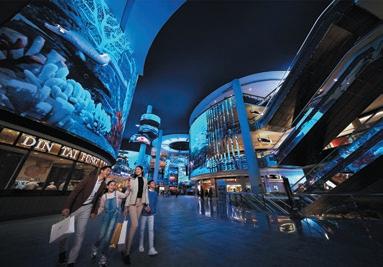
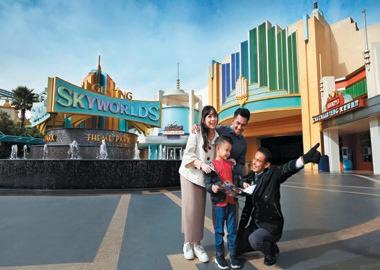
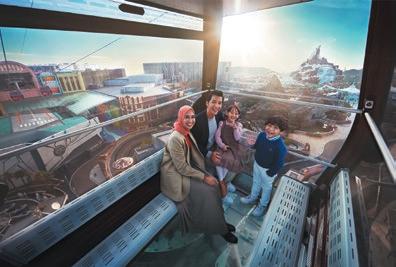
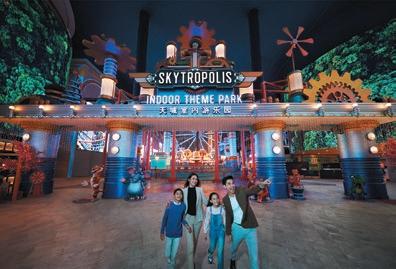
Beyond its impressive accommodations, RWG is a hub of leisure and entertainment. It features numerous attractions, including the Skytropolis Indoor Theme Park and the Genting SkyWorlds Outdoor Theme Park. For those seeking excitement, the resort offers a range of gaming options and delectable dining experiences.
Reaching RWG is convenient, with many flexible options such as private cars, buses, and the Awana SkyWay Cable Car. The latter offers a scenic ride up to the resort. The ease in connectivity makes RWG accessible for both locals and tourists, further enhancing its appeal as a getaway destination.
The resort attracts a total footfall of over 1.8 million visitors monthly, reflecting its status as a popular stop for both locals and international travellers. Families, couples, and individuals alike flock to RWG for a refreshing break from the hustle and bustle of city life, drawn by the cool, fresh air and the multitude of activities available.
At the heart of RWG’s entertainment and leisure offerings are its four world-class malls: SkyAvenue, First World Plaza, Awana SkyCentral, and Genting Grand Complex. Situated 6,000 feet above sea level, these malls are a shopper’s paradise, boasting a vibrant retail scene that caters to every taste and budget. With over 350 outlets, including a mix of international and local brands, SkyAvenue and its sister malls offer an unparalleled shopping experience.
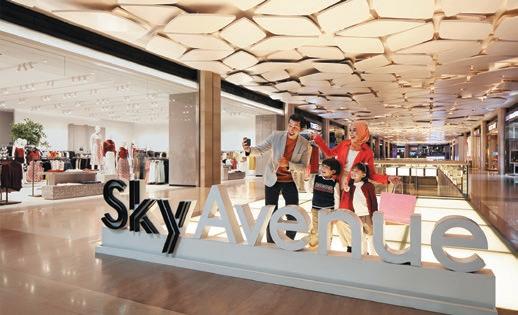
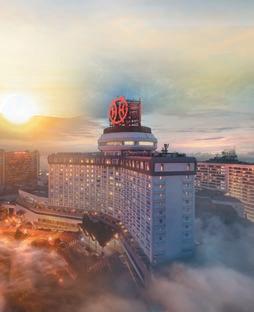
SkyAvenue, in particular, serves as the central hub of RWG, connecting visitors to the many attractions and activities within the resort. More than a shopping destination, SkyAvenue serves as a gateway to entertainment options such as theme parks, gaming zones, arcades, and live concerts.
The diverse retail offerings ensure that whether you’re in search of luxury brands or everyday essentials, there’s something for everyone. This ever-evolving shopping landscape continues to keep visitors engaged with exciting new tenants and emerging trends. From high-end boutiques to affordable fashion, RWG’s malls cater to all preferences and backgrounds.
Dining at RWG is equally exquisite, with a plethora of options ranging from gourmet restaurants to casual eateries to satiate every palate. The culinary experiences available complement the retail and entertainment options, making the resort an ideal destination for a day out or a longer stay.
RWG stands as a testament to Malaysia’s hospitality and entertainment prowess. From its luxurious accommodations and sprawling shopping complexes to its thrilling theme parks and diverse culinary options, RWG offers a world-class experience in a stunning natural setting. It’s a destination where luxury meets adventure, and where every visit promises to be memorable.
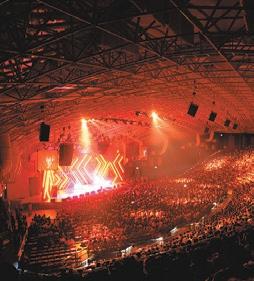
Nestled within Putrajaya’s IOI Resort City, IOI City Mall stands as a colossal shopping destination, holding the title of Malaysia and Southeast Asia’s largest mall, and soon to be the largest in the world.
The award-winning IOI City Mall, located within the IOI Resort City in Putrajaya, holds a stellar list of superlative titles not only by Malaysia’s standards but also regionally and globally.
Covering a vast 23.2 hectares of retail space - a sheer size that is equivalent to about 22 football fields, the mall is not only the largest mall in Malaysia and Southeast Asia but also the third largest in the world.
Upon completion of its upcoming Phase 3 expansion by 2029, IOI City Mall is set to become the largest mall in the world, stretching to 32.5 hectares of net lettable area.
This Green Building Index (GBI) certified mall also houses the country’s largest cinema, with 26 screens.
However, the sprawling mall is not resting on its laurels. To maintain its status as a premier shopping destination, the mall
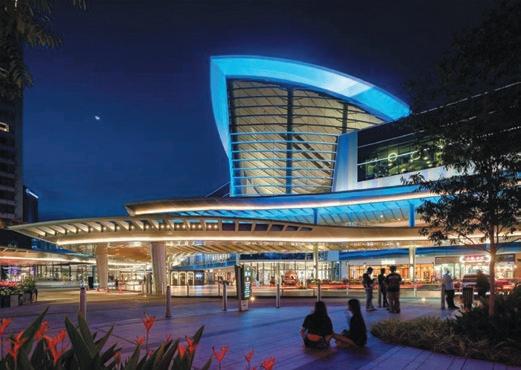
plans to stay ahead of trends and continually enhance the shopper experience.
With over 700 stores across its three floors, shopper’s fatigue is inevitable. To address this, the mall is set to implement strategic layout designs and wayfinding solutions to make
navigation easier and create engaging zones to improve the overall shopping experience.
The management is also boosting services by increasing the availability of wheelchairs and battery-operated scooters, as well as expanding storage facilities for tourists and guests.
Going by its tagline “Taste, Trends, Adventures”, the mall is introducing new dining options, affordable luxury fashion brands, unique cinema experiences, and innovative entertainment venues to go in line with the latest trends.
Forecasting the growth of omnichannel shopping, with shoppers increasingly using online, on-site, and mobile channels to make purchasing decisions, the mall has its eyes on enhancing its in-mall experience and creating a seamless integration between physical and digital presence.
The creation of a one-stop automotive centre with 4S facilities for major brands like Proton and Toyota will further enhance its comprehensive service offerings.
To align with the lifestyle hub trend, the mall strategically allocates its retail space based on market trends and consumer insights: 30% is dedicated to Food and Beverage, 40% to Fashion and Lifestyle, and the remaining space is reserved for anchor tenants, digital, entertainment, home and living, wellness, and automotive sectors.
To stay competitive in the evolving retail
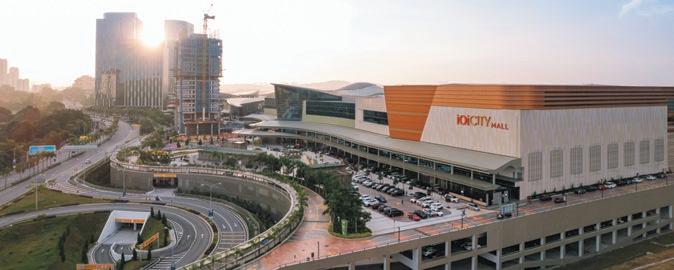
landscape, sustainability remains a core focus for IOI City Mall.
The GBI certification puts the mall at the forefront of sustainable practices, boasting the largest solar power system for a single retail location in Malaysia, with 8,910 PV solar panels installed on its rooftop.
This system generates approximately 381 megawatts of electricity per month, significantly reducing its reliance on external power sources.
Additionally, the mall employs a rainwater harvesting system for washroom flushing and landscaping, and employs motion sensor lighting in back staircases to conserve energy.
The use of two thermal storage tanks with a total volume equivalent to 16.5 Olympic-sized swimming pools highlights its innovative approach to energy efficiency, charging chilled water during off-peak hours to avoid maximum demand charges.
IOI City Mall does not only impress with its immensity and sustainability practices, it also dazzles with a long list of unique attractions.
Among the highlights is IOI City Farm, an indoor zoo that is home to 111 species of plants, 17 species of animals, and over 50 freshwater aquatic species.
The indoor edutainment space offers visitors - young and old - an interactive way to learn about the environment.
Another exciting feature is District 21 - an apocalypse-themed indoor adventure park that offers adventure-seekers a range of thrilling activities and obstacles.
There is also Icescape that provides an Olympic-sized ice-skating rink with breathtaking glass views, and the IOI Sports Centre that features 15 badminton courts and two mini futsal courts that can be converted into an event space.
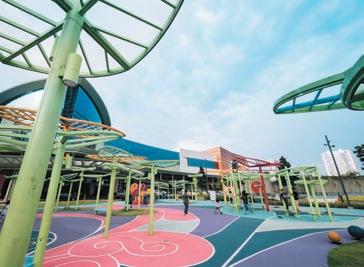
Additionally, the mall also houses the IOI Grand Exhibition and Convention Centre, a 3,836 sq. metres pillarless hall with a nine-metre ceiling height, ideal for large-scale events and exhibitions.
Just next door, the newly opened Central Park provides ample outdoor fun with a pet park, a skate and bike park, basketball, futsal, and badminton courts, giant slides for families, a boardwalk with serene lake views, waterfront activities, a jogging track, and many more opportunities for exploration.
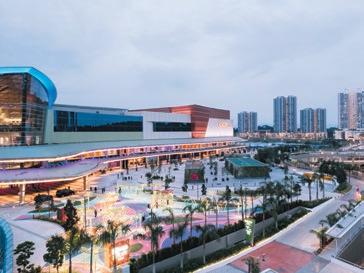
The vibrant energy of Bintang Walk, Kuala Lumpur’s premier shopping and entertainment street, is home to the youthful spirit of Lot 10 and the refined elegance of The Starhilltwo destinations that offer a dynamic lifestyle experience for every shopper and tourist.
Kuala Lumpur’s premier shopping and entertainment street, Bintang Walk, in the heart of the Bukit Bintang shopping district, is a one-stop destination for every shopper and tourist seeking a complete lifestyle experience.
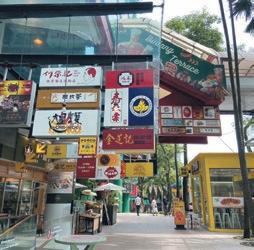
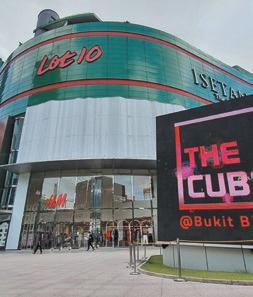
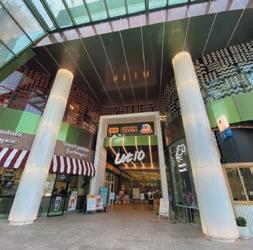
Its excellent accessibility, with the Bukit Bintang MRT and Monorail stations within its boundary and the newly completed MRT Putrajaya Line having two stations within a 15-minute walk, makes it a top tourist destination.
The busy one-kilometre stretch of Jalan Bukit Bintang between Jalan Raja Chulan and Jalan Sultan Ismail is dotted with upscale malls, luxury fashion boutiques, the glitziest five-star hotels, and swanky bars.
Opened 34 years ago, Lot 10 stands majestically with its iconic green, curved facade at the corner of Jalan Bukit Bintang and Jalan Sultan Ismail, making it the big brother of the block. As a beacon of the city’s dynamic youth culture, the mall offers more than just an eclectic mix of retailers and an energetic ambiance. Lot 10 has established itself as a lifestyle hub where creativity, fashion and innovation converge.
The mall provides a diverse array of experiences and offerings that cater to the young and young-at-heart.
From trendy streetwear to avant-garde fashion, its unique blend of local and international brands creates an exciting
shopping experience, making it a treasure trove for style enthusiasts looking to express their individuality.
Beyond fashion, Lot 10 is a culinary haven, boasting a wide variety of dining options that reflect Malaysia’s rich gastronomic heritage.
The iconic Hutong Food Court, Malaysia’s first “Street Food Heritage Village,” with its array of traditional hawker stalls, offers an authentic taste of Malaysia’s street food culture. The mall’s chic cafes and contemporary restaurants provide a perfect setting for socialising and unwinding with friends.
What sets Lot 10 apart is its commitment to fostering a creative and inclusive community.
The mall regularly hosts art exhibitions, music performances, and cultural events, making it a hotspot for artistic expression.
The vibrant street art adorning its walls, the innovative pop-up shops, and the immersive digital experiences all contribute to a unique atmosphere that resonates with the city’s youthful energy.
Whether you’re shopping for the latest trends, indulging in delectable cuisines, or simply soaking in the vibrant atmosphere, Lot 10 offers an unforgettable experience that captures the essence of Kuala Lumpur’s youthful spirit.
From the moment one steps into The Starhill, an atmosphere of elegance and refinement greets every discerning visitor.
Its unique architectural design, featuring a seamless blend of modern aesthetics with warm touches, sets the tone for a ritzy shopping journey.
Located just a few steps away from Lot 10, The Starhill is the city’s preferred destination for luxurious and intimate shopping and dining experiences.
This upscale destination is a haven for those who appreciate the finer things in life, offering a seamless blend of high fashion, fine dining, refined taste, and artistic flair.
All these are set in a sophisticated environment reminiscent of a home, with warm hospitality, making The Starhill truly the city’s Home of the Tastemakers.
The curation of high-end boutiques for fashion, watches, jewellery, and lifestyle experiences by top global and local tastemakers and designers, many of which are one-of-a-kind in Malaysia, offers visitors an unparalleled selection to discover.
The mall is also committed to providing personalised and immersive experiences with the support of its Concierge team, dedicated
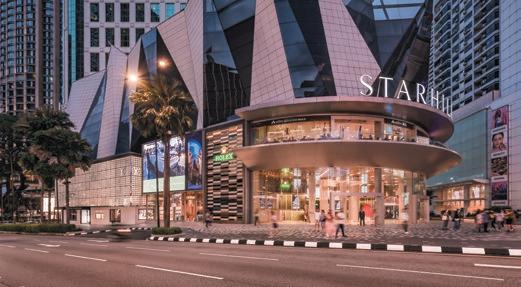
to ensuring every visitor’s needs are met with utmost care and attention.
From personal shopping services to bespoke experiences, the mall strives to offer a level of hospitality that is second to none.
Topping it off is the iconic lifestyle bookstore Eslite Spectrum, which lets patrons escape from the hustle and bustle of Jalan Bukit Bintang. This bookstore anchors The Starhill as the Living Room of Kuala Lumpur.
Dining at The Starhill offers unique gastronomic experiences unlike other malls.
From restaurants with Michelin credentials to artisanal cafes, each delivers a culinary journey that delights the senses.
Its exclusive dining options cater to every palate and occasion, from exquisite Japanese cuisine to South Asian delicacies, or simply a leisurely afternoon tea.
However, the mall is much more than just a place to shop and dine. The Starhill is a social landmark encouraging like-minded urbanites and travellers to gather, linger, and connect.
The mall regularly hosts a plethora of exclusive events, including a marketplace for artisanal finds, fashion shows, monthly art performances, and learning workshops at the Piazza, the Atrium, and The Starhill Narratives.
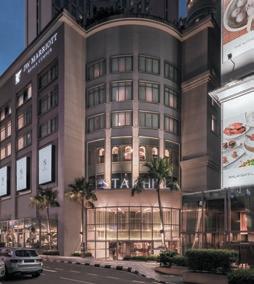
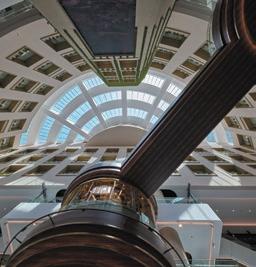
For over two decades, the Mall of Malaysia group has transformed shopping experiences in secondtier cities by offering a diverse mix of international and local brands, family-centric activities, and sustainable initiatives across its six strategically located malls.
If anyone can bring a vibrant cityshopping experience to second-tier cities, it’s the Mall of Malaysia group.
For the past 20 years, this pioneering developer of landmark shopping malls in second-tier cities has been serving the growing populations of these areas.
The group owns and operates six malls, all strategically located in the central business districts of their respective cities: KB Mall in Kota Bharu, Kelantan; Alor Star Mall in Alor Setar, Kedah; Batu Pahat Mall in Batu Pahat, Johor; SB Mall in Sungai Buloh, Selangor; Taiping Mall in Taiping, Perak; and KTCC Mall in Kuala Terengganu, Terengganu.
Catering to the cities’ expanding populations with strong mid to upper household incomes, these malls elevate the shopping experience by offering a wellcurated mix of international and reputable local brands.
Branded as “Your One-Stop Shopping
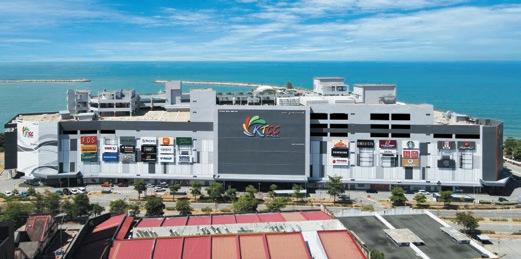
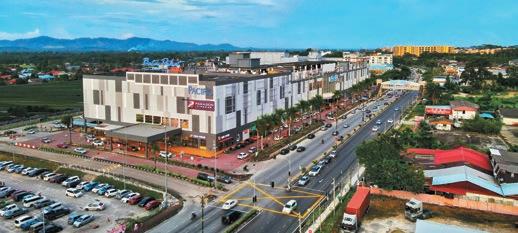
Mall,” these malls provide a diverse range of family-centric tenants, offering necessities, leisure, and entertainment for all ages.
Just like malls in larger cities, they feature urban grocers, department stores, and a variety of F&B outlets, alongside fashion and beauty retailers, healthcare services, and IT and electrical shops.
These malls also include entertainment venues such as their flagship indoor kid’s playground —Funland, cinemas, family entertainment centres, and more.
For the Mall of Malaysia group, ensuring the right tenant mix in respective malls is crucial to its long-term survival and continuous success.
Riding the wave of lifestyle community hub trends, the Mall of Malaysia group collaborates with local communities and organisations to create opportunities and platforms for community events and brand activations.
Their partners include local NGOs, academies, institutions, social clubs, sports clubs such as karate, taekwondo, and judo, as well as school orchestras and musical bands.
One of their notable CSR events is a beachside recycling programme co-organised
with Universiti Malaysia Terengganu, which engages the community in cleaning up the beaches of Kuala Terengganu.
The malls also support local businesses by co-organising industry expos like the annual Malaysia Mega Sales, Coffee Fair, Chocolate Fair, Property Fair, Book Fair, and Job Fairs.
For greater community engagement, they host an annual singing contest for younger audiences, fun runs and health campaigns for fitness-oriented shoppers.
Through these diverse and impactful events, the group aims to make a positive difference in the communities its malls serve, while promoting sustainability, supporting local businesses, and educating public health.
In the pipeline
Aligning with sustainability trends, the Mall of Malaysia group is planning to install EV charging stations, solar panels and rainwater harvesting systems, organise Recycle, Reuse, Reduce (3R) programmes.
The planned facelift also includes upgrading car park access systems at all malls,
transitioning from manual ticketing and payment to a fully cashless system.
Additionally, the group is developing various workshops to offer enriching familycentric activities, including educational spaces for children and dedicated venues that honour the heritage of each individual cities.
KB Mall – This award-winning shopping mall is the first modern and largest in Kota Bharu. Located in the bustling CBD, its facade has become a familiar landmark and in the capital, offering more than 250 retail brands. The mall’s Digital City is an IT and mobile gadgets’ hub and the city’s favourite marketplace for tech enthusiasts.
Alor Star Mall – Conveniently located near the south Alor Setar exit of the North-South Expressway, this mall is not just a “One-stop Shopping Mall” but a central hub in the heart of the community. It’s a place where locals gather, connect, and enjoy a wide range of curated retail experiences tailored to meet their needs and preferences.
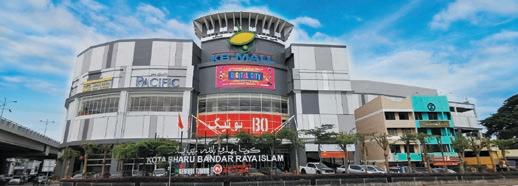
Batu Pahat Mall – Fondly referred to as BP Mall by locals, this mall is the heart of Batu Pahat city. It’s the popular shopping mall serving more than 500,000 shoppers every month. The mall has evolved with new international fashion brands, F&B tenants, and experiential retail stores to provide a modern shopping experience to our patrons.
SB Mall – Located in the bustling area of Sungai Buloh, SB Mall is the go-to destination for locals seeking for fresh grocery, home equipment, muslimah fashion, IT gadgets and varieties of F&B brands. This lifestyle shopping mall has been the go-to staple mall serving the community for more than 25 years.
Taiping Mall – This five-storey mall located in the heart of Taiping city, overlooking the beautiful 160 acres of Taiping Lake Gardens and the majestic Maxwell Hill. As part of a mixed development, Taiping Mall is integrated with the renowned 4-Star, 197room Novotel Hotel. The mall is within walking distance to the Taiping Bus & Taxi Terminal and Electric Train Service (ETS), making it a getaway destination, easily accessible by public transport.
KTCC Mall – Located on the prominent Kuala Terengganu waterfront overlooking the KTCC drawbridge and the infinite South China Sea. This is the first and largest shopping mall in the city, offering more than 300 shops across its four retail floors. It features a 15,000 sq.ft. event and exhibition area on Level 2, and also “Pasar Kedai,” a dedicated space
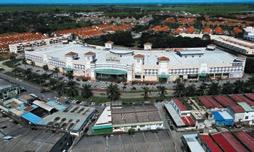
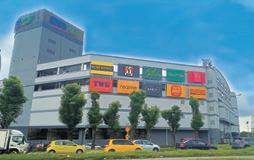
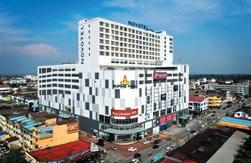
that spans over 7,000 sq.ft. for local artisans to showcase their crafts, food, and creations.
A flagship landmark of the group is now an established mall in the East Coast region. The mall will continue to offer outstanding tenant mix for our shoppers and bringing vibrant city-shopping experience to the community in Kuala Terengganu.
Founded in 1979, MKH Berhad is a publicly listed Malaysian company with deep roots in Kajang, Selangor. Over the years, MKH has established a strong brand presence in Selangor, Kuala Lumpur, and Indonesia. As a leading property developer, MKH has significantly transformed Kajang with a diverse property portfolio, including meticulously planned Transit Oriented Developments (TOD), thriving townships, and integrated high-rise buildings across the Klang Valley.
In 2008, MKH diversified into oil palm cultivation in East Kalimantan, Indonesia, reflecting its commitment to sustainable growth and value creation for all stakeholders. Beyond real estate, MKH is involved in property investment, building materials trading, and furniture manufacturing, consistently exploring innovative approaches to elevate living standards.
Our property investment division, established in 1996, includes two ecoconscious shopping malls, Plaza Metro Kajang and MetroPoint Complex. These malls have evolved into dynamic community centres, offering shopping, leisure and dining options, while embodying our commitment to sustainability.
MetroPoint Complex (MPC) is a neighborhood mall in Kajang, notable for its 30-lane bowling alley, the largest Mr.DIY outlet in Selangor, and the widest selection of F&B chain outlets in the area. Committed to being environmentally friendly, MPC has implemented various green initiatives. These include solar photovoltaic panels to reduce carbon footprint and electricity consumption, EV charging stations, and natural lighting from the ceiling to illuminate the third-floor escalator. The mall also features upgraded plumbing and irrigation systems to minimize water usage, and its sustainable waste management practices focus on recycling, reusing, and repurposing materials for decorations.
The lessons learned over the years have shaped MPC’s current business practices, as we continue to strive for a vibrant, welcoming, and dynamic shopping environment. In response to the COVID-19 pandemic, we adopted stringent cleaning protocols, regularly replacing air conditioning filters, and maintaining clean exhaust systems. We conduct spot checks on the hygiene standards of F&B tenants and strictly adhere to government regulations. Our vigilant security measures ensure a safe shopping experience and help prevent any inappropriate or dangerous behavior.
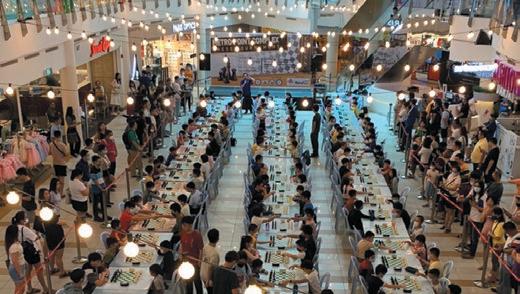
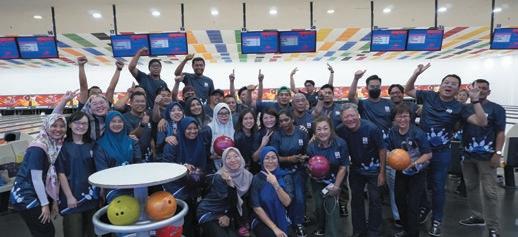
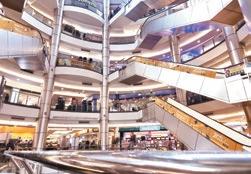
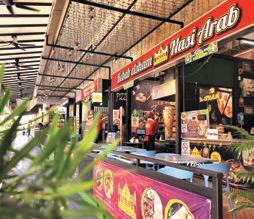
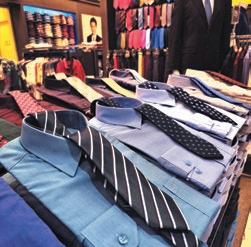
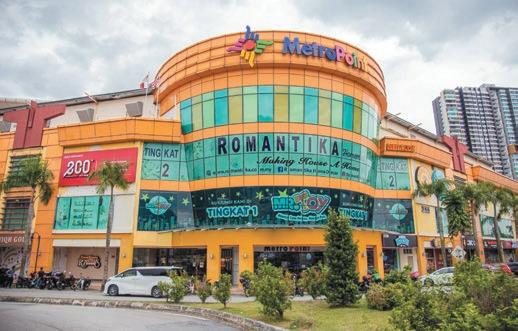
Connecting strongly with the local community has proven essential for our success. Through local events, business partnerships, and personalized services, we foster a sense of belonging and loyalty among tenants and shoppers. Meanwhile, adopting new technologies enhances the shopping experience at MPC. This includes implementing cashless parking apps for easier payments and leveraging social media marketing for broader engagement.
To further enhance the shopping experience, MPC has renovated restrooms and prayer rooms by incorporating modern designs with air conditioning. We have also hosted community-based events such as workshops and fashion shows, adjusted lighting and music to create a better ambiance,
and offered free gifts during festive seasons as a token of appreciation for our customers.
Plaza Metro Kajang (PMK) seamlessly integrates traditional Malaysian culture with contemporary retail, offering a unique blend of cultural events, showcasing local crafts, and providing dedicated spaces for local artisans. This creates a vibrant shopping environment that celebrates heritage while catering to modern consumer needs.
In line with its commitment to environmental sustainability, PMK uses energy-efficient lighting, water-saving fixtures, and recycling programs. The mall has also installed solar panels and expanded its green spaces. Recently, PMK introduced
electric vehicle (EV) charging stations. To improve customer comfort, PMK has upgraded parking facilities, expanded the food court, enhanced Wi-Fi, added more seating areas, and introduced interactive retail options. Collaborations with local businesses, discounted rental rates, and community events and cultural celebrations further enrich the shopping experience.
Continuous innovation, market research, unique experiences, and high customer service standards keep us ahead in the evolving retail landscape, ensuring PMK remains in the forefront in sustainability and community engagement. Through market research and feedback, we ensure a variety of retail, dining, and entertainment options, prioritising local businesses. In addition, monthly themed events keep the shopping experience fresh. During the pandemic, we significantly enhanced our digital presence and e-commerce capabilities by launching a comprehensive loyalty programme and a userfriendly mobile app. These initiatives provide real-time updates and ensure our customers stay informed and engaged, improving their overall shopping experience and fostering stronger customer relationships.
Since its establishment, MKH has demonstrated a steadfast commitment to sustainability, community engagement, and innovative growth. Our eco-conscious initiatives at MPC and PMK highlight our dedication to environmental responsibility and enhancing the shopping experience. By integrating new technologies and fostering community connections, MKH leads in creating vibrant, sustainable, and welcoming spaces for all.
Through its Total Coating and Construction Solutions initiative, Nippon Paint (M) Sdn Bhd, a one-stop constructions solutions provider, collaborates with Persatuan Pengurusan Kompleks Malaysia to upskill and enhance the local retail sector
Nippon Paint (M) Sdn Bhd proudly announced its strategic collaboration with Persatuan Pengurusan Kompleks Malaysia (PPK Malaysia) for its Maintenance and Refurbishment Workshop aimed at upskilling industry players, and elevating the maintenance and refurbishment standards of shopping malls nationwide.
As the representative entity for Malaysian shopping centres, PPK Malaysia remains at the forefront of disseminating vital industry insights to its esteemed members.
This collaboration signifies Nippon Paint’s unwavering commitment to enhancing the retail sector, which continues to display promising growth, with forecasts projecting a steady 4% annual increase in sales, underscoring the sector’s resilience and upward momentum.
Nippon Paint General Manager Tay Sze Tuck said the company aims to elevate the aesthetics, functionality and safety of these
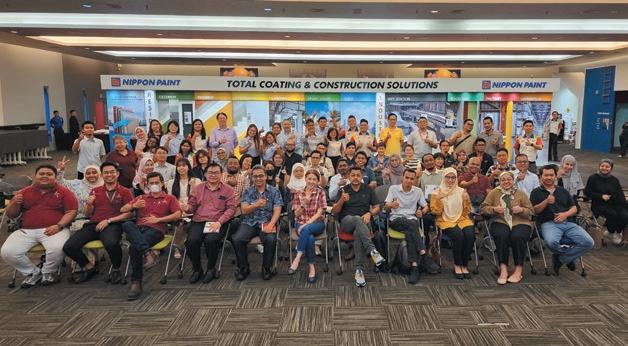
establishments, recognising the importance of staying competitive in an ever-evolving retail landscape.
“Investment in maintenance and refurbishment of malls play a key role in upholding Malaysia’s architectural structure and contribute to enhancing the retail landscape.
“Industry professionals are empowered with essential skills and knowledge for maintaining safety standards, mitigating
potential hazards and delivering exceptional experiences to both retailers and patrons evidently, stimulating economic growth for the nation.”
Nippon Paint’s Total Coating and Construction Solutions (TCCS) serve as a comprehensive framework for mall revitalisation, the first in the region offering

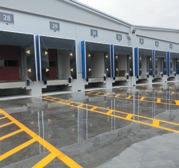
tailored refurbishment solutions ranging from repainting to re-waterproofing and reflooring.
This structured approach, coupled with stringent quality assurance measures and expert workmanship ensures not only safety and regulatory compliance but also customer satisfaction.
The five-step service framework implemented by Nippon Paint reiterates their

dedication to excellence, covering everything from site assessment to post-assessment and handovers.
Through this holistic approach, Nippon Paint aims to streamline property maintenance, making it more efficient, costfriendly and hassle-free for mall operators.
PPK Malaysia Executive Director Evelyn Lo said, since the association’s inception in 1984, as a networking associate of shopping malls in Malaysia, it has endeavoured to connect, network and share best practices among its members.
“For instance, our Teh Tarik Talks delve into new channels of retail as shopping malls today not only compete against each other, but also face competition from e-retailers worldwide. As such, it’s important for us to be ahead of the curve in order to mitigate any issues,” she said.
“Shopping malls have a competitive advantage in bringing people together. This collaboration with Nippon Paint has amplified our initiatives and reflects our shared commitment to empowering our members with a comprehensive solution.
“We certainly hope to continue this fruitful collaboration to further drive growth in the shopping mall and retail sector,” Lo added.
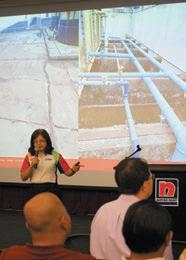
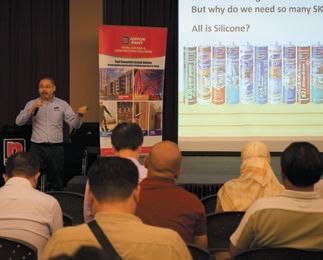
Nippon Paint believes that investing in training and upskilling within the operational domain is crucial for fostering a culture of safety and minimising potential hazards.
Recognising the inherent risks associated with maintenance issues such as efflorescence, cracks, fungus and water leakage, many of which result from non-adherence to correct application methods, protocols and optimal equipment utilisation, is essential.
By acknowledging these issues early, industry players can reduce the occurrence of maintenance issues and ensure regulatory compliance and adherence to best practices. It can ultimately enhance the beautification and structural integrity of shopping malls in the country.
A representative of Sunway Malls, who attended the workshop, said that having a
reliable maintenance partner such as Nippon Paint makes all the difference, especially when cost is a concern.
“At the workshop, we gained invaluable insights, especially on techniques like treating fungus before coating, ensuring lasting solutions rather than quick fixes.
“Prioritising quality and longevity will lead to significant long-term savings on maintenance expenses. This knowledge will be shared across our maintenance teams, ensuring consistent quality across all our malls.”
The impact of continuous upskilling within the retail landscape among key players ensures that the talent pool remain updated with industry trends and knowledge.
Consequently, it enhances the quality of building infrastructure. Nippon Paint, through its comprehensive TCCS continues to contribute to this by leveraging its vast expertise to uplift industry standards.
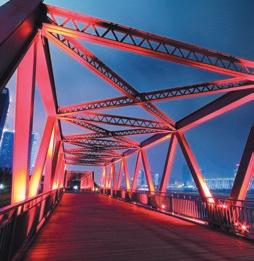


Pavilion REIT leverages the power of place, product, promotion, price, and people to keep Pavilion Kuala Lumpur and Pavilion Bukit Jalil at the forefront of Malaysia’s retail landscape, combining cuttingedge technology, sustainable practices, and community engagement to create unparalleled shopping experiences.
All Pavilion REIT needs are the right five “Ps” to keep its malls—Pavilion Kuala Lumpur and Pavilion Bukit Jalil—competitive and appealing in the ever-evolving retail landscape.
“To stay competitive in a rapidly changing retail environment requires a deep understanding of the right place, product, promotion, price, and people,” says Pavilion Kuala Lumpur Chief Executive Officer (Retail) Dato’ Joyce Yap.
Yap says mastering these fundamentals help the company to focus on making the mall locations more accessible to ensure the brand remains ahead of the competition.
The malls also work closely with retailers to set entry prices and offer value-for-money products while applying marketing strategies designed to reach a broader target market, entice visitation and boost sales.
“Analysing our target market is crucial,” Yap emphasises. “Once we understand our audience, it’s easier to convert traffic into sales.”
“By looking at both international trends and local culture, we can ensure our offerings are globally appealing while remaining locally relevant,” she adds.
Located in the heart of Bukit Bintang Shopping District, Pavilion Kuala Lumpur is regarded as Malaysia’s premier shopping destination, while the Gold Award winner of the Fiabci World Prix d’Excellence Awards 2025, Pavilion Bukit Jalil is located at the affluent suburb located in the southern part of Kuala Lumpur.
As a defining authority that excels in fashion, food & beverage, and urban leisure, Pavilion KL offers an array of unparalleled retail experiences.
“We pride ourselves on being the country’s first retail mall to feature sleek, ultra-modern street-front duplex stores,” Yap says.
The mall is organised into four distinct precincts: Couture Pavilion, Fashion Avenue, Beauty Hall, and Connection Precinct.
Couture Pavilion houses flagship stores and boutiques of international luxury brands
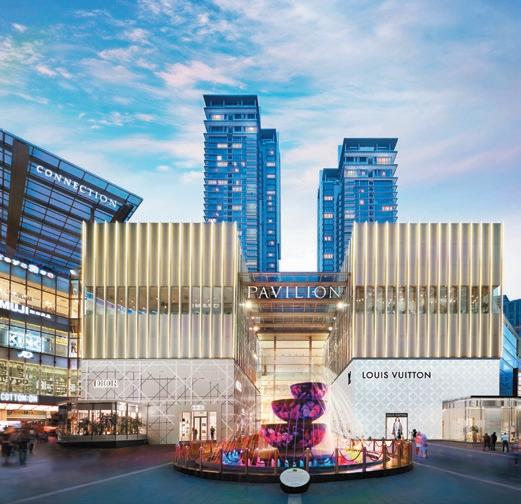
like Louis Vuitton, Hermès, and Cartier, while Fashion Avenue features exclusive fashion, beauty, and fragrance brands such as Penhaligon’s, Prada Beauty, and Parfums de Marly.
Beauty Hall offers a comprehensive range of premium beauty brands and services, and Connection Precinct is a vibrant hub for foodies and coffee lovers, with its mix of bars, restaurants, and coffee joints.
“Our prime location in Bukit Bintang allows us to showcase these world-class brands to both local and international visitors. Nearly a quarter of our tenants are new to the country, with Pavilion KL often being their first or exclusive location,” Yap explains.
The company leverages big data to analyse consumer preferences and trends, ensuring that its tenant mix caters to at least 80% of its target market.
“Our goal is to offer something unique rather than replicating what other malls provide,” she adds.
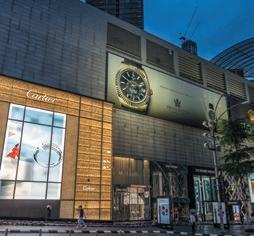
Beyond retail, Pavilion REIT positions its malls as community hubs where friends, family, and loved ones can create lasting memories.
“Over my 40-year career in the retail industry, I’ve seen shopping evolve beyond retail to become a reflection of social status, a means of bonding, and even a form of therapy,” Yap observes.
Therefore, Yap says, the company is committed to creating immersive experiences through interactive engagements, celebrations, and pop-ups.
Over the years, the company has contributed to various charities supporting children, orphans, the elderly, single mothers, and more as part of its Corporate Social Responsibility (CSR) programmes.
For local retailers, the company organises sales and public relations training for frontline staff and assists them in securing distributorships with foreign brands.
Pavilion REIT views every project as an opportunity to make a positive impact on the planet and communities.
“Sustainability is a concern that is close to our hearts, and it’s central to how we do business,” says Yap.
The company actively evaluates the viability, feasibility and potential of sustainability initiatives, while fully supporting tenants that pursue sustainable paths.
“We focus on enhancing our assets by implementing energy-efficient systems,
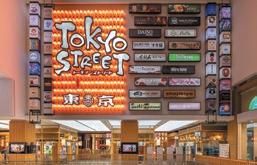
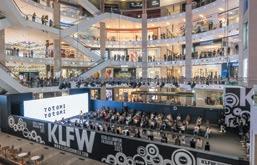
waste reduction and effective water management to minimise carbon emissions,” she adds.
Last year, the company launched the Pavilion Loves E.A.R.T.H. campaign which included the Food Compost Initiative at Pavilion Bukit Jalil, and encouraged tenants to showcase their eco-friendly products and green practices through its Environmental, Social, and Governance initiative, Pavilion Loves Sustainability.
At Pavilion Bukit Jalil, tenants like Uniqlo, Zara, and HLA have adopted sustainable and fair-trade models by offering eco-conscious products.
Stores like L’Occitane, The Body Shop, and Bath and Body Works have also transitioned to sustainable packaging and refill options.
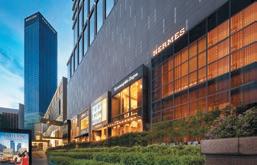
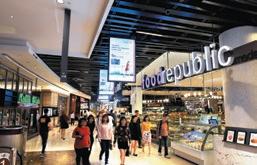
Yap acknowledges the critical role technology plays in advancing the malls.
“The industry has shifted from traditional models to a more modernised and digitised experience. Understanding consumer behaviours and trends is key,” she says.
To elevate the shopping experience, the Pavilion KL has introduced a mobile app that offers year-round rewards and helps users navigate the mall, discover new store openings, and take advantage of tenant discounts and promotions.
In the coming years, Yap anticipates a strong demand for personalisation, digital retail experiences and sustainability efforts, particularly among the Gen Z and dualincome, no-kids household.
Sunway Malls, a division of the Sunway Group, offers premier retail destinations across Malaysia’s key economic states, including Kuala Lumpur, Selangor, Penang, Perak and Johor. Our malls are vibrant hubs offering a rich tapestry of shopping, dining and entertainment options, strategically placed within masterplanned townships and mixed developments, attracting locals and tourists alike.
Each mall boasts a unique identity i.e. Sunway Pyramid features an iconic lion head and pyramid, Sunway Velocity a neofuturistic digital globe, Sunway Putra a sun drop diamond façade, Sunway Carnival Mall for its colourful cubes, and Sunway Big Box for its large format stores.
Since our inception in 1974 by founder and chairman Tan Sri Sir Dr. Jeffrey Cheah, Sunway Group has been a beacon of sustainability, transforming Sunway City Kuala Lumpur from a wasteland into a thriving urban wonderland. Since Sunway
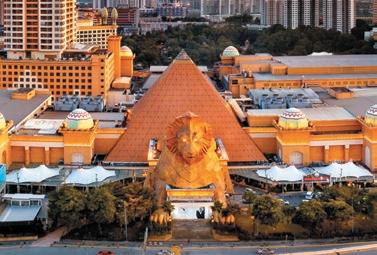
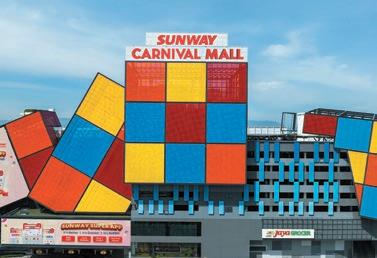
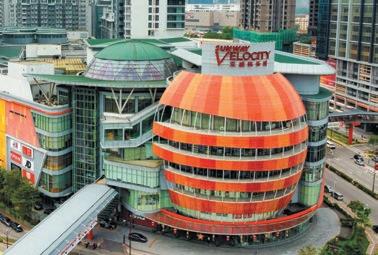
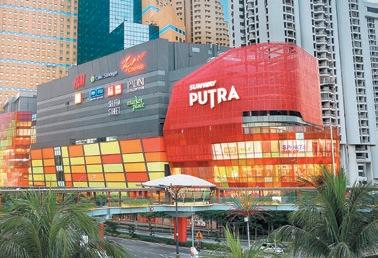
Malls’ flagship project, which opened in 1997, we integrate sustainability into every aspect of our operations, aligning with global Environmental, Social and Governance (ESG) goals. Our initiatives focus on Waste, Energy and Water management, supported by six pillars: Green Leasing, Sustainable Operations, Green Procurement, Waste Management, Community Building and Urban Farming.
We use energy-saving technologies, such as LED lighting, advanced HVAC systems and motion sensors. Sunway Malls installed solar panels on rooftops and to encourage electrical vehicle use, we installed over 50 EV charging stations and use e-bikes for car park patrolling. Our Automated Building Automation System controls building temperature, optimising energy use in compliance of MS1525.
Water-saving measures include low-flow fixtures, rainwater harvesting, and treating lake water for non-potable uses like irrigation. Innovations like Smart Toilets help identify and prevent leakages, making Sunway Malls pioneers in this technology.
We promote recycling and waste reduction through efficient waste segregation. Sunway Malls was the first to execute a comprehensive Waste Audit by Jeffrey Sachs Centre on Sustainable Development at Sunway University, which revealed insights to help
educate tenants on proper waste practices. We introduced Food Waste Composters, creating compost for community use, and implemented a cashless, ticketless parking system, reducing paper waste. Fabric recycling spaces near car park lobbies add convenience for visitors.
Our urban farming projects transform underutilised spaces into farms yielding organic vegetables. Some produce supports tenants and customers, while others are sold through Sunway X-Farm. These farms showcase smart farming tools and raise awareness of the farm-to-table benefits.
Since 2019, Sunway Malls has supported Autism Spectrum Disorder (ASD) awareness. Sunway Putra Mall became Malaysia’s first autism-friendly mall, partnering with the Autism Behavioural Centre for training and support. Sunway Putra and Sunway Carnival Malls have Calm Rooms, while Sunway Velocity and Sunway Pyramid offer Sensory Walls for a stress-free experience.
Sunway Malls led a partnership with Jeffrey Sachs Centre, Sustainable Development Solutions Network, Malaysia Retailers Association, and Malaysia Retail Chain Association to launch SCAN. This initiative promotes sustainable business
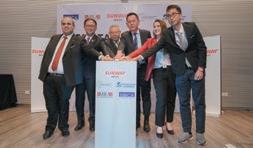
practices and offers insights to achieve netzero carbon emissions by 2050, primarily through the complimentary ReX online educational platform which is available for all retailers.
Sunway Malls aligns its sustainability efforts with Sunway Group objectives and UN goals. We adopt a holistic approach by continuous monitoring and reporting to ensure sustainability is an ongoing journey, encompassing good governance, environmental stewardship, talent management and community investment.
The past five years, particularly during the COVID-19 pandemic, have highlighted the importance of health, safety and digital transformation. Innovations like Smart Parking, Smart Toilets, and a super app underscore our commitment to understanding customer behaviour and optimising operations through data analytics. We embraced the need for strong retailer relationships and flexible leasing strategies, emphasising sustainability and ESG principles.
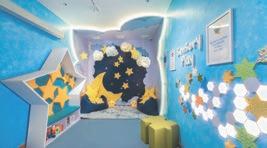
Sunway Malls continuously upgrade to meet consumer demands, ensuring a diverse tenant mix and high footfall. Detailed market research informs our strategic tenant mix, catering to diverse needs with national chains, local businesses and specialty stores. Pop-up shops and seasonal stores keep the shopping experience fresh. We regularly review tenant performance to maintain relevance and appeal, balancing entertainment, dining and service-oriented businesses.
Sunway Malls anticipates future retail trends emphasising unique experiences, sustainability, and health-focused products. Running multiple sized malls across locations balances risks and rewards. Our strength lies in quick adaptation, leveraging the Sunway Group brand, and fostering a culture of continuous improvement and learning.
Sunway Malls’ commitment to sustainability, innovation and community engagement ensures we remain a leading force in Malaysia’s retail sector, offering unparalleled shopping, dining and entertainment experiences while contributing to a greener, more resilient future.
Suria KLCC Sdn Bhd is a leading retail asset management group in Malaysia, managing three prominent shopping centres: Suria KLCC, Alamanda Shopping Centre and Mesra Mall. These destinations collectively host over 550 specialty stores across 2 million square feet of retail space, offering diverse and innovative shopping experiences.
Suria KLCC stands out as Malaysia’s iconic experiential shopping destination, strategically located within the renowned KLCC Precinct, home to the PETRONAS Twin Towers. Its proximity to the 50-acre KLCC Park, Kuala Lumpur Convention Centre, Aquaria, and prestigious hotels makes it a convenient and attractive choice for both local and international visitors. The mall, constantly evolving under its tagline ‘Always Something New’, offers more than 360 specialty stores and major attractions like Petrosains, ensuring a vibrant and dynamic shopping experience.
Alamanda Shopping Centre in Putrajaya is
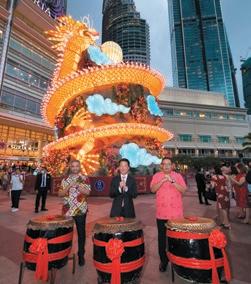
undergoing its first major redevelopment. Scheduled for completion in late 2024, this expansion will add approximately 110,000 square feet of retail space and enhanced entertainment facilities, including a familyfriendly cinema, a brand-new 26-lane bowling alley, and an Adventure Park. Alamanda aims to become a vibrant community hub, offering an experience of ‘Easy Vibrant Shopping’ for a diverse audience, from working professionals to students.
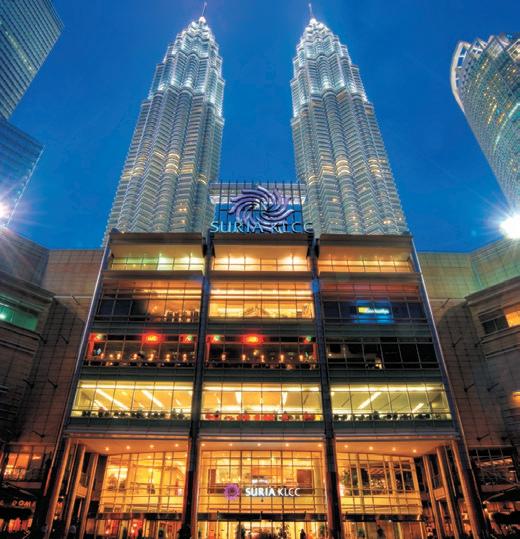
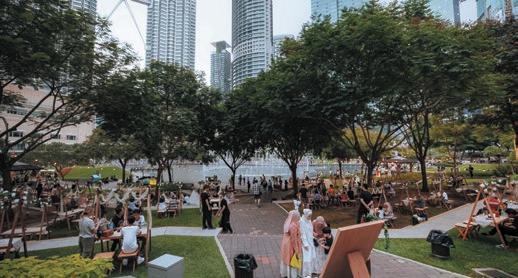
Mesra Mall in Kemasik, Terengganu, serves as the East Coast’s favourite go-to shopping destination. With over 310,000 square feet of space, it offers a mix of local and international brands, complemented by extensive recreational facilities including a 24-lane bowling alley and a versatile event hall. Mesra Mall’s offerings cater to the surrounding communities, providing an experience of ‘Easy Friendly Shopping’.
Sustainability is a core focus for Suria KLCC Sdn Bhd, with Environmental, Social and Governance (ESG) principles integrated into its operations. Suria KLCC has installed over 6,600 solar panels on its rooftop, generating 300,000 kWh annually, covering around 30% of the mall’s common area power needs. Future sustainability initiatives
include exploring solar panel installations at Alamanda and Mesra Mall.
Innovation and adaptability have been crucial in maintaining Suria KLCC’s competitive edge. By leveraging a data-driven approach to tenant mix, continuously modernising assets, and adopting technology for operational efficiency, the mall has remained a top destination for visitors. The return of tourists and office workers has underscored the need for flexible strategies, with offerings tailored to meet the evolving needs of a diverse customer base.
New Initiatives across the malls include shopping e-Vouchers, the Suria KLCC VIPrivileges Programme, smart parking systems, cashless transactions, and
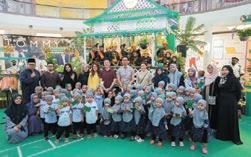
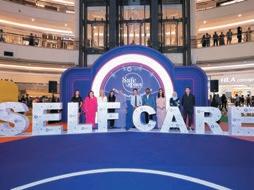
seamless in-mall navigation tools. Regular modernisation of facilities ensures a contemporary and comfortable environment, while hosting unique events like ‘Picnic in the Park’ and ‘Kuala Lumpur Fashion Week’ at Suria KLCC enhances the overall shopping experience.
Upcoming developments include ongoing enhancements at Suria KLCC, such as the revamp of TGV Cinemas and the modernisation of escalators and restrooms. Alamanda Shopping Centre is undergoing significant asset enhancements, including upgraded interiors and improved accessibility. Mesra Mall, following its full occupancy milestone, is exploring future expansion to elevate its appeal.
Tenant Mix is strategically curated through comprehensive market research, ensuring a balance of premium brands, everyday essentials, entertainment options and dining establishments. At Alamanda, the upcoming Adventure Park at the Esplanade and modern cinema halls reflect a response to consumer demand for enriched experiences. Mesra Mall’s recent achievement of full occupancy highlights the success of this approach, with potential expansion plans on the horizon to meet growing shopper needs.
Community Engagement is a key aspect of Suria KLCC Sdn Bhd’s strategy, with initiatives focusing on mental health awareness, festive celebrations, and supporting local businesses. The Safe Space @ Suria KLCC campaign, in partnership with NGOs, highlights the group’s commitment to social responsibility. Similar efforts at Alamanda and Mesra Mall further strengthen community ties.
Suria KLCC Sdn Bhd plans to enhance its properties by embracing experiential retail, integrating technology, and continuing its commitment to sustainability. The revival of tourism and increasing emphasis on ESG principles will shape the group’s strategies, ensuring that Suria KLCC, Alamanda Shopping Centre, and Mesra Mall remain competitive and appealing in Malaysia’s evolving retail landscape. Through active management and continuous innovation, Suria KLCC Sdn Bhd is poised to lead the industry in creating engaging and sustainable shopping experiences.
With a focus in diverse tenancy, seamless connectivity and advanced technology, Malaysia’s premier shopping destination is also committed to promoting sustainable and ethical practices
Sustainability is a key focus worldwide, and it is encouraging to see Malaysia’s swankiest shopping space – The Exchange TRX – making a strong commitment to this cause.
The Exchange TRX is the first retail destination in Malaysia to achieve the Leadership in Energy and Environment Design (LEED) Gold certification.
“Sustainability is a key element of The Exchange TRX. We have sustainability partnerships in place with the Global Real Estate Sustainability Benchmark, The Sustainable SITES Initiative and the US Green Building Council,” said global real estate group Lendlease, a co-developer of the retail destination.
The year-old retail destination has introduced its goals for 2024 and pledges admirable goals for 2030.
In 2024, The Exchange TRX aims for a 50% reduction in potable water use and a 50% recycling rate upon Retail destination opening. By 2030, it aims for zero waste and a smooth transition to renewable energy.
“The Gold certification for LEED underscores our unwavering commitment to sustainability and sets a pioneering example in the industry,” said Lendlease.
“We work closely with our tenants to fulfil their green lease commitments, guiding them on using sustainable materials in their fit-outs, sustainable waste management and water conservation solutions.
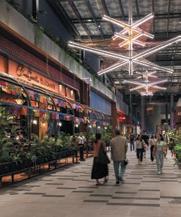
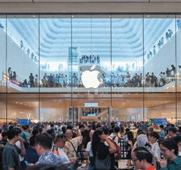
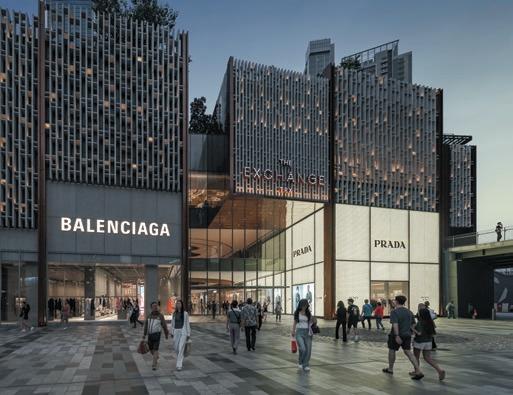
“The Exchange TRX is also the first retail centre to sign a pact with the Worldwide Fund to eliminate single-use plastics.”
The developer explained that the growing awareness of environmental and social issues has led consumers to seek sustainable and ethically produced products. Brands that prioritise eco-friendly practices and fair labour are
gaining popularity.
“Aligned with Lendlease’s ambitious sustainability targets, The Exchange TRX aims to be one of the most sustainable destinations in Malaysia.”
Some of the retail destination’s sustainable retail initiatives include:
• Extensive use of recycled water for flushing, cooling and irrigation;
• Working with retailers on the Green Lease initiative for long-term energy savings for both retailers and The Exchange TRX;
• Sustainability training for retailers;
• Use of sustainable materials such as water efficient tap fittings, LED lights, carpet with recycled content and certified sustainable timber; and
• Incorporating locally-sourced services and products (as part of the government’s drive in Industrialised Building System)
Besides sustainable and ethical shopping, Lendlease highlighted a number of other key trends in retail that could impact the retail destination in the coming years.
Technology integration is one such emerging trend. At The Exchange TRX, technology and innovations are adopted to enhance the overall retail experience.
Digitising customer service aspects through The Exchange TRX app, its one-of-a-kind three-storey Flat Iron display screen and using data to drive building efficiency, make the integration of lifestyle, leisure and experience seamless and enjoyable.
“We have also partnered with retail data insights platform Podium Property Insights (PPI) that will revolutionise the way the retail destination tracks and drives performance in terms of sales, marketing, operations and sustainability targets. PPI will help The Exchange TRX activate the value of the precinct by unlocking actionable insights about the interaction of people, spaces and places.”
Other key retail trend is to localise the offerings and to offer pop-up stores and experiential retail. Retailers are recognising the importance of tailoring their products and services to the specific needs and preferences of each Southeast Asian market. Cultural sensitivity and understanding of local tastes are crucial for success.
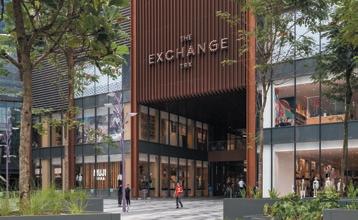
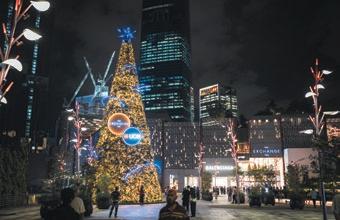
Pop-up stores and experiential retail concepts, meanwhile, are on the rise, creating unique, immersive shopping experiences.
“Working closely with our retailers ensures that our popup offerings remain exciting, fresh and more importantly meet the demands of what consumers want to see.”
Lendlease also gave their predictions for what they think the future of retail will look like in five years from now.
“We anticipate a retail scenario marked by a blend of physical and digital experiences, personalisation, sustainability, technological advancements and a focus on providing memorable, community-driven and value-added experiences to customers.
It will be a dynamic and ever-evolving landscape where flexibility and innovation are going to be the prerequisites to success.
Future of retail also places a premium on flexibility of physical spaces to adapt to changing trends and customers’ demands, and The Exchange TRX has been designed to have this sort of adaptability. We are continuing to work with brands on expansion and their future needs.”
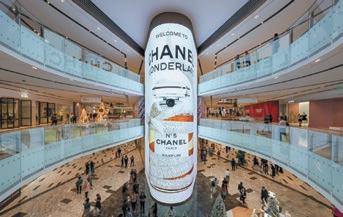
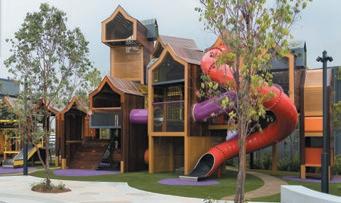
Tucked away in the vibrant heart of Mid Valley City, The Gardens Mall stands as a premier shopping destination with its impressive six levels of retail splendour.
Since its opening in 2007, The Gardens Mall houses more than 200 stores, offering an unparalleled shopping experience that caters to a wide variety of tastes and preferences; it is not just a shopping haven, but a lifestyle destination that has something for everyone.
The Gardens Mall is home to many iconic international brands that exude luxury and sophistication.
Shoppers can indulge in high-end fashion and accessories from renowned names such as Louis Vuitton, Cartier, Gucci, and Hermès which offer the latest trends and timeless classics, ensuring that fashion aficionados find exactly what they are looking for.
One of the key highlights of the mall is Isetan, a distinguished department store known for its comprehensive selection of fashion, beauty, and household items.
This retail giant is complemented by its adjacent dining space, The Table, which provides a relaxed atmosphere for visitors to unwind and savour their delectable dishes.
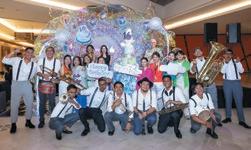
When it comes to dining, The Gardens Mall shines with its vast range of eateries that accommodate every culinary connoisseur’s taste.
From local delicacies to international cuisine, there are numerous dining options available, ensuring that every visitor can find something to suit their palate.
The mall also features many mobile and gadget stores, providing the latest technology and accessories for tech enthusiasts.
Home furnishing enthusiasts will appreciate the well-curated showrooms that showcase stylish and functional home décor.
Additionally, the Jaya Grocer supermarket houses a premium selection of groceries and everyday essentials, highlighting the
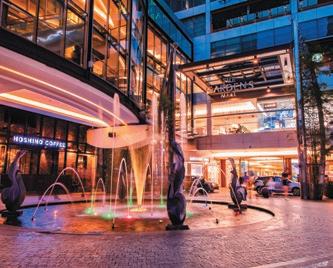
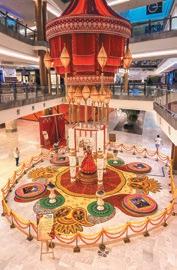
convenience of shopping at The Gardens Mall.
For those seeking to rejuvenate, the mall’s fourth floor is dedicated to wellness and selfcare.
This level boasts a variety of spas, a nail salon, and a state-of-the-art fitness centre, making it an ideal destination for rest and relaxation.
Movie enthusiasts can catch the latest blockbusters in luxury at Aurum Theatre, known for its plush seating and superior viewing experience.
Culture lovers will find entertainment at The Gardens Theatre on the sixth floor, where a range of performances, including comedy, drama, dance, and musical shows, are staged regularly.
Those looking for a serene escape can retreat to The Gardens Club lounge on the fifth floor, where members can enjoy perks such as complimentary parking, exclusive event invitations, and access to a sophisticated lounge area.
As one of the flagship components of IGB REIT’s retail portfolio, The Gardens Mall is not just a shopping centre but a beacon of luxury and convenience.
Its diverse offerings and high-end amenities make it a standout destination for both local residents and visitors alike.
Step through the majestic entrance of Mid Valley Megamall and immerse yourself in a world of diverse experiences.
With its expansive 1.7 million square feet of net lettable space, Mid Valley Megamall stands as a colossal tribute to modern retail and entertainment.
Standing proud since 1999, Mid Valley Megamall remains a shopper’s paradise, where fashionistas can indulge in the latest trends, and children can explore a world of wonder.
The mall is a gourmet haven offering a collection of dining options that satisfies diverse culinary tastes, making it a cherished family destination.
This versatility is seamlessly integrated under one roof, creating a vibrant and dynamic environment for visitors of all ages and is easily accessible by train or bus.
With over 400 stores, including prominent anchor tenants AEON and Golden Screen Cinemas, Mid Valley Megamall is a bustling hub of activity that boasts of 565 specialty stores.
Shoppers can peruse high-fashion international brands such as H&M, Uniqlo, MUJI 無印良品, MLB, Aape, and Zara & Zara
Men, ensuring that they stay on the cutting edge of style.
For those with a local flair, popular brands such as Padini Concept Store are also available, providing a rich mix of fashion options.
Further enhancing the shopping experience is the delightful range of junior anchor specialty stores.
Fitness enthusiasts can visit Celebrity Fitness, while fans of handiwork will find Mr DIY Plus to be a treasure trove of practical items.
Moreover, the Mid Valley Exhibition Centre (MVEC) is an impressive venue for events, and a key component of the mall’s multifunctional space.
Complete with a grand atrium and three versatile halls, MVEC has been the venue of nationally acclaimed events such as the MATTA Fair, Home and Decoration Fair and IT Fair.
Whether you’re looking for the latest in fashion, home furnishings, cosmetics, or healthcare essentials, Mid Valley Megamall offers a comprehensive and engaging shopping experience.
Its diverse range of stores and amenities ensures that visitors have access to everything they need, all within the dynamic and vibrant atmosphere of this exceptional retail destination.
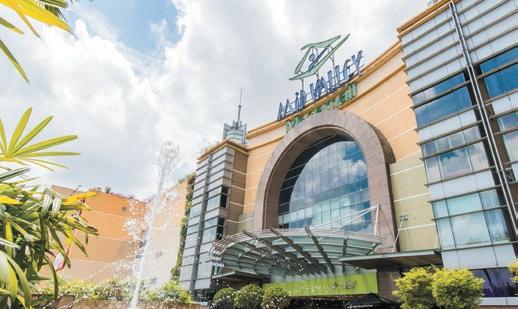
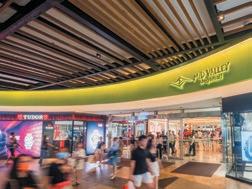
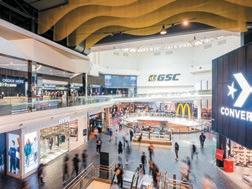
PE Holdings transforms its malls
— Design Village, The Spring Kuching and The Spring Bintulu — into vibrant community hubs through stunning festive decorations, innovative layouts, and sustainable practices, making them destinations for cultural celebration and environmental stewardship.
When PE Holdings, a market leader in creating innovative, beautiful, and functional community spaces, highlights the festive decorations in its malls as a unique feature, it demonstrates the company’s commitment to aesthetics and originality.
The company takes pride in the decorations displayed during major festivals like Chinese New Year, Christmas, and Hari Raya across its three shopping malls.
During each festival, these malls — Design Village in Penang and The Spring Kuching and The Spring Bintulu in Sarawak — go all out to captivate their shoppers with extravagant decorations.
These visual feasts are not only about aesthetics and creativity but also reflect the country’s beautiful culture and heritage, transforming the malls into community destinations during celebrations.
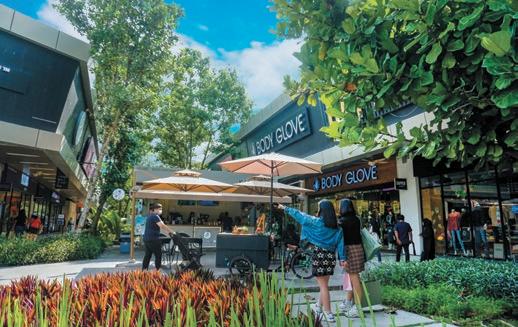
In addition to the festive decor, these malls set themselves apart from their peers with their unique layout and architectural designs.
Design Village stands out with its singlefloor, infinity-shaped layout which optimises shopper navigation and comfort, while The Spring Kuching and The Spring Bintulu feature square layouts with north, south, west and east wings, for easier navigation.
The malls’ appeal and sustainability efforts align with PE Holdings’ sustainability pillars: eradicating poverty, promoting wellbeing, ensuring quality education, fostering economic growth, and supporting peace, justice, and strong institutions.
In addition to their sustainability initiatives, PE Holdings proudly champions
its flagship effort, ‘Green Gains’, a communityfocused recycling campaign held across its malls.
Notably, Design Village has won landscape awards, having planted over 790 trees featuring more than 140 species of plants into its beautiful landscape.
While it supports biodiversity, the greenery also helps to make the place cool during hot weather and save energy.
On top of the installation of solar panels, the mall is also implementing rainwater harvesting for landscape irrigation and compost waste system for fertiliser.
The Spring shopping mall in Kuching set industry milestones by being the first shopping mall in Sarawak to achieve the prestigious ISO9001:2015 certification from Lloyd’s Register Quality Assurance.
The certification covers their management which includes marketing, leasing, facilities management, food court management and in-house events.
PE Holdings strives to transform its malls into a destination where communities can spend their time leisurely and recreationally, not just places to shop.
As community lifestyle destinations,

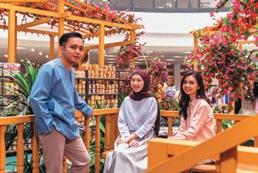
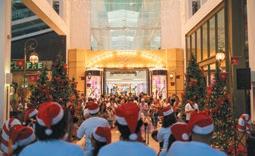
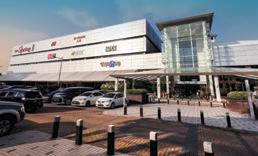
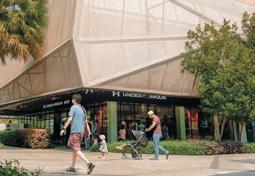
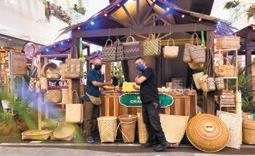
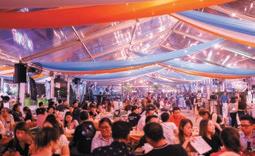
these malls collaborate with local community groups to organise engaging activities and initiatives like pop-up booths and health month campaigns, to enhance the overall shopping experience.
On top of the regular weekend markets, the malls also organise a host of seasonal bazaars throughout the year as an effort to encourage local entrepreneurs to showcase their products for sale at our booths.
To further enhance its efforts in customer engagement, sustainable practices and local connection, PE Holdings embraces digital transformation and employs target marketing initiatives.
The APRIL campaign (A Personal Retail Interactive Link) creates a virtual shopping experience, extending the malls’ reach beyond their physical locations.
• The Spring Kuching
When it opened in January 2008, The Spring was Kuching’s largest shopping mall, the multi-award-winning mall remains the city’s first lifestyle shopping mall.
Currently undergoing upgrades, the four-storey mall will feature an indoor kids’ playground and a new F&B wing, enhancing its appeal to families and food enthusiasts alike.
• The Spring Bintulu
Opened in December 2018, The Spring Bintulu was designed as a regional-format, international mall, with a beautiful sea-front facade next to the waterfront overlooking the South China Sea making it the first lifestyle mall in the city.
Laid out in a horizontal format with wide walkways, the two-storey mall offers 57 shop lots, providing a diverse shopping experience for visitors.
• Design Village Penang
The award-winning Design Village, opened in November 2016, is the greenest mall in Malaysia and the only outlet mall in the Northern Region.
Built on 24 acres of land in Batu Kawan, Penang, it has 175 stores housing a variety of exciting international and local brands, both premium and high street, from fashion, beauty, sports, home, restaurants, and lifestyle cafes.
The mall’s eco-friendly initiatives and diverse retail offerings make it a premier shopping destination in the region.
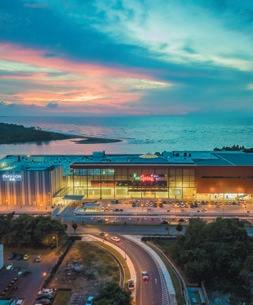
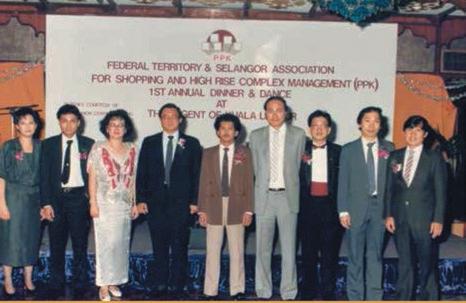
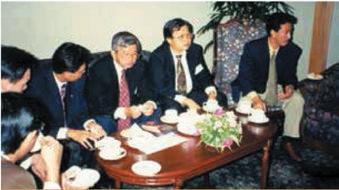
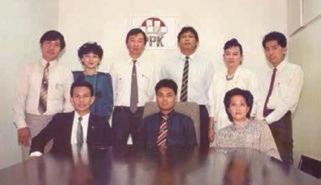
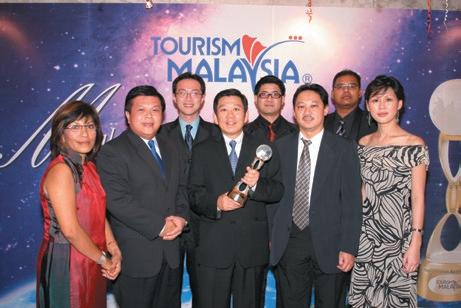
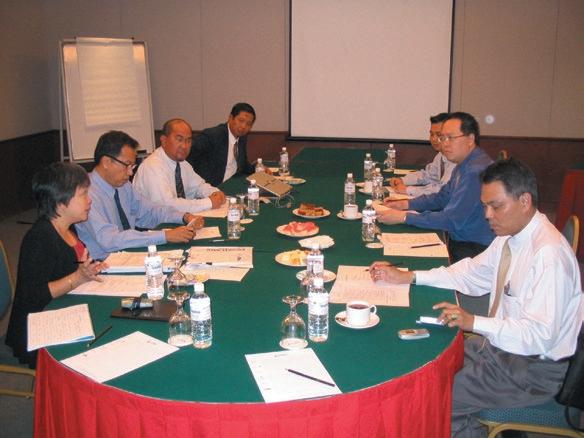
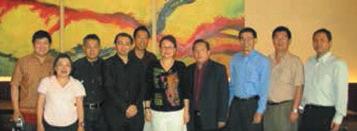

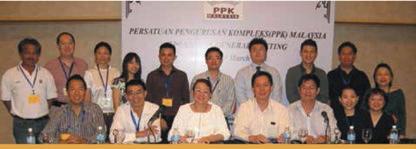
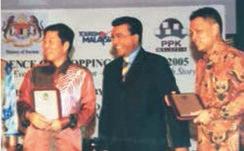
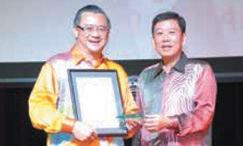
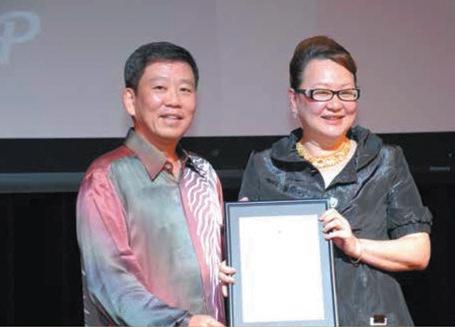
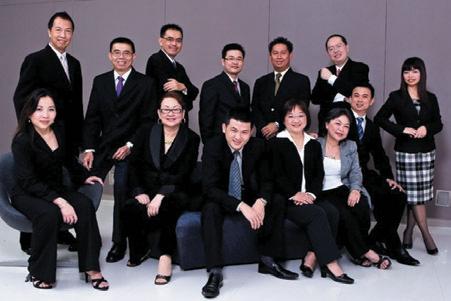
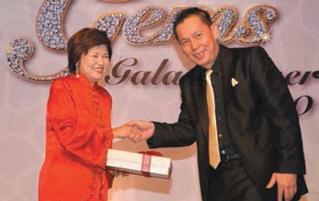
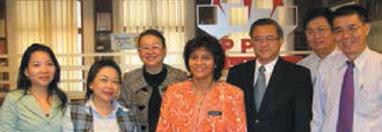
L
R:
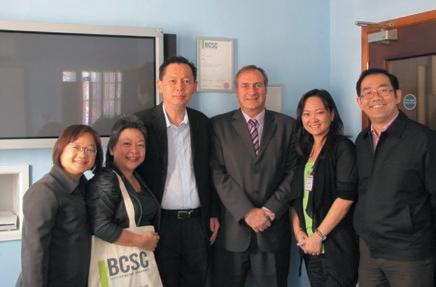
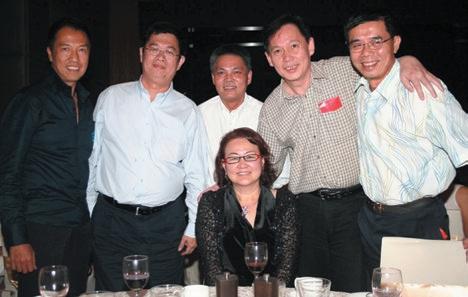
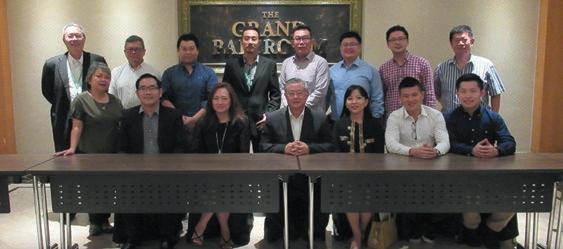
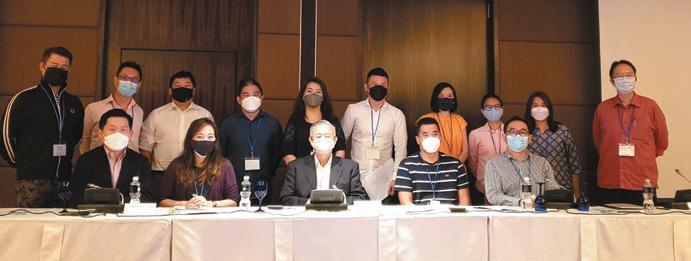
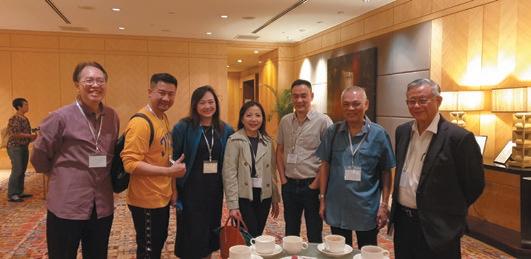
Tan Sri Teo Chiang Kok, PPKM President receiving his award for Outstanding Leadership During the Pandemic from Datuk Andrew Lim, MRA President, 2022
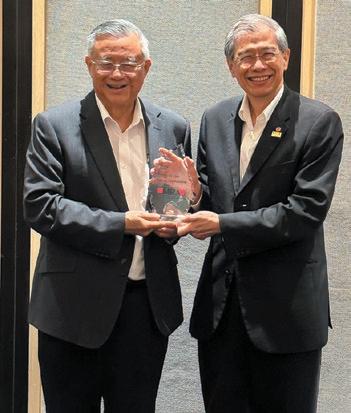
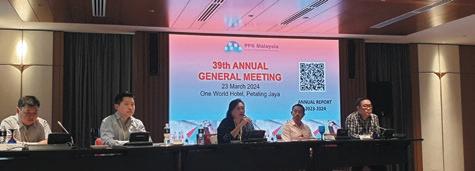
PPKM’s new Exco on board, 2024-2026
L to R: Joseph Yeoh, William Tan, Phang Sau Lian, YL Lum and Tan Joon Kai
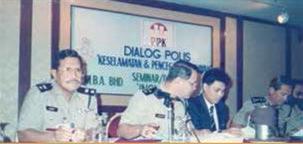
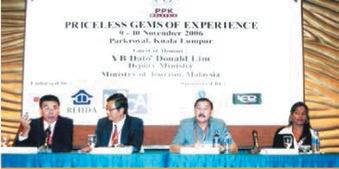
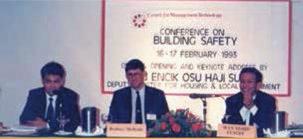
Conference on Building Safety 1993
L to R: Richard Chan, President; Rodney McBride, speaker and Wan Mohd Yusoff, Vice President
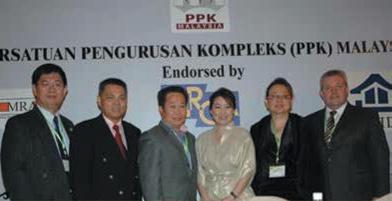
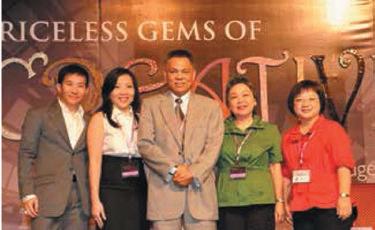
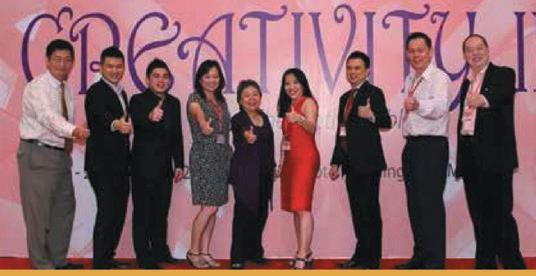
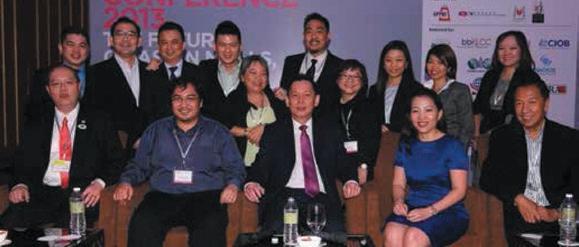
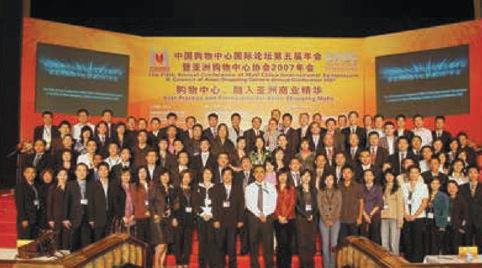
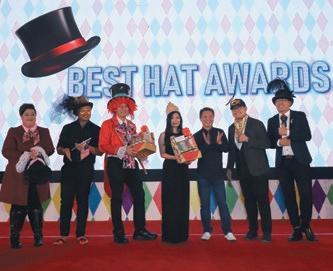
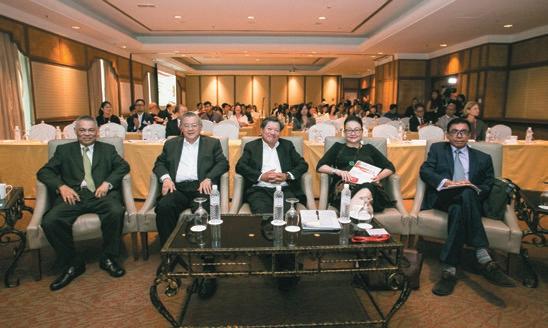
Breathing New Life Seminar, 2017
Tan Sri Eddy Chen, President (centre) with Advisors (L to R) Richard Chan, Tan Sri Teo Chiang Kok, Dato Joyce Yap and Kumar Tharmalingam
L to R: Phang Sau Lian with speakers at Reinventing Shopping Malls Conference, 2023; Baldwin Ko, Hong Kong; Alphonzus Widjaja, Indonesia and Tan Joon Kai
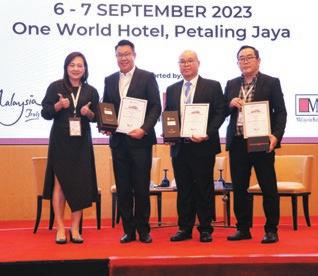
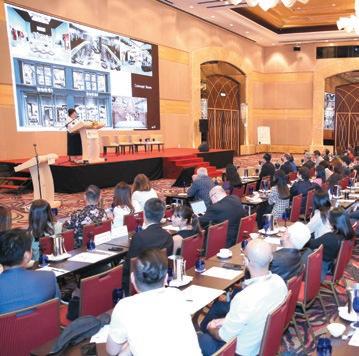

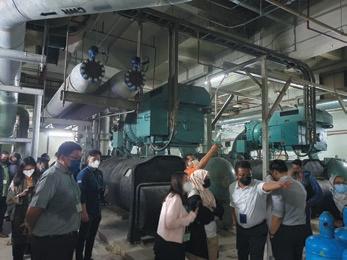
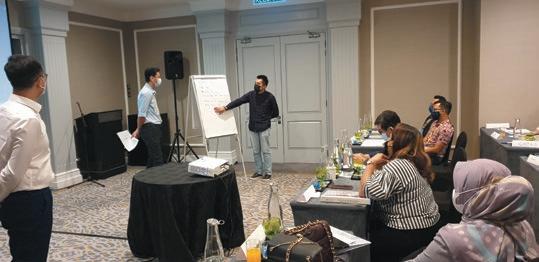
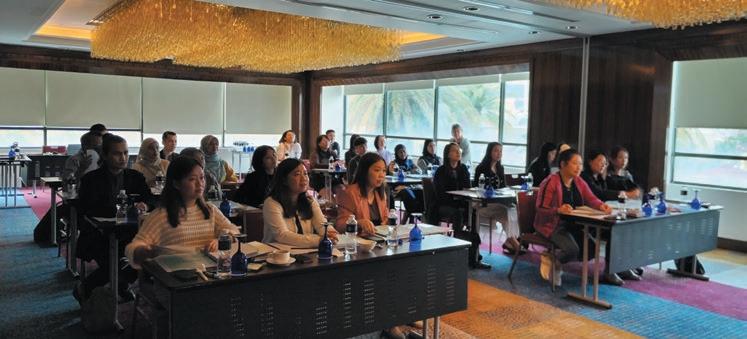
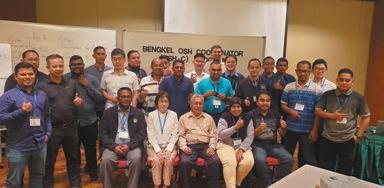
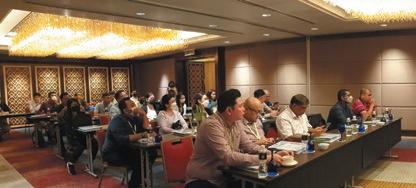
Safety & Security Training (Advanced), 2024
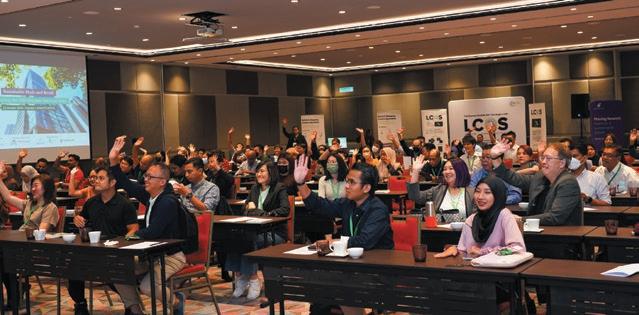

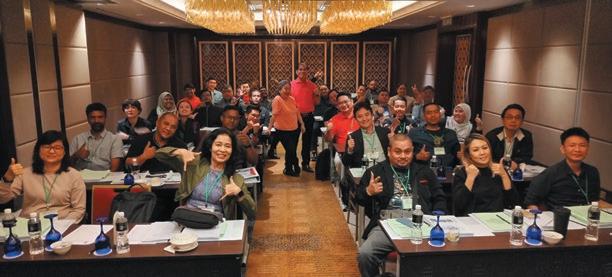
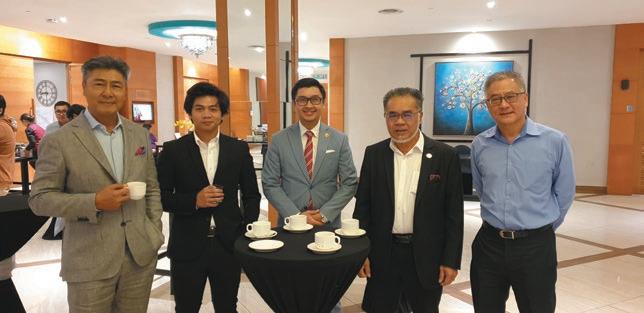
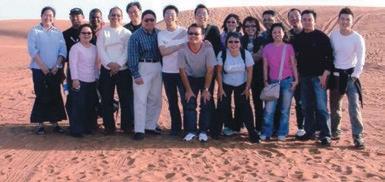
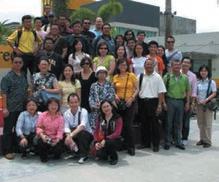
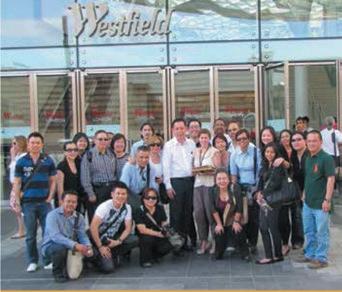
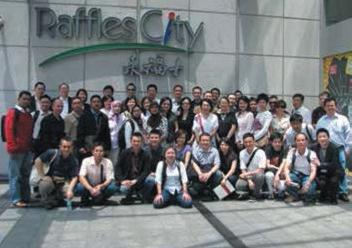
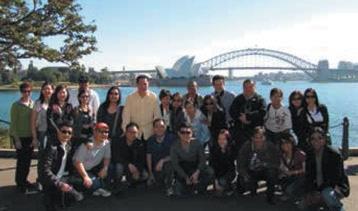
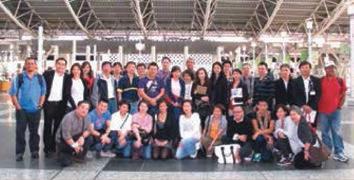
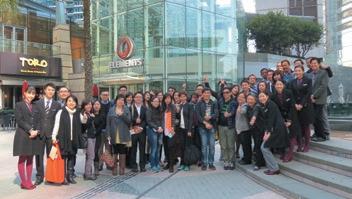



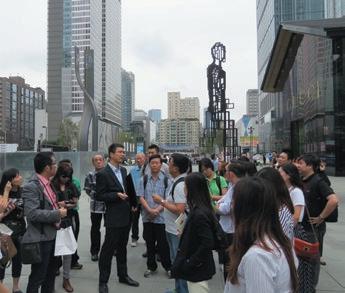
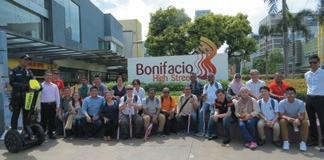
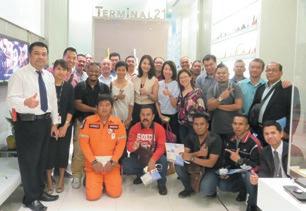
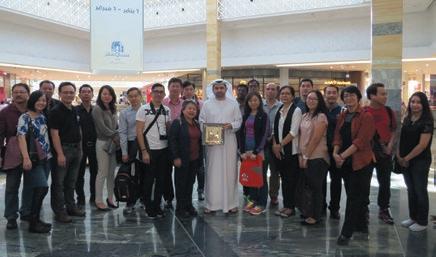
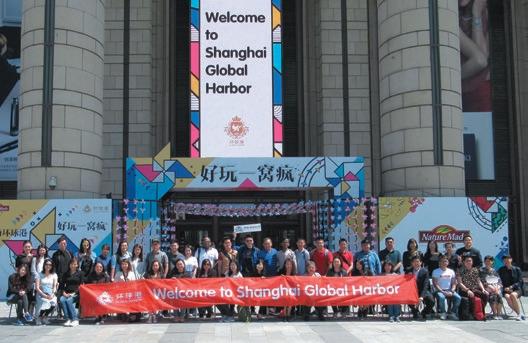
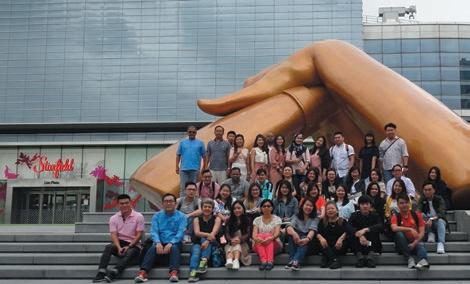
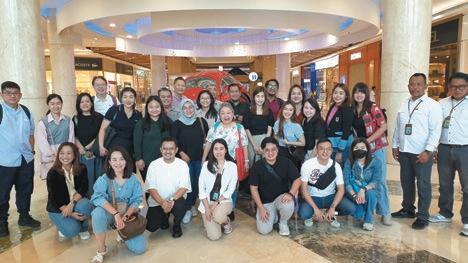
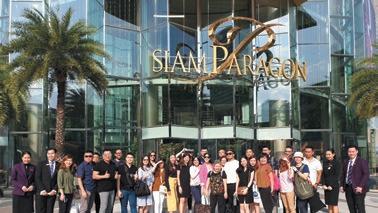
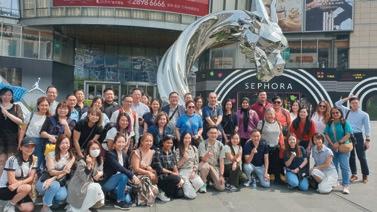
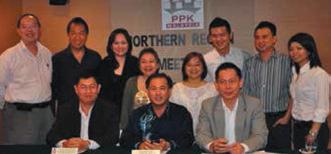
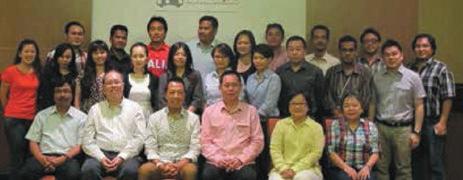
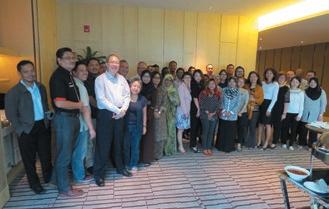
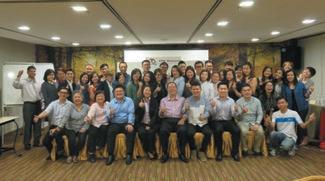
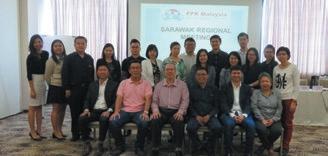
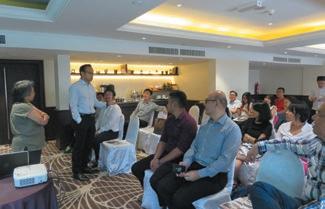
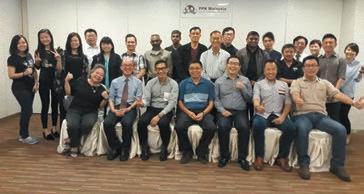
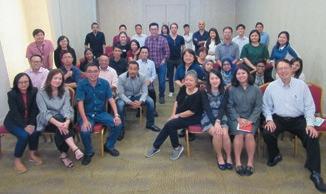
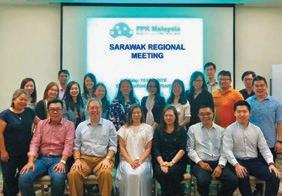
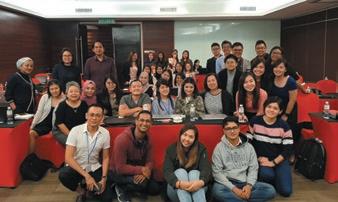
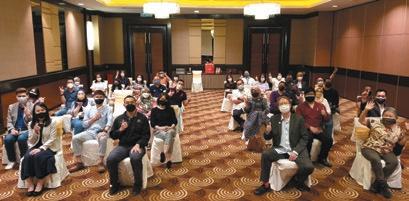
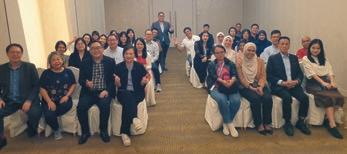
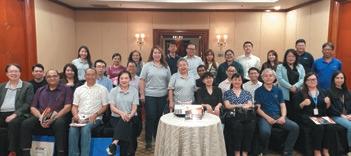
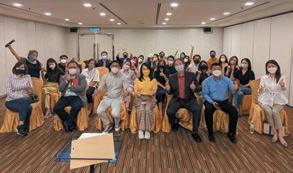
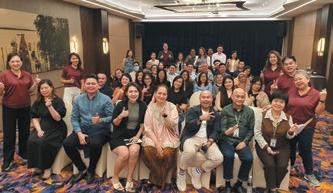
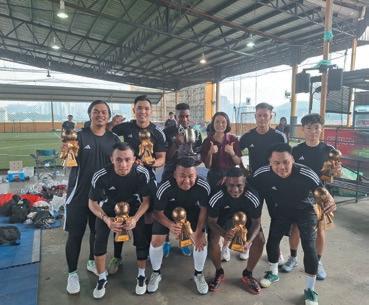
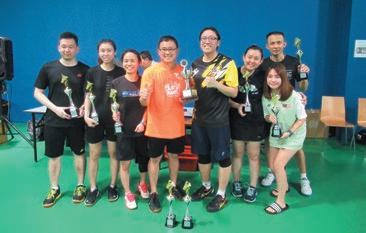
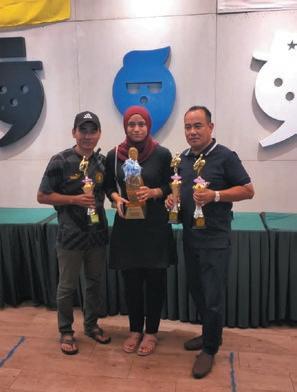
A very big THANK YOU to ALL of YOU who have supported and contributed to our book, helping us to commemorate the achievement of our

A608, 6th Floor, Block A, Lobby 2, No. 1 Jalan SS 20/27, Damasara Intan, 47400, Petaling Jaya, Selangor Darul Ehsan, Malaysia. Tel: 603 - 7727 6202, 7727 6232
Email: secretariat@ppkm.org.my Website: www.ppkm.org.my